#he is a very interesting character that is full of ambitions and contradictions
Text
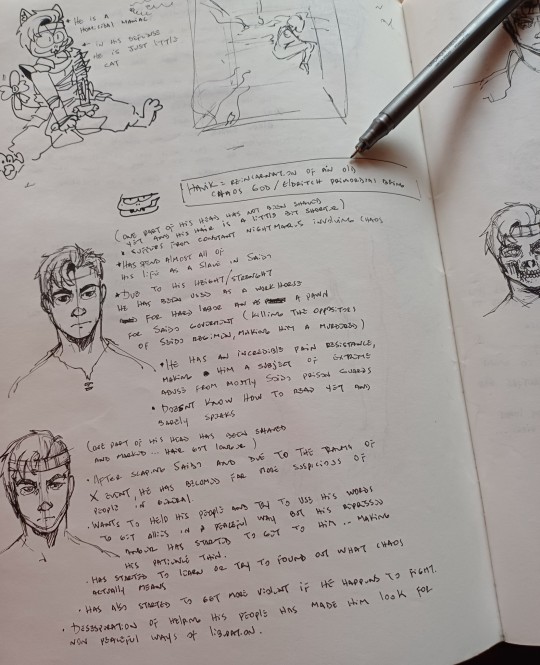
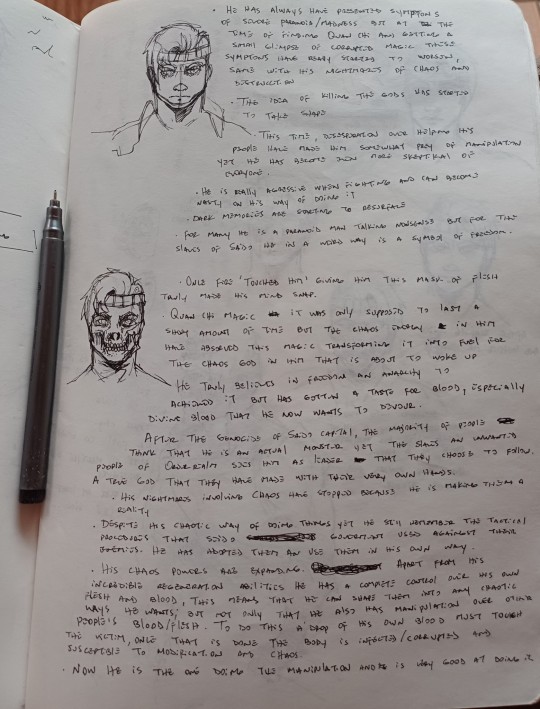
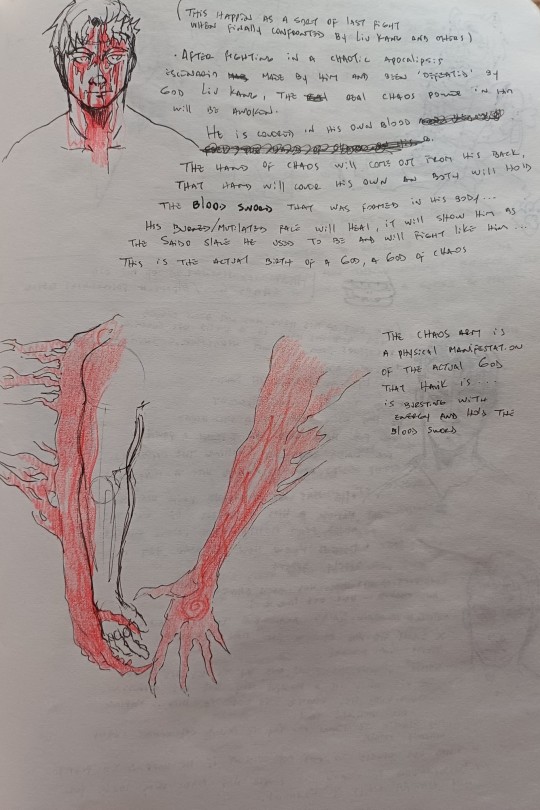

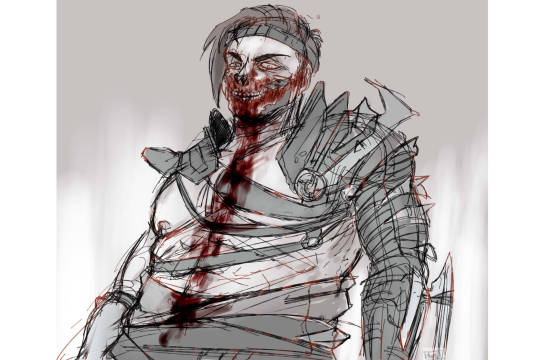
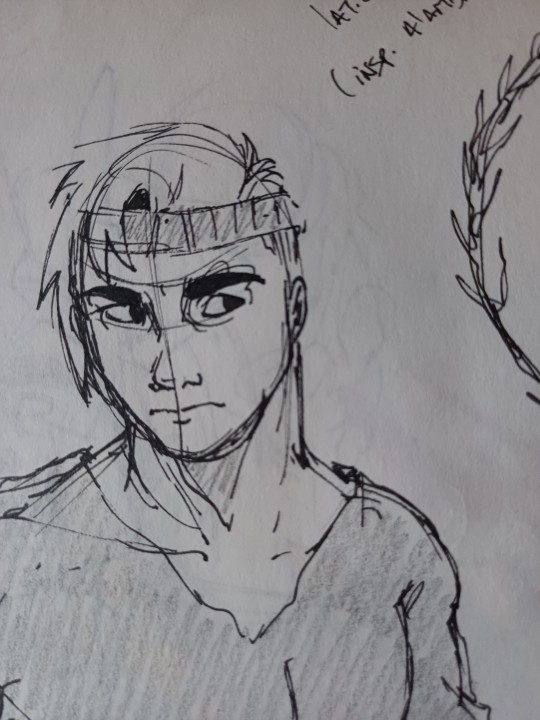
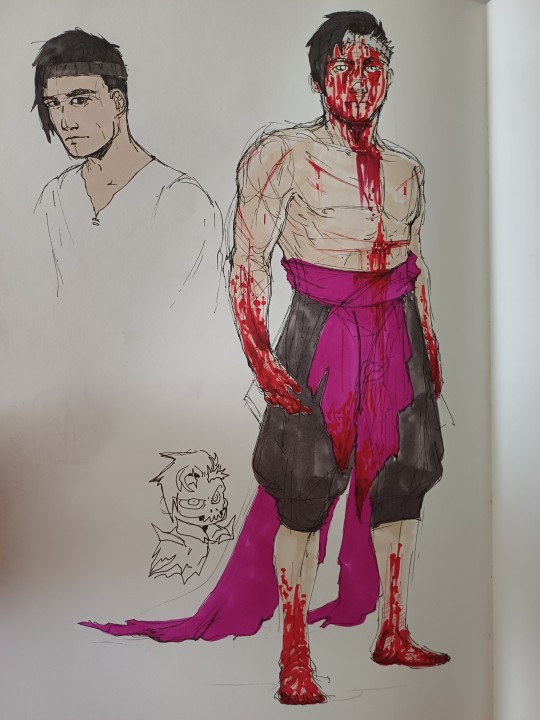
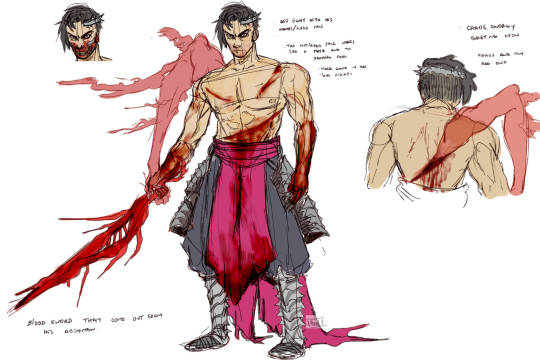
Ok so this are mostly a bunch of havik notes for a character arc that im preparing (using the crumbs that nrs has given) .
Is mostly about him going from an abused seidan slave to a figure of freedom ,and then to a sort of religious ultraviolent leader to finally becoming an actual god of chaos that pretty much cannot be killed bc well you need chaos for life ...
I know im in the hyperfixation zone when i start to write for the characters ...
#my art#doodles#sketch#mk1#mk1 2023#mortal kombat 1#mortal kombat fanart#mk1 havik#havik#dairou#artists on tumblr#he is a very interesting character that is full of ambitions and contradictions#and that makes him so interesting to explore#art#a cookie for whoever that managed to read my writing
31 notes
·
View notes
Text
Hello and welcome to my TED talk today I have decided to write a wall of text about why portraying Dio and Pucci’s relationship as manipulation is actually taking a lot out of Pucci’s agency and character, and diminishing him. Disclaimer that this is not shipping discourse, this is media analysis. I don’t want to talk about whether it is moral or not that they get along, I don’t care, I only want to comment on the media.
So someone sent me a DM telling me that Dio was manipulating an emotionally distraught and vulnerable Pucci into following his plan, and that he exploited him to do all sorts of crimes (framing Jolyne, killing people, stealing discs) by presenting himself as a trustworthy, God-like figure, and called the Heaven plan ‘Heaven’ to get Pucci to follow it by exploiting his religious beliefs.
First of all Dio met Pucci before he was distraught about his sister's situation. After the situation occurred, it is Pucci who seeked him for answers as to why he was alive and not his sibling/s, like he seeked answers from God a few years before by becoming a priest student. Dio left a door open, nothing more. Of course Dio was seeking to be admired, he was also seeking companionship as he has always done ever since he was young, and someone to carry his plan. Pucci was looking for answers, for self-growth, for someone to push him towards the top, towards what he believes is the destiny that was designed for him (the reason he’s alive and not his twin).
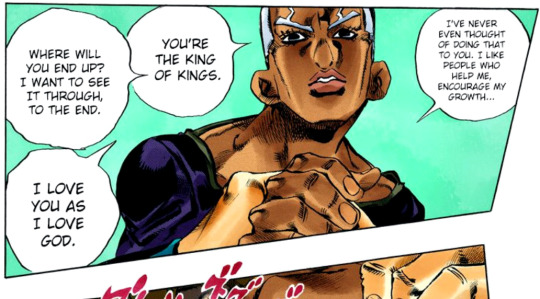
Is it forbidden to look for something in someone? Does it make it not genuine? No, we all look for something in a friendship. And this seemed like a fair deal for both. One needs a trusted friend, an ally, but not a blind follower, and as we’ll see later, he needs someone to help him transcend his human? vampire? condition again. The other one needs a reason to live, a quest to fulfill, and hope that he could one day obtain the ‘happiness’ and ‘peace of mind’ that Dio wants so much too. He’s also someone who strives for greatness, who wants to ‘step outside human boundaries’.

Not forgetting that Pucci is someone fueled by a profound curiosity and rationality, it is only natural that he’d side with someone who has the abilities and ambition Dio has. Framing Jolyne, killing people, stealing discs, it is all out of Pucci's agency, long after the death of Dio. He's actually the one who suggested he could store and use Survivor, and he’s the one who asked for it! Dio thought Survivor was useless, that it was only a weakness, and Pucci convinced him with the idea that it could be prove itself useful.


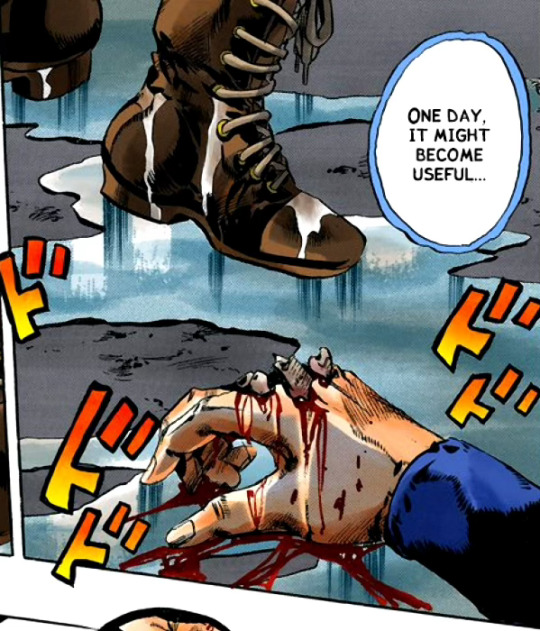
Pucci is shown to have ‘lost’ faith in Christianity very early on, maybe not really having true religious belief at all (as in, the actually believing there’s a God sense.) He got into priesthood for philosophical reasons (seeking answers to an existential question). He seems to be a very pragmatic christian with interests in science that contradicts some of the scripture’s theories.
I don't think calling the plan ‘Heaven’ was a bait based on Pucci's religious beliefs. Over Heaven isn't canon, but it shows Dio having a very Christian mother. He's an intelligent man, born in a very christian time and place, and thought ‘Heaven’ was the name of the kingdom promised to the legitimate ruler of the world, himself. If anything the first time they meet he makes it very clear they're not striving for anything Bible related but for realizing their full potential and finding happiness.
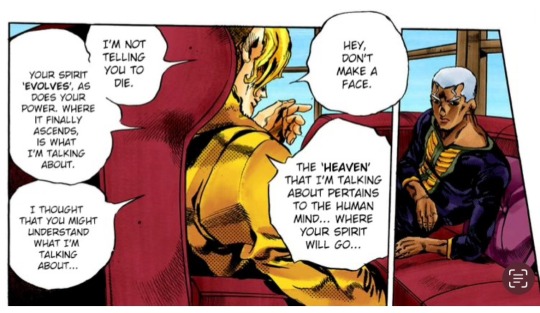
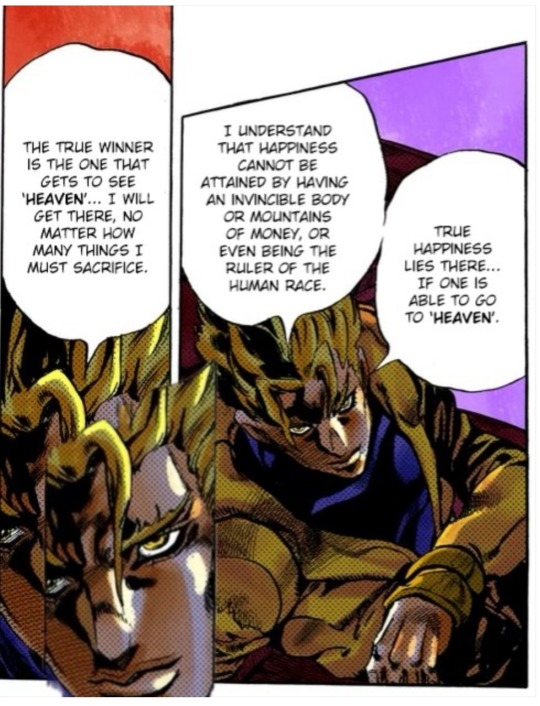
Dio saw very early on that Pucci was not a very faithful catholic, judging by the book he's reading when they meet in the ossuary, and then Pucci commiting crimes even before seeing Dio again (hiring someone to beat up his brother, leaving his brother as dead). He then commits blasphemy by calling him King of Kings and comparing his love to the one he has for God. Pucci does not think of Dio as the christian God, he loves him as he loves God, but he's not blind and misled. He refers to him with proximity terms all throughout the manga (even when he's young), never used honorifics like the henchmen do, calls him 'kimi' (casual/informal ‘you’), 'my close friend'.
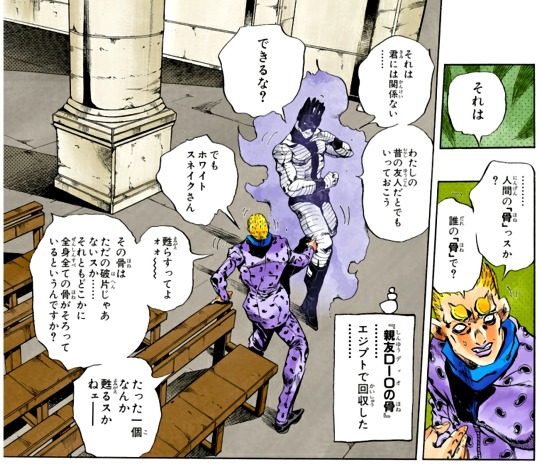

Even Dio uses ‘kimi’ instead of the ‘omae’ that shows inferiority that he uses with Vanilla for example. In the way they talk to/about each other, they're protrayed as equals, which once again is very unusual for Dio. All throughout their scenes Dio is shown slightly seductive at first, then not as overtly seducing as he usually is, he’s talking about the plan, and strategy (even though he still maintains physical contact, I mean, it’s still Dio), and then seems to relax progressively by doing activities and chit-chatting, to the point of Dio becoming paranoid that his weakness is known. Yes, Dio was pretty nice and not as big an asshole as usual because he needed someone for the plan, but what did he need? A "friend that he can trust from the bottom of his heart" (信頼できる友), so he tried to make one by not being an asshole, and guess what? He did! And he got scared that he managed to do so, because it's freaking Dio lol. Dio’s life has only been him trying to show dominance, and facing rejection. Heck he was rejected and degraded even when he won that chess game against an adult in the first minutes of the show. But everyone wants friends for a reason! Be it not to be alone, to be loved, to have someone to talk to about certain topics... And we all make efforts and try to be nice to make friends. That's not manipulation that's called not being a dysfunctional piece of shit like Dio usually was shown to be before he met Pucci. Why was he different with Pucci? I'm bringing up the parallel with the Jonathan and Dio scene which really shows that Dio hasn't changed and is acting the way he always has, testing people, he just has never been met with trust and acceptance, only with rejection, unlike what Pucci has done from their first meeting and after :
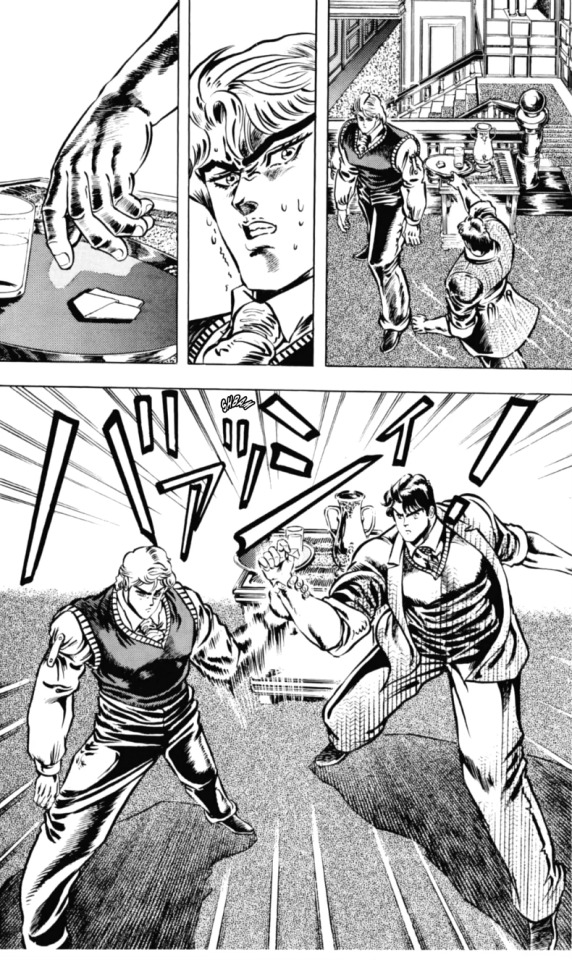
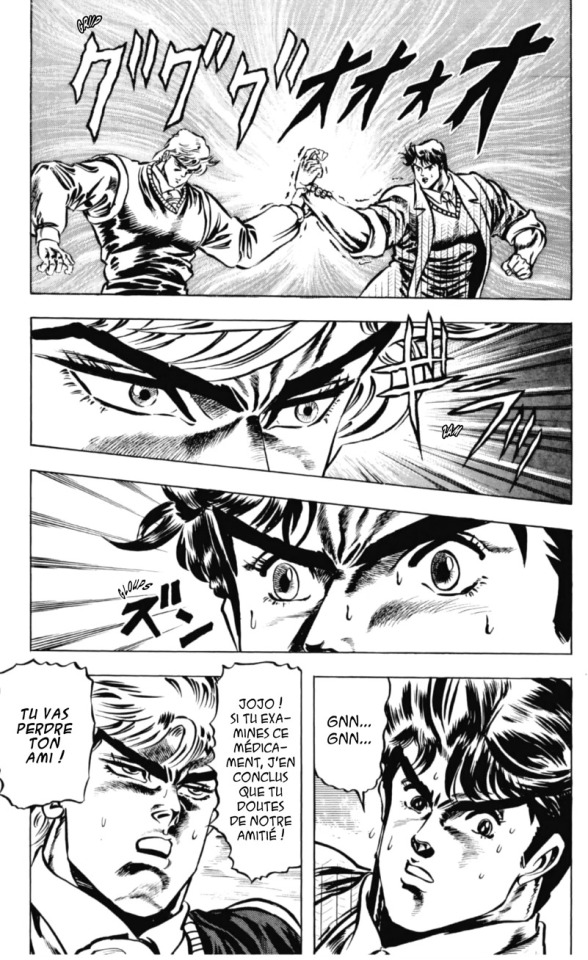
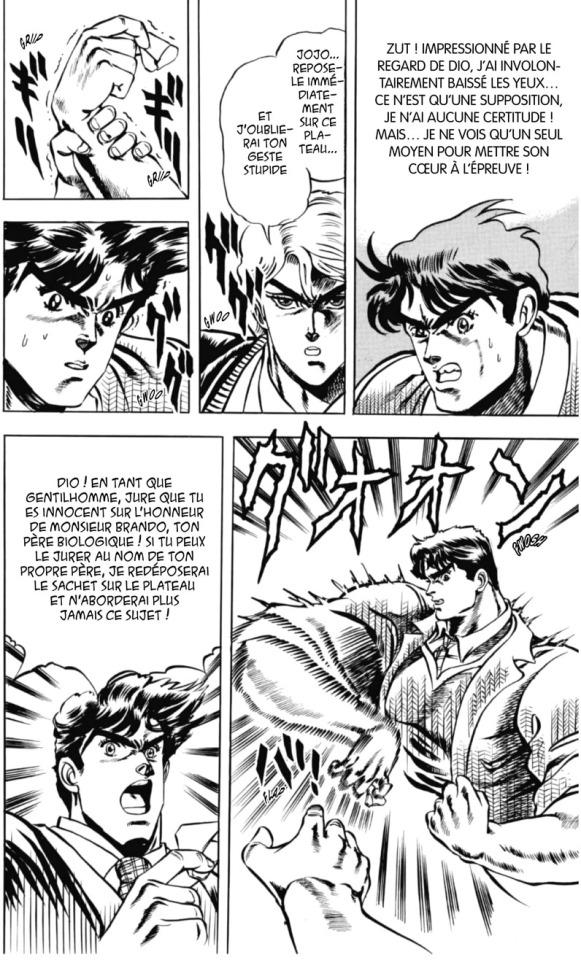
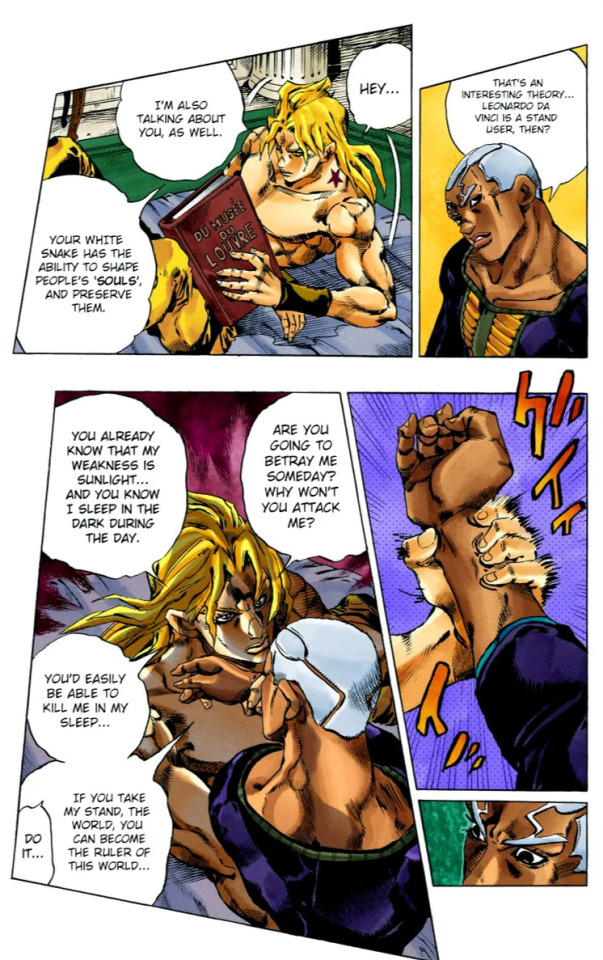
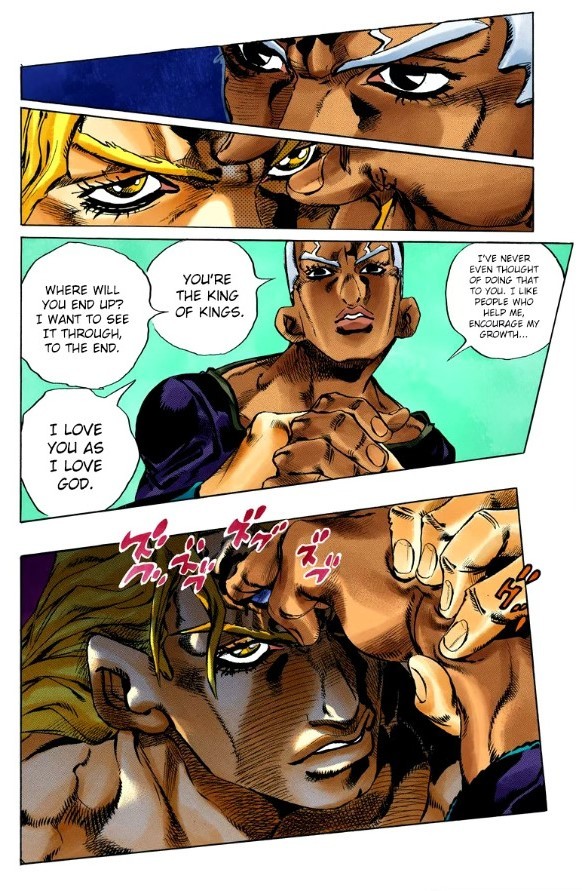
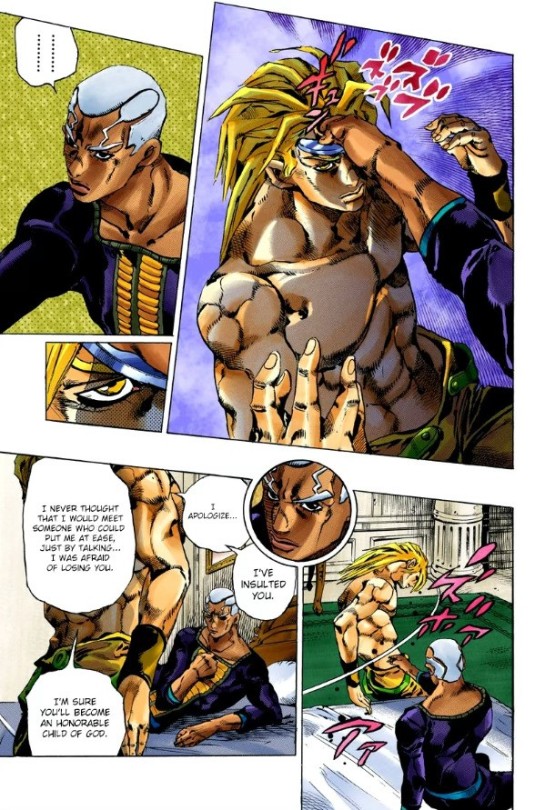
Scene plays out very similarly at first, except that this time Dio hasn’t done anything wrong, but he was expecting to be betrayed and wasn’t, which led him to get paranoid and set up Pucci so that he’d attack him, which he didn’t. And what did Dio do? Apologize and give him a part of what's literally the most important thing he has, 'his' body.
The fact that Pucci kept his 'sentimentality' towards his friend (I quote), his obsessive affection for Dio, and hope in his plan for such a long time is easily understandable, he had everything to win from Dio's plan (which is very different from nothing to lose, he has quite a lot to lose!). He could be cleansed from his sin, or at least put everyone on his level, be granted the reward of unconditional love, he could grow to a close to godly status or be a messiah carrying god's will (be special, push the boundaries of being human), and maybe, just maybe revive his loved ones too. He could rewrite his destiny at best, and at worst, obtain peace of mind. If anything helping Dio might even have been an excuse for Pucci to lie to himself about his real intentions with this plan (unconsciously : finally accomplishing his destiny of being special over his sibling and basically everyone else, consciously : giving everyone the chance to prepare for tragedy + opening everyone's eyes to the fact that what he did, cause his sister's death, was not really his fault since it was written by fate all along.)
Now if you really have a high esteem of Dio's intelligence you can argue that he did it all on purpose, he gave out his weakness on purpose to mellow Pucci, he called the plan Heaven to cater to Pucci's faith, he talked him into doing crimes, pretended to feel equal/inferior so that Pucci would give him his trust... But 1) Dio's not that good at it, has too big trust issues himself and has other means for submitting people to his will (as seen with Kakyoin, Polnareff...), 2) it's literally written this has to be built on trust which in my opinion completely disqualifies a manipulation aspect to it. Of course there are many other sources that further the idea that they were really friends, I'm thinking about how their relationship is described in interviews or the Jojo Mag, but I wanted this post to focus on canon interpretation.
Thank you for reading my essay, I’m always happy to chat and comment on the dynamics between characters in the material. I am not willing to talk about morality or shipping discourse here so please refrain from sending me such comments.
87 notes
·
View notes
Note
I found a... really bad take about how "Azula can't have abused Zuko because abuse is such a vague term!" It's the reblog that's pretty bad lol.
I think you've linked me the original post with a different reblog before, and in general wingsfreedom is a person to be avoided. "When did Azula try to control Zuko?" Indeed. Not like "all your life you've used fear to control people" is a climactic line in Azula's story.
Anyway, the reblogger does two things typical of abuse apologists. The first is to confuse the meaning of words. The next is to try and claim that abuse is too "harsh" a word. Of course abusers don't want you to be able to name the abuse. Also notice the contradiction of the word being both too vague yet too strong to use. The purpose of this kind of argument is to deliberately confuse the meaning of words to silence any argument. That's why these people are so afraid of the word abuse. Calling this fictional character abusive is double plus ungood because I say so!
Anyway, abuse as a word is certainly not vague. There are a couple of casual meanings of the word, but that's not what we mean here. The way we're using the word here, and the most common meaning, actually has a very specific definition involving being cruel to, using, or causing someone harm by taking advantage of a power dynamic, and often in a repeated pattern. As OP themselves said, abuse is about control, and a major theme in Azula's narrative is her need for controlling the people around her in the way her father controlled her, and how that led to her ultimate downfall.
Abuse also usually has to do with interpersonal relationships or breach of social etiquette. Claiming that all the characters are abusive because they are fighting in a war is nonsense, because fighting in a war comes with an understood social contract that both sides will try to harm each other. Nobody has an unfair advantage over anyone else because you don't expect your opponent in battle to not fight you. Now, certain things like torturing POWs ARE breaches of that contract, and are considered abuse. But fighting on the battlefield is not.
What Azula does to Zuko is abuse because she uses her position both as his sister and as her father's favorite child to manipulate him with the intention of causing him harm, whereas Zuko feels an obligation to listen to her both because she is his sister and because he's been conditioned his whole life to see her as superior to him. She absolutely tries to control him, and is able to at various points. She almost gets him to walk into her trap in the first episode they share together.
Also, reducing Azula's relationship to Ty Lee as "being dismissive of her feelings twice in the beach" ignores pretty much every other interaction they have, but I'm not going to list them all. I will say, though, that this take is ignoring that Azula and Ty Lee's whol dynamic in the show is built on Azula threatening harm to Ty Lee for trying to live her own life away from Azula. Ty Lee cannot say no to Azula and lives with the very real threat of what will happen if she does.
With Mai it's more subtle, because Mai is smart enough to realize that she'll be subjected to the same thing Ty Lee was. She doesn't try to say no, but then Azula decides to test her loyalty anyway by refusing the trade for her baby brother. Mai's not visibly frightened but you don't have to be for something to be abusive. The absence of Mai's ability to say no is enough. And we see what happens when Mai finally does say no when Zuko's life is on the line. We also saw how Azula treated Mai when they were children, because she didn't like that Mai had an interest in Zuko instead of all the attention being on Azula. Mai and Ty Lee are not allowed to be full human beings around Azula with their own lives and ambitions. It is laughable that anyone would try to claim Azula cares about Ty Lee's trauma in particular when her response to it is a sarcastic "here we go." I don't think this, in particular, gets talked about enough, how Azula loves Ty Lee when she's fawning after her and Mai when her hatred validates Azula's own, but has total disdain for them when it's not about her.
And no, there is no definition of abuse that says abusers can't change. They certainly can. It's extremely difficult, especially when the abuser benefits from abusing people and sees no need to change, and that's why you see a lot of literature that talks about how victims should not try to change the abuser or assume that they will. Because protecting yourself is more important. That's why it's not a victim's responsibility to change their abuser, but nobody said abusers can't change. The reason why Azula can't change is because she does not care and will not admit that she hurt others. Someone like that won't change because they don't see a need to, but people like that also know that they can use your desire to see them change against you. Abusers often promise to change, and some even may have true intentions of doing so, but true change is hard. And if it is a victim's responsibility to change their abuser, it also still allows the abuser access and control to the victim, which is the thing they need to continue being abusive. We see Azula do this when she realizes she took her cruelty a step too far with Ty Lee, for example. An abuser giving a half-assed apology because they realize they might lose the fawning adoration they crave from their victims is nothing new. And it is deeply disturbing that these people seem to genuinely not recognize, or want other people to not recognize, these things for the red flags they are.
23 notes
·
View notes
Note
can i just say, i find it very funny how a good majority of GW defenders’ counter arguments essentially boil down to “GW makes perfect sense actually you’re all just too DUMB to understand!!1!” hdhdhsjjf fe3h fans in general have such a superiority complex, it’s genuinely hilarious watching them ardently defend the world’s most mediocre dogshit writing💀
That's such a huge part of what makes them so infuriating lmao, they act like they're so smart just cuz they're willing to overlook blatant contradictions.
"Yeah, sure, the game exclusively wrote Shahid to be a murderous racist towards Claude and wrote exactly 0 positive connections between the two of them, but Claude killing Shahid in self-defense would totally make him completely willing to kill completely innocent people! How can GW detractors just not see that!!"
"Yeah, sure, Claude himself says that Edelgard 'might be hoping she can vanquish the Alliance and the Kingdom in one go and rebuild Fodlan from the ground up' and that Edelgard wants to 'bring the fight to the rest of Fodlan,' but it TOTALLY MAKES SENSE that him reading Edelgard's manifesto OFF-SCREEN and only mentioning this AFTER SHE LIED TO HIS FACE would make him 180 and make him believe that getting rid of the Church would make Edelgard stop her war! It just makes so much sense!!"
"Yeah, sure, in 3H Claude says that Edelgard's violence both ruins his ambitions and is something the people can't stand behind, but Claude was sus of the Church and Edelgard wanted to COMPLETELY DESTROY IT, which are totally the same thing and which totally explains why Claude just becomes Edelgard 2.0 in Hopes! YOU just never understood Claude's character and only wanted him to follow Dimitri around (unlike us, who totally don't just want him to follow Edelgard around)!!"
"Yeah, sure, Claude's ENTIRE GOALS revolve around bettering foreign relations, but it makes sense for him to worsen Faerghus/Fodlan's foreign relations with Sreng because the Church was doing that already! What's so hard to understand!!"
"Yeah, sure, the devs said they wrote Claude around the idea of him being more ambitious while simultaneously giving him no ambitions for after the war and 180'ing on what he wanted to do during the war, but isn't what he's doing so much more ~interesting~ and ~dark~? Hopes!Claude haters just wanted Claude to be a goody two shoes!"
It's all just incredibly condescending and pretentious as all hell. Because it can't POSSIBLY be the case that Claude - in a noncanonical spin-off game, with a different director from 3H's in charge of it - was just written badly and OOC. It can't POSSIBLY be the case that even when disconnected from his base 3H character, Hopes!Claude is chock-full of contradictions in his characterization between his Part 1 and Part 2 iterations. And it DEFINITELY can't POSSIBLY be meaningful in any way that damn near ALL of the people that insist that Hopes!Claude is either completely congruent with 3H!Claude or is what 3H!Claude SHOULD have been... all either prefer Edelgard or ship Edel///claude (the ship which can be overwhelmingly condensed down to "Claude doing whatever it is Edelgard wants without having any character of his own" and oh, would you look at what he does in Hopes, oh gee must be a coincidence that they all lap that shit up).
Nope, Claude fans who prefer Claude as their fave lord? Secretly never liked him! It's totally US who have a fanon version of Claude we like over the canon version, and definitely not the ones who like him doing shit and saying shit and believing shit that runs diametrically opposed to literally everything he stands for in 3H ("the Kingdom threw us to the wolves first 300 years ago" yeah THAT isn't fanon Claude, nope). Claude fans who don't wholeheartedly accept that Hopes!Claude is either who Claude was all along or is otherwise 100% in-line with his 3H counterpart never liked him at all.
And don't even bring up people who like Claude but prefer Dimitri lmao.
It's just this weird habit of fandom I'm seeing nowadays, where if you don't accept the writing as perfect and if you point out blatant inconsistencies then OBVIOUSLY you either were never a fan or you just "don't understand man." It can't ever be the writers at fault for writing something bad anymore, it's always the fans who are lacking something to be able to "appreciate" what's given to them. Just look at how any and everyone who criticizes Edelgard is automatically deemed a hater of her. There's a mutual of mine who literally buys merch of Edelgard, buys zines of Edelgard, and will readily have Edelgard in their Top 5 favorite 3H characters, and even they get accused of hating her just because they have the gall to... point out that Edelgard has very noticeable flaws, both as a character and in her writing.
That's basically what I'm seeing happen with Hopes!Claude. You criticize him? You're making discourse, you aren't a fan of him, you're a hypocrite in some way, you never understood him. His fans - much like Edelgard's, oh wow would you look at that hmm must be a complete coincidence again - make it so fuckin' hard to like him, even if you do genuinely like Hopes!Claude. If you like him as the bad guy he very clearly is because he is making very clearly villainous actions? Nope, you're not liking him the right way. If you like him in concept but feel his execution was lacking? Nope, you're not liking him the right way. Just like with Edelgard, you have to like Hopes!Claude in a very specific way or you will be called a hater of some kind. And that attitude just isn't conducive to a welcoming fandom environment
#ask#anon#clyde discourse#fire emblem warrior: three hopes spoilers#fire emblem warriors three hopes spoilers#Clyde defenders are just so DEFENSIVE it's unreal#they throw shit at anyone who dares criticize his garbage-tier writing#they get mad at people for pointing out it's mostly Edelgard fans who like Clyde fans#before literally turning around two seconds later and accusing every single Claude fans who dislikes Clyde of ACKCHUALLY preferring Dimitri#and ACKCHUALLY never liking Claude at all#the mere act of pointing out contradictions in Clyde's writing is itself discourse to these people#they pull up ThE dRaFtS as if they have anything to do with what was actually written in the actual game#because god forbid they just like a character with poor writing - that they can overlook the bad parts of the writing and appreciate them#despite that#because something with poor writing is impossible to like/love i guess
26 notes
·
View notes
Text
novel appreciation: 君有疾否/Jun You Ji Fou by 如似我闻
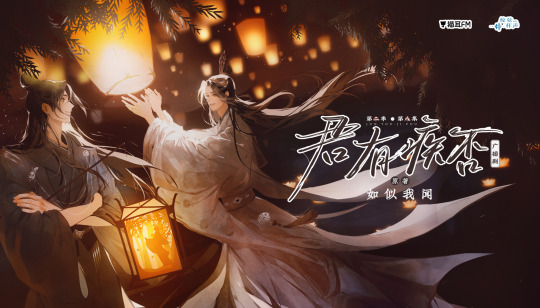
I don't talk about Jun You Ji Fou nearly often enough for how unreasonably obsessed with it I am. This post is LONG because it's like 1.5 years of pent-up fangirling finally being set free ...
Synopsis
In the (fictional) Xia dynasty, the Emperor is young and weak, so the government is controlled by two powerful rival officials in their late twenties: Grand Commandant Chu Mingyun (military leader) and Grand Secretary Su Shiyu (top scholar bureaucrat). Chu Mingyun claims to have fallen in love with Su Shiyu, using this excuse to openly and aggressively gather information about his rival. However, an unknown power emerges to raise chaos and starts murdering officials right in the Emperor's backyard. Chu Mingyun and Su Shiyu put their conflict on the back burner to investigate the new threat, and develop a new understanding and respect for each other.
Chinese raws are free on JJWXC.
Key Characters
Su Shiyu is the scholar-bureaucrat most trusted by the young Emperor, who sees him like an older brother. Shiyu is sophisticated like jade, gentle like a spring breeze, so polite and kind you almost forget he is an expert at using the hidden dagger tucked into his sleeves. This man is full of contradictions: a scholar bureaucrat from a family of famed generals, a gentle and privileged young lord with an inexplicable viciousness and desperate edge in battle, the most loyal official who is wields far more influence than his role legally allows. He takes the path his family, nation, and allies need him to walk, and when he falls in love with Chu Mingyun, he knows there won't be room on that path for the both of them.
Chu Mingyun made his name in the wars against the Xiongnu some years ago, and has become the only man currently capable of leading the nation's military. With this unique position, he is almost brazen about his ambitions for greater power, though he also have his own principles and beliefs. As a character, though, Chu Mingyun really is the special-est snowflake. He is a foodie with a sweet tooth. He is the great war hero. He flaunts his beauty. He calls his younger love interest gege. Su Shiyu once carried him like a bride while he was unconscious. Don't be mistaken, though, he is the gong.
Someone summarized their relationship arc as "Chu Mingyun won't let being enemies get in the way of them being in love, and Su Shiyu won't let being in love get in the way of them being enemies."
What I like about this novel
Gradual relationship development. As rivals, the main couple is initially spending time together mostly for work, and ... they have a lot to do for work. Their interactions in these subplots give them a deeper understanding of each other's personalities and values, and change their longstanding prejudices about one another.
Strong leads who are treated like equals. Chu Mingyun is the gong but answers to "Madam Su" because it makes him feel like family. Su Shiyu is strong enough to carry a Chu Mingyun like a bride. Politically and intellectually, they are capable of derailing the other person's objectives if they mean it. They are both complex, strong characters with interesting nuances in their personality and moral values.
Pining, even while in a relationship. The main couple starts a relationship without addressing their ideological differences. Su Shiyu thinks Chu Mingyun is just using him to gather intelligence. Chu Mingyun thinks being together means they will eventually arrive at political compromise somehow. They are in love and make a great couple, so much so that they pretend to be in denial about the fact their relationship in its current state is doomed to fail.
Themes of love and sacrifice. This novel features several couples that end with bitter heartbreak. Some are victims to malicious plots, others are powerless against forces like illness or changes in society. Love is a very small part of the characters' lives, but it's almost always the most memorable and beautiful part. The main couple is one version of this, but they are not the only ones asking what are they willing to sacrifice for love, and what it means when love itself is sacrificed in the endless battle to survive.
A supporting cast with interesting story arcs. There is the genuinely kind but wholly incompetent young Emperor. There are women who never got to shine or live the way they deserved in a patriarchal society on the brink of war. There are bright-eyed young people who were taken too soon, and veteran politicians who becomes disillusioned with the system that repeatedly disappoints them. Through their stories you understand the unstable state of their world, and why Su Shiyu and Chu Mingyun arrive at such different stances on how to fix it.
Things that made me go "meh" about the novel
The most common criticism against this novel is the weakness of its political plot. I think this story is held to a higher standard due to its popularity, and it's flaws are not egregious compared to most novels in the genre (e.g. top court officials are abnormally young and powerful, the villains are abnormally brittle, etc). The ending, however, feels a bit abrupt and rushed, to the point that it's almost OOC.
Another problem is the text tends to tease more details and nuance than a feel-good fluffy novel, but can't deliver on them like a serious plot-driven novel. The story opens with up with a murder, so the main characters go look for the victim's grandson, which leads them to a shady underground casino .... It's one action-packed mystery after another, that you barely have time to stop and realize the murders (and most of these traps and plots) are not very helpful to the villain's objective, and mostly functions as an excuse to make our main characters go on dates work together.
I'm also a bit disappointed by the development of the supporting characters. Qin Zhao, Chu Mingyun's shidi and right-hand man, is pretty much defined by 1) his loyalty to Chu Mingyun and 2) his crush on shidi Du Yue. Emperor Li Yanzhen is implied to have more depth than meets the eye, but not with enough detail to help us figure out what he really thinks. A few villains are downright cartoon-ish, and there's an abysmally high ratio of fridged women.
Finally, admittedly also genre-typical for historical political c-novels, there are some non-flattering stereotypes around neighboring nations and foreign tribes, and also favors militaristic and autocratic politics.
Overall
JunJi is a story with obvious strengths and weaknesses. While reading, I felt like I saw hints of a rich vision for a very complex world and story, but it was not effectively delivered in text, and we just ran out of time and momentum by the end. But still, I'm charmed enough by the potential of this story and this world.
Random Personal Ramblings [Unmarked Spoilers Ahead]
Morality kitchen sink. One thing "the story teases but do not deliver on" is the moral ambiguity of the main characters. Both of them operate private death squads. Chu Mingyun spends years plotting treason, allows the death of innocent people to that end, and is also a "corrupt official" who casually misappropriates tens of millions of taels of silver. Su Shiyu has conducted extra-judicial torture and espionage, and let's not get into the implications of the cover up in the Big Thing of Su Shiyu's backstory…. Both characters have very bloody hands for the sake of their "greater good", but in the end, the story seems to have forgotten about this, and finishes with the air of a grand heroic victory...
Su-gege fangirl hours: someone get him a journal and a therapist. Su Shiyu spent his youth hoping to become a great general like his ancestors, but after his traumatic experience in the war, his father (correctly) forbids him from continuing in the military. I feel like a lot of Shiyu's admiration for Chu Mingyun comes from seeing him in action as a fighter and general. Even in the present, Shiyu is eager to go into battle. One time he tries to substitute for an injured Chu Mingyun to lead an offensive, and in another he marches out in what is basically a suicide mission to defend the city. That is the kind of life -- and death -- that he never talks about but seems to really want.
"Good danmei dad" award nominee: Su Jue. He genuinely cares about his son's welfare, even if it means ending the family's military legacy and killing his son's childhood dreams. After that rough patch, Su Shiyu and his father have seem to have a good relationship. Also, let's not forget he probably committed several crimes to help cover up that Big Thing in Shiyu's backstory.
Chu Zhiqing (╥_╥). Chu-jiejie is awesome and deserved better and what happens to her really explains Chu Mingyun's rage.
Li Yanzhen's wooden statue. So, this guy is the Emperor, but the people trying to overthrow him have already taken over the palace and are looking for him. It's probably his last act before certain death, and he rushes to where he is keeping his WIP wooden statue, carves Su Shiyu's face on it, tells the statue "you are very beautiful," and sets it on fire along with some "ambiguous thoughts from his youth." ... It's only three paragraphs but it has left me with a lot of feelings ...
Su Shiyu's teenage rebellion phase. It's almost impossible to imagine with the current elegant and proper Su Shiyu, but by his own admission he had a phase when he got into fights frequently. His father made him wear white robes so he can't hide the marks from fighting and escape punishment. I once saw a fanart on Lofter of a young Su Shiyu crouching on a roof looking down curiously, and the artist captioned it "young Su-gege looking to start fights", and omg do I have a million regrets about not saving that pic T_T ... I never thought of the character the same way again. The chaos gremlin had to grow up :(
#danmei novels#danmei faves#danmei recs#my reading#jyjf#君有疾否#jun you ji fou#reading thoughts#historical danmei#political danmei#romance danmei
3 notes
·
View notes
Text

ALL RIGHT BUT YOU ASKED FOR IT
Power of Three as a series is just. full of weaknesses, most of which come down to poor continuity and structure. I'm not gonna try and fix ALL of those, bc that'd be laborious as hell, but I will pick out things that I feel are the most egregious as case studies.
What Po3 does have, tho, is an absolutely shining strength in the concept of its three main characters. After twelve books of Blandly Heroic Protagonist Syndrome, Jayfeather is an absolute godsend. He's angry! He's rude! He's unhappy! He's not nice. I Love Him And He's My Son. Lionblaze has his invincible pride (hah) and emergent bloodlust, and Hollyleaf has her moral absolutism and certainty. These are good starting points for characters. Sadly, the lack of continuity undermines what could have been three really good character arcs.
So! I present to you:
HOW TO MAKE "WARRIORS: THE POWER OF THREE" NOT COMPLETELY SUCK ACCORDING TO MY PERSONAL TASTE; A NON-EXHAUSTIVE, NON-CONSECUTIVE LIST BY ME
ONE
- Have there be a persistant, overarching series threat. Sol is a character with amazing villain potential who does literally nothing except hang around, and do exactly 2 Bad Things completely off-screen. This Is Not Good.
- Instead, have him be present from the second book onwards- initially introduced as a friendly but enigmatic outsider who is slowly revealed across the series to be a complete black hole of a personality, a social parasite quietly rearranging whatever community he's a part of to just-so-happen to benefit him as much as humanly possible. His "preach individualism not starclan" methods are not so much values as one strategy out of many. (to those who know me- yes i have a type. no i will not apologise.)
- Maybe his ultimate goal is to dissolve and centralise the clans or something so that he can live out his life as a political puppetmaster in all the cat-luxury he likes. idk it's hard to imagine overall stakes for this rewrite BECAUSE THE ORIGINAL DOESN'T HAVE ANY
TWO
- For gods sake you don't have a series based on the premise of "the main characters develop super powers" and then only have the second power confirmed by the end of the fourth book. I understand the first book mostly focusing on Jayfeather- his powers are obvious from the start, he's got the strongest personality of the three, he gets access to most of the prophecy plot stuff because of them. But you NEED to have the other two show an interest in something concrete happening to them beyond that, and you need to at least hint towards the other two having something unique to them even if nobody clocks it yet.
- Have Jayfeather tell his siblings about the prophecy by the end of book two at the latest. The amount of time he spends noodling around not sharing it with them is inexcusable. It's not that it's out of character for him to hang onto a secret for a bit, it's just that there's no point and it slows everything down. It would be equally in character for him to go to his siblings and be like "look, i'm SPECIAL. well you as well but ALSO ME". Boy starts off as desperate for recognition, what can I say
THREE
- Have Jayfeather discover that StarClan don't withhold signs or information on purpose for the sake of "building courage and faith" or whatever nonsense. Seeing and communicating the future is metaphysically very difficult, so interpreting signs and messages is a genuine skill, or even an art. The cats of StarClan, however, really are just ghosts, much more similar to living cats than the currently living believe. This is the impotus for Jayfeather's discarding of his reverence for StarClan, which remains consistent throughout the series.
- Have Hollyleaf and Jayfeather both still change their cat careers in the first book, but put place more attention on the fact that they basically switched jobs. Have a scene where they end up yelling at each other, because can't the other see how lucky they have it? The tension breaks when they realise they've both lost something important to them- Jayfeather his chance to prove he's as capable as a sighted cat, and Hollyleaf her path to helping her clan in the way she thinks is best. They commiserate together, and reluctantly promise to do the best they can with their lots, so they don't waste the path the other wishes they'd taken. This closeness is eroded over the series as they disagree more and more on the subject of StarClan and its role in their moral choices and obligations.
FOUR
- Speaking of Hollyleaf! I nearly threw my phone across the room when the first Omen of the Stars book claimed that Hollyleaf "worked so hard to discover her power to help her clan". Where, Ms Erins??? I would have LOVED to have seen that!! Hollyleaf expresses absolutely no concern over the details of what power she has/will develop, and only has a couple of scenes even touching on her ambitions to help her clan. She has some vague ideas about becoming leader and like one scene where she gets to do some leadery things, but that never gets followed up on. What does happen is that the whole "warrior code" thing becomes more and more a part of her personality (for no clear reason) until she snaps.
- Hollyleaf going off the deep end is something I wanted so badly to get into and be moved by, because I could see where it comes from! Her moral certainty is fascinating, especially since it's based in something as abstract as the warrior code- which, when you think about it, isn't really... anything. There's no concrete set of rules that make it up, no traditional wording or cat philosophers, not even any fables. It's a handful of agreed-upon, common sense rules- don't cross boundaries, don't take prey that isn't yours, respect your ancestors, and don't murder. That's it!
- So, combining the above points, I think Hollyleaf not being one of the Three should stay, but both the audience and the characters are given good reason to believe she is. By around the third volume, make it so that Hollyleaf has found that her power is to get cats to "Do The Right Thing"- i.e. what she wants them to do. She sneaks off often to see Sol, who teachs her how to use this power. Her siblings are concerned about this new power, having already gotten a glimpse at what Sol can do, but she's confident that she can only use this power for good. Volume-specific plot happens, Sol manipulates her into causing him to win, she is shocked and horrified, and vows to stick ridgedly to what she knows is right i.e. The Warrior Code
- However, the more fervently she tries to stick to this abstract idea, the less it gives her results, the more her power seems to be failing. Believing that StarClan is taking her power away from her, she becomes caught up in a faith-guilt spiral that puts her in the position to snap at the end of the series. By that point it's clear to her siblings that Hollyleaf has no power- she was just very, very good at persuading people to do what she wanted.
FIVE
- Lionblaze is a girl now because I Said So. This Cat Is Trans And There's Nothing You Can Do About It.
- Her relationship with Heathertail stays the same- childhood sweethearts who are torn apart as they begin to understand the nature of the societal divides that exist between them.
- This can be used to contextualise the whole "half clan/outsider blood" thing as a cultural contradiction. In reality, inter- and outer- clan relationships aren't at all rare. They can't be, otherwise the whole society would be inbred out of existence in like five generations. But if at least one society of humans can spend a good 200 years pretending Sex Is Bad And Sinful Actually then cats can have persistant cat-racism in the face of all logic. Heathertail clocks this contradiction, Lionblaze doesn't.
- Her relationship-to-power arc doesn't need changing all that much either, other than starting much sooner and being more consistent. At first, she's completely overjoyed by her power, since unlike her siblings, it lines up so well with her ambition- become the finest warrior any of the clans have to offer. As the berserker rage aspect becomes more prevelent, she becomes more and more disturbed by the fact that she isn't disturbed by what she can do, and that she doesn't want the escalation of her power to stop.
- Tigerstar still does his thing, but Brambleclaw knows about it. He recognises the signs from when his father used to visit him, and tries to train Lionblaze in his own way. She ends up caught between wanting to be a good warrior, and testing the limits of her power.
SIX
- Jayfeather can stay basically the same because he's my perfect little angy boy and nothing needs to change. His arcs can be strengthened by having a more robust relationship with Yellowfang where they try to out-bitch each other, and coming to terms with his internalised ablism. Maybe he has a chat with Mothwing about faith a couple of times. Him furiously lashing out at being offered help transitions into an acceptence and understanding of his abilities more naturally. He never stops being A Grumpy Old Man.
- All fucking past-lives unexplained time travel goes in the BIN. Doesn't fucking happen. You can have that lore dump sprinkled across the books, or come from going deep into the tunnels and having a surreal meeting. Make it properly eldritch-level scary, shake Jayfeather's confidence in the idea of them being just a bunch of ghosts.
SEVEN
- Have the way Brambleclaw and Squirrelflight present very clearly as parents to the Three be explicitly, textually unusual. One of the things I liked so much about the first series was an almost total lack of emphasis on who was mated with who, and who was related or not. It felt very real to how feral cat colonies form, where raising kittens is a communal job. This gets completely dropped the moment series 2 starts and now the cats have monogamy.
- This emphasis on the family unit and fostering close relationships between parents and kittens is deliberate on the part of both Leafpool and Squirrelflight. Their aim is to cover for Leafpool so she doesn't lose her role as medicine cat- something she already gave up Crowfeather for before she was pregnant.
- In that little bit of backstory, have a robust reason for both Leafpool and Squirrelflight to leave the camp while Leafpool is pregnant and giving birth, possibly one that ties into the present day story in some minor way. I don't know how, it would just make that element of the story a lot more ground than "we left, the kits were born, then we came back and everyone was cool with it"
- When it comes to the "I am Not your mother" reveal, Jayfeather and Lionblaze are confused and hurt that they were lied to, but come to the reasonable conclusion that well, since they were raised mostly by Squirrelflight, saw Leafpool often, and are loved by both, they don't hate her. Lionblaze has something of a crisis over being half-clan, possibly initiating an attempted reunion with Heathertail. Jayfeather is more concerned with how other cats will think it makes him lesser, something he's still sensitive too.
- Hollyleaf, meanwhile, completely fucking snaps at the way her mother Violated Part Of The Code. It's a completely irrational reaction, but expected because she's been growing more and more reliant on The Code for the whole series, and less and less stable in her attempts to aid her clan and train to be its new leader.
- Squirrelflight is the one to murder Ashfur. This is easy to work out while reading- she's literally the only one of the four with a motive who isn't a perspective character. The mystery is less around finding out who did it, and more about why she did it (it's very ambiguous as to whether it was an accident or not). The main tension comes from who finds out when.
- Lionblaze is shocked, awed by how far she'd go to protect the three of them, and reassures her she did the right thing (as a way to salve her own uncertainty over her own longing for violence). Jayfeather makes it all about himself because he's Jayfeather- upset that he didn't know immediately, instead of, you know, figuring it out in a few hours because he can basically read minds. They try their best to hide it from Hollyleaf, who is already rattling around the final volume as a full-on antagonist, but are unsuccessful. This almost costs them something incredibly important- possibly Squirrelflight's life.
EIGHT
- the whole plot with the Tribe Of Rushing Water is a MASSIVE can of worms that could be removed from the series without issue. As it is:
- Characterize the Tribe as uncertain of how to fight other cats, because yes, they haven't had to do this before. DON'T characterise them as pathetic, doing whatever their leader says without thinking, and with ancestors who have Given Up
- Have some of the Tribe be really good at the violence. Worryingly good. Have others be sickened by what they're being asked to do.
- Have some of the clan cats reflect on what they've done. Hollyleaf would be all for introducing this society to jesus The Code, but even she might be horrified at being thanked by a tribe cat who can't wait to get out there and win themselves glory, only to be killed a few hours later
- The Tribe begin a new tradition of marking the walls in the mud they use as camoflage in order to commemorate their battles, and memorialise the fallen. One of the characters reflects on the fact that in a generation or two, the Tribe will feel like it's always been this way. How many of their own traditions- those that feel almost like natural law- started out the same way?
- Have Sol as the leader of the invaders, or maybe having insinuated himself into the tribe as a "mediator" and doing his charismatic cult leader thing.
NINE
- Cinderheart isn't a reincarnation of Cinderpelt. She's just named after her bc Cinderpelt saved her mother from a badger. this is because I think the reincanation thing is stupid and I can't think of a way to make it good.
TEN
- No more using tails as hand gestures like covering people's mouths. Never. None of it. It's expunged from existence.
Disclaimer: I haven't read Omen of the Stars yet, so I can't account for anything that might happen in that series that's grounded in Po3. I'm like... two thirds of the way through the first volume. I'm Not Impressed.
73 notes
·
View notes
Text
my trsb fic has so many notes to the text that they didn’t fit within the ao3 notes’ section character limit lmao, so here is the lengthier version of it. you can consider it a teaser I guess? but either way, I need some place to store these and link them back in the fic.
contents here, cut for length
on the matter of the mother of Gil-Galad
Celebrimbor’s names
shibbolething all over Thauron’s name
actual quotes and canon
On the matter of the mother of Gil-Galad
Meril-i-Turinqi is a Book of Lost Tales character, lady of Tol Eressea, kin of In(g)we but also similar to the Solosimpi, which is to say the Teleri.
The character of "Meril" on the other hand, is a proto-Amarie, Finrod's love interest. In the early draft of Meril's appearance, Finrod is married and is father of Gil-Galad: this draft is obviously discarded and Finrod becomes childless, while Meril transforms into Amarie, who does not join the exile. Gil-Galad is instead transferred to Orodreth, which iirc is Tolkien's last word on the matter (I don't count the Fingon thing as even canon-adjacent, ChrisT was quite clear in admitting the mistake). Now I recall Orodreth is said to be married to a Sinda; why did I discard that? Cause I initally forgot it. Rip to me and Orodreth.
However, what I had was: a proto-Amarie, who is a Vanya, and a BoLT character who is of the family of Ingwe (so a Vanya), but also like the Teleri (so of the third clan, even though not a Sinda). And so Meril-proto-Amarie became Meril-i-Turinqi, wife of Orodreth.
The full headcanon on Meril here would have her as daughter of a Vanya who is kin of Ingwe and of Telerin nobility (or royalty? they're all big on intermarrying between royal families), which fulfills both sides of the coin and also stays true to the statement that Elenwe is the sole full-Vanya to join the exile (I'm gonna assume this excludes any non-royalty followers). Now regarding the parentage of Orodreth, he is here son of Angrod, as I feel that is a better option in almost all respects. This poses some issues with regard to age, as I recall Orodreth-son-of-Angrod and Idril as being named the only two non-adults to do the journey to ME (again... this surely excludes any non-royalty youngsters, but nonetheless). Obviously these issues grow even further if one also includes the matter of Celebrimbor being Aman-born to a wife who doesn't follow Curufin (and therefore the matter of his age at the time of exile), but reconciling these versions is borderline impossible with how the origins of Celebrimbor keep changing throughout the conception of the legendarium.
Long story short, I up the age of Orodreth to be at least old enough to speak softly with Finarfin (here his grandfather) during the flight of the Noldor, but I have him already married though childless. Finduilas is born early into the exile and Gil-Galad is her younger brother.
Meril returns to Aman at the end of the First Age and rules Tol Eressea for the exiles who are stuck there until the Ban is fully lifted.
Celebrimbor's names
FN = father-name, MN = mother-name
I do not claim to have come up with "Tyelperinquar is an epesse", that headcanon, which nonetheless I'm sure happened separately for other people, is one I first read in a fic by Tyelperintal on AO3. That of course means that I could no longer go with the FN Curufinwe MN Tyelperinquar option, and needed another mother-name, which I also borrowed from the same story, and went for Ilvanon, "the perfect". It's pretty, and also speaks of a mix of high expectations and love.
What in this story made me accept the epesse headcanon is the matter of the origin of "T(y)elperinquar" as a name. Vinyar Tengwar (and most recently also NoME) explains how "silver fist" is a name common among the Teleri, famous for their ability to smith silver even among the Noldor, and it is also mentioned how other similar names, such as Tegilbor "calligrapher", are given to people based on their skill. This, however, directly contradicts the fact that elves don't give the same name to more than one person. That statement is problematic in itself (impossible that all elves across all time are aware of all names that ever have been used -- and also of course there's the usual royalty exceptions, that however may well be exceptions because they are royalty), but if it is a common name among the Teleri and we are to keep the duplicate names lore in mind... my only solution is that it's a coveted epesse, given to the very skilled.
Celebrimbor picks it as his chosen and preferred name over FN, already shared by two people and preferred as chosen name by his father, and the potential arrogance of picking his MN with its meaning.
This still led me to problems of both spelling and language choices.
As far as spelling goes, there's several variations. I'm marking with * the one that is not canonically attested, but can be inferred.
Pure Telerin: Telperimpar
Quenya-Telerin compound that maintains the Telerin spelling of silver: Telperinquar
As above, but shortened: Telpinquar
Pure Quenya: *Tyelperinquar
Pure Quenya, shortened: Tyelpinquar
I use all these except the last one at various stages: I decided (though I go back and forth on this) that his household might have used pure Quenya, and his mother sticks to it; the person in Tirion panicks and uses the shortened version Telpinquar, which together with Telperinquar (Telerin spelling maintained) was more common among the Noldor. The Tirion passage exemplifies the uses and applications of these names, how they were given and altered.
This leads me to problems of language and POV, Celebrimbor vs Tyelperinquar. His mother, in her POV, always uses the latter, but Celebrimbor himself uses the former. The true problem here was adapting my feeling that Celebrimbor would be far more used to thinking of himself as Celebrimbor (as opposed to the Quenya name) vs Tolkien's statement that elves do not use names in another language when speaking in X language. This doesn't stay wholly true through the legendarium and the texts, so it's something I've decided to partially ignore when it comes to POV, though I tend to stick to it in first person dialogue. Something that again I try to tackle in the text itself -- when Galadriel tells Celebrimbor which language to speak and which name to use for her.
I am not entirely satisfied with all my choices here and I might revisit them in the future, but for the moment, here we go.
Shibbolething all over Thauron's name
Another language and spelling headache. As I encountered the problem of Sauron, I encountered that of the spelling of his name: the eternal TH/S issue. Were I to have Celebrimbor's mother, and Celebrimbor himself, stick to the Shibboleth? I initially attempted to circumvent this by using Gorthaur, but the issue described just above, about mixing languages, yet again bit me in the ass.
Of course it comes down to characterisation: would Mrs Curufin stick to the Shibboleth, and would Celebrimbor? The matter with Celebrimbor was that I don't believe he spoke Quenya with any real frequency after the Nargothrond business, not as a choice but rather due to circumstances and preferences of those around him. With Ercasse, the conflict is part of the character, and that sadly meant that the TH/S choice became less of a personal choice and more of a political one, as usual.
That got me thinking about the circumstances around her and something interesting came to me: Finarfin spoke Quenya with the Shibboleth, because of the Teleri. And in the Darkening he becomes king in Tirion, and also has to adjust things with the Teleri -- not an easy task, imo, when he turns back only after the pronunciation of the Doom, and not just after the kinslaying occurred. Additionally, the Vanyar spoke preserving TH. Additionally x2, by the Fourth Age, Exilic Quenya (which uses S) is associated with those who rebelled and returned to Aman -- meanwhile any Sindar preserved TH naturally, as it's a sound that never went out of use in Sindarin.
So I chose to take these things and make something of it. If Finarfin maintains TH to keep the Telerin influence; if the Noldor who remain in Aman decide to step closer to the Vanyar in an anti-rebellion reactionary manner and to conform to the speech of the king; if Exilic Quenya gains the lower status of language of the exiles; and considering the canon fact that in later ages the elves are more likely to preserve language rather than change it -- what are our chances that Shibbolething gains opposite connotations as time passes? My conclusion was high chances. So I decided to implement it.
And so Ercasse doesn't have to think about her personal allegiances anymore and has a path built in for herself in these social changes. And Sauron is Thauron. (Unless Galadriel is talking: she doesn't Shibboleth, and uses “Sauron” and “Sindarin”.)
Quotes and canon
Many things I wrote are based on canon snippets. Here I tried to collect them.
On Celebrimbor and the mention of the bath of flames in his speech. It isn't, in fact, a corny lineage reference, but rather a metaphysical or pseudo-physical concept of purification from the Lost Tales:
Yet now the prayers of [their parents] came even to Manwe [the highest Valar], and the Gods had mercy on their unhappy fate, so that those twain Turin and Nienori entered into ... the bath of flame... and so were all their sorrows and stains washed away, and they dwelt as shining Valar among the blessed ones, and now the love of that brother and sister is very fair;
On the naming of Mithril (appears in the upcoming Nature of Middle Earth, as well as already published in Vinyar Tengwar):
[Celebrimbor] was a great silver-smith, and went to Eregion attracted by the rumours of the marvellous metal found in Moria, Moria-silver, to which he gave the name mithril.
On Celebrimbor's ambition and assorted choices, from Letter 131:
In the first we see a sort of second fall or at least ‘error’ of the Elves. There was nothing wrong essentially in their lingering against counsel, still sadly with the mortal lands of their old heroic deeds. But they wanted to have their cake without eating it. They wanted the peace and bliss and perfect memory of ‘The West’, and yet to remain on the ordinary earth where their prestige as the highest people, above wild Elves, dwarves, and Men, was greater than at the bottom of the hierarchy of Valinor. They thus became obsessed with 'fading’, the mode in which the changes of time (the law of the world under the sun) was perceived by them. They became sad, and their art (shall we say) antiquarian, and their efforts all really a kind of embalming – even though they also retained the old motive of their kind, the adornment of earth, and the healing of its hurts. […] But many of me Elves listened to Sauron. He was still fair in that early time, and his motives and those of the Elves seemed to go partly together: the healing of the desolate lands. Sauron found their weak point in suggesting that, helping one another, they could make Western Middle-earth as beautiful as Valinor. It was really a veiled attack on the gods, an incitement to try and make a separate independent paradise.
Legolas and Aragorn and my choice to use the word love:
"[...]Yet whatever is still to do, I hope to have a part in it, for the honour of the folk of the Lonely Mountain."
"And I for the folk of the Great Wood," said Legolas, "and for the love of the Lord of the White Tree [Aragorn]."
Celebrimbor and the Elessar. It must be noted that this Celebrimbor is not Celebrimbor son of Curufin, but I still liked the tidbit of lore. From there my choice to have three different Elessar stones, one made by Feanor, one by Enerdhil of Gondolin, one by Celebrimbor (in the fic redressed to Celebrimbor son of Curufin, and without the romantic love for Galadriel):
But he did not say to Galadriel that he himself was of Gondolin long ago. Therefore he took thought, and began a long delicate labour, and so for Galadriel he made the greatest of his works (save the Three Rings only).And it is said that more subtle and clear was the green gem that he made than that of Enerdhil, but yet its light had less power. For whereas that of Enerdhil was lit by the Sun in its youth, already many years had passed ere Celebrimbor began his work, and nowhere in Middle-earth was the light as clear as it had been, for though Morgoth had been thrust out into the Void and could not enter again, his far shadow lay upon it.Radiant nonetheless was the Elessar of Celebrimbor; and he set it within a great brooch of silver in the likeness of an eagle rising upon outspread wings.
On the vale and the stream where Formenos is located, I utilised this passage from Lost Tales:
[...] here the entire people of the Noldoli are ordered to leave Kor for the rugged dale northwards where the stream Híri plunged underground, and the command to do so seems to have been less a punishment meted out to them by Manwe than a pre-caution and a safeguard. In connection with the place of the banishment of the Noldoli, here called Sirnúmen ('Western Stream') [...]
Relevant LotR quotes about the Eregion passages, used for soil description extrapolations and other elements:
Suddenly Gimli, who had pressed on ahead, called back to them. He was standing on a knoll and pointing to the right. Hurrying up they saw below them a deep and narrow channel. It was empty and silent, and hardly a trickle of water flowed among the brown and redstained stones of its bed; but on the near side there was a path, much broken and decayed, that wound its way among the ruined walls and paving-stones of an ancient highroad. ‘Ah! Here it is at last!’ said Gandalf. ‘This is where the stream ran: Sirannon, the Gate-stream, they used to call it. But what has happened to the water, I cannot guess; it used to be swift and noisy. Come! We must hurry on. We are late.’
[...]
"...there is a wholesome air about Hollin. Much evil must befall a country before it wholly forgets the elves, if once they dwelt there."
"That is true", said Legolas. "But the Elves of this land were of a race strange to us of the silvan folk, and the trees and the grass do not now remember them: Only I hear the stones lament them: deep they delved us, fair they wrought us, high they builded us; but they are gone. They are gone. They sought the Havens long ago."
More TBA if anything comes to mind.
34 notes
·
View notes
Note
What did you think of Nari's characterization in ROTT?
Disliked it, as with most of the other things in the movie.
The short version of it is this: In Wizards, Nari's primary character traits were empathy and compassion for others. In Rise of the Titans, her primary character traits seem to be just a general lack of awareness for what's happening around her, and a tendency to make light of very serious situations.
Now before I get into the long-form answer, I will preface by saying that the writers of RotT were at a severe disadvantage when writing for characters who were introduced in Wizards because Wizards was still in production at the time. So I understand why Nari ended up feeling like a completely different character in the movie, and I am not shaming anyone for it. But the fact of the matter is that I found her characterization in Wizards to be much more appealing, and if that characterization had carried over to Rise of the Titans, I think I would've had slightly warmer feelings towards the movie. But let's get down to brass tacks now, because I've actually been dying to talk about this. This is gonna be a loooooong boi, so I've put everything under the cut to avoid clogging people's queues (I'm just really passionate about this bean goddess, okay? 😅)
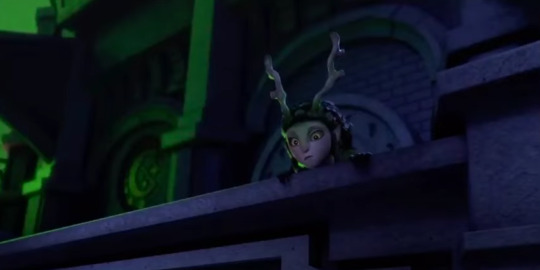
When Nari is introduced to us in Wizards, she is quietly watching the arrival of our heroes at the castle. She doesn't make herself known to them, but it is clear she is very interested in what's happening. She does not make any other appearance until the Arcane Order launches their assault on Camelot.
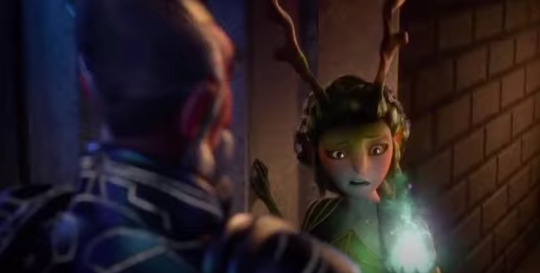
Nari's first spoken words are, "Merlin! This is all my fault!" and as one would expect after hearing this, she is very obviously distressed and feeling guilty for putting everyone in danger. Merlin tells her they need to escape to the past, and that he needs her help in order to do it. Nari's response is to begin charging her magic as she says "I will do what I can."
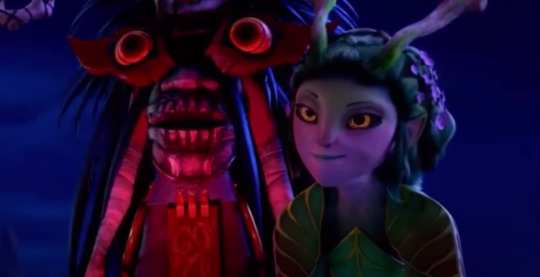
After our main characters are thrown back in time, we're introduced to Nari as she was in the past. Although she is allied with the Arcane Order in their war against humanity, it's clear that she displays the least amount of malice out of the three. In fact, it's revealed that Nari has always been rather fond of humans, and has even reached out to them in friendship a number of times. After resurrecting Morgana, Nari is the one who does most of the explaining and introductions, showing a bit of a playful/mischievous side as she pokes fun at Bellroc and Skrael. ("I told you she would, Skrael! So old, and they still haven't learned manners.")
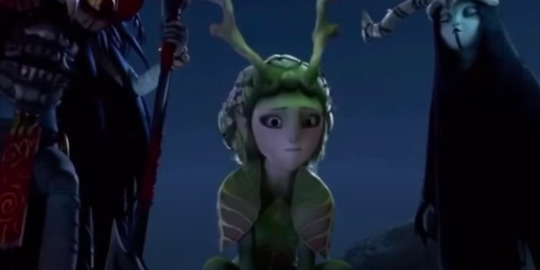
During the Battle of Killahead, we see Nari watching the war from a distance, and it's clear from the expression on her face that she is not liking any of this. Though she does briefly aid her siblings when they join in the battle, she reveals afterwards that she can sense the pain and suffering they have inflicted on others--and she doesn't believe the Order's ambitions are worth that. She abandons the Order, presumably spending the next 900 years in hiding, before seeking Merlin's protection.
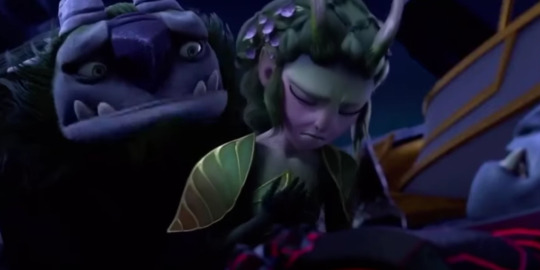
Once our heroes have returned to the present, Nari becomes a bit more involved in the plot. She expresses genuine sorrow over the destruction of Arcadia Oaks High ("Your beautiful school-home was crushed!") and is clearly distressed by Jim's agony as the shard in his chest begins to work its dark magic. ("Poor soul! Your corruption...I feel it worsening.") After Jim is taken by the Order, we can see her comforting Toby in the background. She continues to show great concern and empathy for the people around her, and is still eager to help wherever she can, though her magic doesn't seem to be combat-oriented. She is also shown to be somewhat timid, hiding behind Merlin or Claire during confrontations with the Order--she is very clearly terrified of her old allies, and seems to want to avoid direct contact with them. When Douxie is struck down by the Order and is falling to his death, it is Nari who runs to try to save him before anyone else--apparently, if someone is in need, Nari's first instinct is to rush to their aid.
So, from all of that, we can gather that Nari, as she was characterized in Wizards, is intelligent, curious, cautious, gentle, empathetic, and very aware of what's going on around her. She is also a little playful and wild, but never to the point of disregarding what's happening or how others are feeling.
In Rise of the Titans, Nari remains consistent with this characterization for all of...seven minutes.
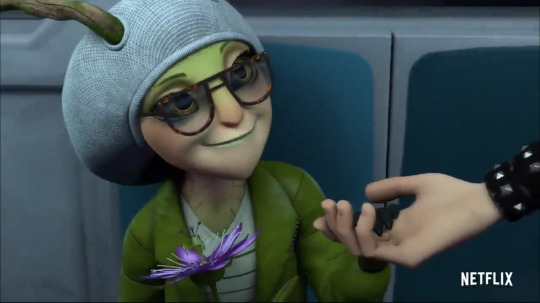
Initially, Nari is still very much herself in this scene (though I wish we could've been told what exactly made her want to stop running and face the Order head-on. Again, in Wizards, it was abundantly clear that that was the one thing she did NOT want to do). When Douxie expresses his anxiety about the situation, she takes him by the hand, offers him a reassuring smile, and says, gently but firmly, "No. No more running, Douxie." Excellent interaction. 10/10. Five stars. That's also the only time in the movie where Nari displays any level of awareness regarding Douxie's (or anyone's) feelings/wellbeing.
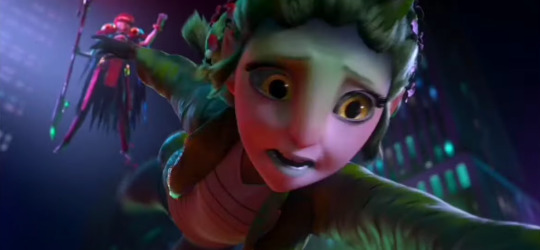
The body-swap scene is when Nari's character just completely swings in the opposite direction, and she becomes near-unrecognizable as being the same character from Wizards. Douxie, being our favorite Self-Sacrificing Idiot, swaps bodies with her at the last possible second, causing the Order to take him instead. Nari, now stuck inside Douxie's body, seemingly doesn't think much of this development at all. In fact, her first response is to giggle playfully. UM, NARI. NARI, SWEETIE, YOUR BIG BROTHER IS IN THE CLUTCHES THE MOST EVIL BEINGS KNOWN TO MANKIND. LIKE, THEY LITERALLY KILLED HIM THE LAST TIME HE RESCUED YOU FROM THEM, WHY ARE YOU NOT MORE WORRIED ABOUT THIS?! Up until this point, Nari has never been shown to underestimate the Arcane Order--she seems all too aware of the kind of violence and destruction they are capable of, which explains why she was so terrified of them in Wizards. But in Rise of the Titans she seems to just....not really care anymore? The entire time she is in Douxie's body, she doesn't express the slightest amount of concern for him, or for anyone around her. She just keeps doing...cutesy forest gremlin things, like singing to her flower, batting at a light fixture, and antagonizing Archie (she's definitely not the only character who was severely lacking in empathy in this movie, but this is an essay about Nari, so I'm not going to bother touching on everyone else). This is a direct contradiction to her characterization in Wizards, where she was shown to care deeply for the people around her, and displayed genuine distress whenever they were in danger or suffering.
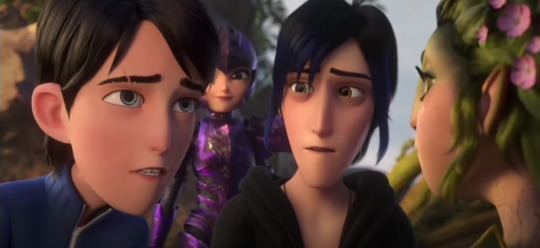
Nari also persists in being pointlessly cryptic for the entirety of the movie because....reasons. Before the Order breaks Douxie's body-swap spell, she tells Jim, "Trollhunter make ninth configuration--the Kronosphere will make right." Which, of course, doesn't help him in the slightest. And when they finally succeed in rescuing Nari, she doesn't elaborate or explain this at all. She just says it again. Listen, I can get behind Nari being Insanely Ancient, and maybe a little out of touch with modern trends, but I'm fairly certain that Wizards Nari at least knew how to communicate. She never showed any inclination towards being cryptic or mysterious on purpose, at least. We're never given any explanation for Nari's sudden lack of clarity, so I guess it was just there for plot reasons. Which makes it that much more infuriating.
Also I don't know why, but the little "Hehe!" Nari does when Douxie pulls her into a hug kind of grinds my gears, because Nari, love, this is a really serious moment, you were just snapped out of mind control and your siblings are currently rampaging across globe in giant magical mechs, why are you giggling like a four-year-old and not, idk, SOBBING IN A MIXTURE OF RELIEF AND HORROR BECAUSE YOU WERE ALMOST PART OF WHAT DESTROYS THE EARTH?! AS THAT WOULD BE A MORE APPROPRIATE RESPONSE TO WHAT JUST HAPPENED????!!!!! But that's just a stupid little nitpick.
Now this is not me saying that Nari's characterization in the movie is objectively bad. Actually, it's kind of fitting for the Tales of Arcadia brand of humor--Super ancient demigoddess who houses the power to completely destroy the earth is also kind of a clueless ditz and needs to be babysat like a toddler. If she had not been introduced in Wizards, I would've been fine with this. But, much like the rest of the movie, Nari's vastly different characterization felt a tiny bit like a betrayal, and it consistently bothered me in every single one of her scenes. It also kept me from feeling the full impact of her death--seriously, I didn't cry at all when she was killed. Which....yeah, I'm just as surprised as you are.
So anyways, if you've made it this far, thank you so much for the ask, Non! Normally I have a bit more self control than to just....essay-dump like this, but honestly I've been thinking about this for way too long, and I had to get it out of my system. 🥴 And to anyone who really liked Nari's characterization in RotT--that's totally valid! Again, I don't think it was a bad characterization. It was just very inconsistent with her character as she was introduced to us in Wizards. And I just happen to prefer Wizards Nari over RotT Nari. 🌿✨
37 notes
·
View notes
Text
Hanyo no Yashahime
Season 1 Review
It’s review time
Hanyo no Yashahime is the sequel to the classic anime InuYasha, in which a teen from present day travels back to Feudal Japan where demons and magic are very much a reality. The sequel follows the children of the main characters from InuYasha and puts them on their own adventure to save the world.
Note: All opinions are my own. This is a critical review of entertainment media, and will include criticism. If you do not agree, then simply ignore.
The Plot
Early on, it was established that Towa and company would seek out the dream butterfly and get back Setsuna’s dreams/sleep. Treekyo told them they would have to defeat Sesshomaru and Kirinmaru. After many episodes, this plot line was unimportant and almost discarded. Passing and fleeting, the true motive of the girls quest is sporadic and mentioned sparingly, and for many episodes it seemed they were only there to slay high level demons.
Mysteries and questions were extremely abundant and established early on, and as the episodes went by, it was clear they wouldn’t be answered. At least this season. One thing the fandom has noticed is how many questions there are, and how in some crazy way sunrise managed to withhold all answers and key plot points from the plot for so long. Treekyo? Not that important apparently. Her prophecy? Never mentioned again. The dream butterfly? Seen not explained. It’s connection to Kirinmaru and Zero? Contradicted in the show. InuYasha and Kagome? Just as forgotten as Moroha when there is a fight.
The pacing of this show was all over the place and inconsistent, providing too much focus on filler in some episodes and not enough plot in others. And in the episodes where we got to come back to the main story, we would get info dumps. I mentioned in my mid-season review how info dumps are cheap in the scheme of writing and plot outline, and I’ll say it again because I was surprised as the episodes went on how inconsistent everything was getting.
Now, don’t get me wrong, InuYasha had lots of fillers too, but unlike Yashahime, they established a lot of exposition and plot within the first 12 episodes; we got the main characters and their ambitions/conflicts, the main villain, the dual antagonist (Sesshomaru, at least he was a villain for a bit anyway) and the basics of the magic system was established and explained. Yashahime did set up the character’s goals, but the character’s quickly seemed to forget them, while in InuYasha their goal of finding the jewel shards was always at the forefront of the majority of the episodes. The main villain was supposedly Kirinmaru (his careless attitude throughout most of the show did not provide the antagonistic “high stakes”) and he sent demons to battle the girls, but the girls were so overpowered and perfected their powers so quickly that the demons provided no real challenge or added any stakes or drama.
The ability/powers of characters were retconned. This was odd and not something I expected. One of the most notable examples is how certain abilities are apparently genetic and inherited through dna instead of through the swords that harbored them like the original series established. An example is Moroha’s “Crimson Backlash Wave” where it mimics the ability Tessaiga has where it sends an opponent’s own demonic attack right back at them, destroying them with their own demonic energy. Moroha does not use Tessaiga, she uses Kurikaramaru. The backlash wave was said to be unique to Tessaiga, and only able to be used with Tessaiga, but that lore was weirdly chosen to be retconned. It is unclear wether or not this will be expanded upon in season 2.
In episode 19 of Yashahime, there was blatant homophobia and transphobia. No excuse, there was. InuYasha also had homophobic and transphobic characters. Yashahime could have changed that, but it perpetuated that instead, and it was extremely disappointing. In episode 20, Shiori, a beloved character from the original series, is shown changing into her human form during a solar eclipse. Yashahime chose to whitewash the character by lightening her dark skin. In InuYasha, several characters had darker skin, like InuYasha himself, and when he turned into his human form, his skin would stay the same. There is no excuse for this. Both of these episodes blighted Yashahime’s potential to step away from those things, but it continued to do it instead.
The final episode of the show was fast and full of unanswered questions. The dream butterfly was still not explained, Rin did not wake up, InuYasha and Kagome were not even mentioned, let alone released, and Kirinmaru parented Towa and Setsuna better than their own father. Zero flees, using spider silk (she strangely has many parallels with Naraku, even down to spider imagery) and sets herself up to be the main villain. And Setsuna dies, and Sesshomaru doesn’t seem that worried at all. It was interesting however to see Kirinmaru fight the girls, and he basically began teaching them about their moves and powers. Another interesting aspect was how Sesshomaru is apparently, potentially, time traveling. He shows up and hands Towa the Tensiaga, and the rain stops, and when she takes it, the rain starts again. Towa looks up and it is shown Sesshomaru has vanished instantaneously.
The Characters
Towa Higurashi: In the first two episodes, Towa was portrayed as a tomboy who kicked ass and cared for her family. She was confident and had ambition. Once she came to the feudal era however, her entire personality changed. Her surroundings and the people/beings she met were indeed something she had never encountered, but she suddenly became a moralist, and cautioned Setsuna and Moroha to never fight, despite she herself being notorious in modern day for fighting bullies and bad people. It is almost like her fighting persona in modern day had never happened. Overall, it felt her character was overly gullible, and though she meant well, her sudden drop from “school fighter” to “naive moralist” was odd and seemed to contradict the character they set up in the first three episodes.
Setsuna: Like father like daughter, Setsuna retains her father’s most iconic personality traits, and is focused on her ambitions and remains cautious around people and demons alike. She was, perhaps, the one out of the three princesses to have the most backstory and character focus (despite Towa being the main character) The mystery of her connection with the dream butterfly was genuinely interesting, though it did feel like it dragged on for too long in certain aspects (some lore even felt contradicted) Writing wise, Setsuna felt the most consistently written character of the three girls, both in personality and in development.
Moroha: The perfect mix of her parents, Moroha has had little to few familial relationships and friendships in her life. Her goal of earning money seemed petty at first, but when Moroha finally got her own episode, it was revealed to have a deeper meaning. That episode highlighted Moroha’s strength and perseverance. What was a poor move on behalf of Yashahime’s writers was the strange choice to constantly omit Moroha from vital fights (and even basic fights) It happened pretty much every time, and Moroha was never around for key information about her parents or their quest. It is unclear why her being there for the information would be a bad thing. Her relationship with Towa and Setsuna was shallow, and their bonding had no real emotional impact. In fact, Towa and Setsuna openly mention how they need her for her abilities, not because they like her. The one episode they tried to make them bond fell flat due to the lack of build up and relationship development.
Conclusion
Hanyo no Yashahime was inconsistent and fell flat with several character relationships and motivations. Plot point execution was sporadic and lacked emotional depth and coherent understanding, leaving viewers more confused than awed. Characters from InuYasha were out of character and felt hollow; some of them were not even involved as much as one would think and one didn’t even show up. Kirinmaru is perhaps the most interesting new character to come out of the series, and his respect for the Great Dog Demon has led him to enter a deal with Sesshomaru, and even protect the three princesses. This contradicts several actions he took, and makes a compelling mystery in certain aspects. In conclusion, the show felt rushed and lacked emotional and character depth, and presented several problematic and harmful themes.
Note: Again, all opinions are my own. You are free to comment, but please be respectful.
55 notes
·
View notes
Text
Tom Hiddleston on The Evolution of Loki: From Villain to Hero and Back
After playing the cosmic superbeing and anti-hero Loki for a decade in six Marvel Cinematic Universe movies, actor Tom Hiddleston says he was “surprised, delightedm and in some ways completely thrilled” by the notion of continuing to personify the God of Mischief in the new Marvel/Disney+ series Loki.
“When I first started playing the character, I did a lot of research,” Hiddleston tells Den of Geek. “And the thing I realized at that time was the character has so much range and contains all these different characteristics sometimes which contradict each other. I loved what Marvel Studios had invented as a context for exploring and externalizing some of these things that he’s always contained.”
In Loki, an earlier version of the character than the one we have seen in recent years manages to escape the custody of the Avengers in 2012 with the help of an errant Infinity Stone. But he inadvertently creates an alternate timeline by doing so, bringing him to the attention of the extra-dimensional bureaucracy known as the Time Variance Authority, who are charged with keeping the timeline secure.
“I think the TVA, the institution that claims to govern the order of time, is a fascinating place to put Loki,” says Hiddleston. “Loki represents chaos and mischief and transgression and disruption, and he’s playful and charming and can be very dangerous. To have these two forces of order and chaos meet in the middle is really exciting.”
We first met the Marvel Cinematic Universe’s version of Loki, God of Mischief and member of the royal family of Asgard, in 2011’s Thor. He was a loyal brother to the title character and a dutiful son to Odin, ruler of the Nine Realms.
But doubt and ambition began to quickly chip away at Loki, especially once he found out he was not a true Odinson but the child of Laufey, leader of the Frost Giants, taken by Odin after the last major war between the Asgardians and the Giants.
Feeling hurt, betrayed and passed over in favor of the full-blooded Thor, Loki schemed to align himself with Laufey and his people, bring down Thor and Odin, and rule Asgard himself.
Defeated at the end of Thor, Loki survived a plunge into the void of space and aligned himself with the Mad Titan, Thanos, gaining possession of the Tesseract, vessel for the Space Stone, and leading an army of Chitauri to invade Earth in 2012’s The Avengers.
Although he was beaten back by Earth’s Mightiest Heroes in that epic battle, Loki would appear in four more MCU films — Thor: The Dark World (2013), Thor: Ragnarok (2017), Avengers: Infinity War (2018) and Avengers: Endgame (2019). Over the course of the first three, he would gradually evolve from a complex villain into an anti-hero of sorts — fighting once again alongside his adopted brother — and finally into a hero who sacrificed himself in a doomed, fatal bid to stop Thanos.
But it’s in Endgame that a trip back to 2012 by several Avengers goes astray and allows that version of Loki — the still unrepentant trickster who just tried to conquer Earth — to snatch the Tesseract and vanish into space and time. So the Loki we meet in the new series is not the regretful and ultimately noble warrior who gave his own life in Avengers: Infinity War.
“I had to un-stitch some of the evolution that Loki had gone through in The Dark World and Ragnarok,” says Hiddleston when asked about resetting the character back to an earlier stage in his development.
“It was kind of like time travel in its own way, because I was going back to a time when I performed the character again in a particular context, in the first Avengers movie,” Hiddleston elaborates. “It was really interesting, because obviously Loki hasn’t lived through the successive evolution, but I have. I actually have real memories of doing those things. It was a really curious day at work.”
For director Kate Herron, who is guiding Loki’s progression as a character through all six episodes of the series, picking up with the God of Mischief as he was nine years ago was a “unique opportunity.” She explains, “I’ve loved Loki’s arc over the last 10 years of Marvel. I just was so pleased that I got to be the one that goes back in with him.”
Herron continues, “But he’s from Avengers, so he’s in a very different emotional head space. A really cool question I wanted to explore in the show was, is anyone truly bad or truly good or in that gray area in between? I feel Loki lives in that gray area so often for so many of the films. That to me was really exciting — can he move past decisions that he’s made in his past or will he always be defined by them?”
Although Hiddleston has had other successes on the stage, TV and in the movies — including hits like The Night Manager and Kong Skull Island — Loki remains his breakout role and, for millions of fans, the one that defines the actor in pop culture. But even after inhabiting Loki for more than a decade (and perhaps more to come), Hiddleston is careful to separate himself from the character.
“I can tell you, I am not an iconic character from ancient Norse myth,” he says with a laugh. “That’s not one of the strings in my bow, as it were. (But) I found him such a fascinating character and I understand that he means a lot. He means a great deal to a great number of people and that something he represents is something that’s part of the experience of being alive. He is unpredictable and spontaneous and playful, but he’s also emotionally complex and there’s some fragmentation there.”
As for the appeal of Loki, Hiddleston adds, “I think his kind of chaotic energy is something that people are drawn to, as well as his vulnerability at the same time. Tricksters in all mythologies occupy this position, that you can’t ever pin them down. You can’t put them in a box or categorize them. It has been a real honor to step into those shoes for the time that I’ve been able to do it. Loki will live on in the minds of human beings for some time, I think, and I’m just a temporary passenger.”
37 notes
·
View notes
Text
The Witcher: The Games vs The Books
Coming to the fandom this late, I can only assume the relationship between the Witcher games and the original novels has been long since talked to death by others. But I'm far too fascinated by the whole glorious mess that is this canon not to want to get down some of my own thoughts about how it all fits together.
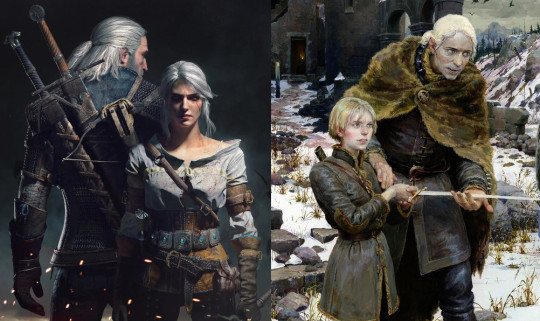
See, on the one hand, the games (Witcher 3 especially) are arguably only too dependent on the novels to stand alone. They do a wonderful job of picking up a number of unresolved plot points the books left hanging, and a woeful job of explaining so much a player coming in cold would really like to know – Ciri's history with Geralt, Yennefer, her powers and the Wild Hunt itself just to begin with. This is an issue that only increases as the games go along: cliche as Geralt's amnesia may be, it's used to good effect to introduce the world to the player in the first game. By the third, Geralt has all his old memories back and two extra games worth of new experience, and good lord is it all alienating to the newcomer.
On the other hand, so much about the games (again, the third especially) contradicts the novels in painfully irreconcilable ways. That wouldn't necessarily bother me – adaptations are allowed to rework and reinvent, stories can and should evolve in the retelling – except, well, see point one above. So you're bound to come out of the games with a lot of unanswered questions if you haven't read the books, and just as many if you have.
Spoilers to follow, of course, for both the books and the games.
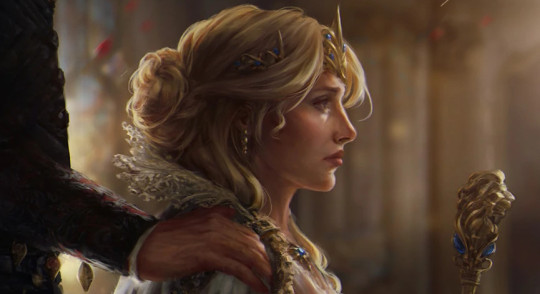
Here's one of the big ones: just how did the world – Ciri included – discover that one of her long-presumed-dead parents was actually alive and well and now ruling the entire empire of Nilfgaard? Fucked if I know. Neither the games or the novels have any explanation. In the novels, in fact, the world at large believes Ciri is married to the emperor of Nilfgaard. Naturally, this 'Cirilla' is a fake, but the scandal were the full truth ever revealed would redefine Emhyr's reign. Yet somehow, in the games, everyone seems to know he's Ciri's father, and that whole awkward incest angle is never mentioned. Continuity has been tweaked pretty significantly, and it's left to the player to guess how. If that wasn’t bad enough, the games apparently still included a Gwent card of the fake!Cirilla (artwork above) just to ensure maximum confusion.
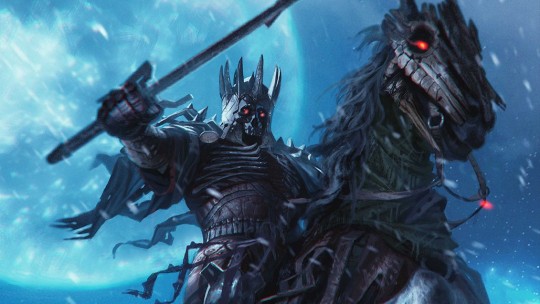
Before I get too sidetracked with all that stuff that doesn’t add up though, there really is a lot to be said for what does work about how the games expand on the plot of the novels. The Wild Hunt itself is the big one. The spectral cavalcade appears several times through the novels and hunts Ciri across multiple worlds in the final book before apparently losing her trail and vanishing to make way for the 'real' big bad, never to be mentioned again. While TW3 left me pretty underwhelmed by the revelation that the spectral Wild Hunt were just a bunch of dark elves in skull armor, the books had introduced the Hunt and let us spend some time on the dark elves' world before we get the reveal that the two may be one and the same. So for all the ranting I could do about missed opportunities regarding the Wild Hunt, they're the natural candidate for the games to pick up on as their new big-bads.
To my surprise, Geralt and Yennefer's "deaths" and subsequent recovery in pseudo-Avalon also comes straight from the novels. That everyone thinks Geralt dead at the start of the first game isn't, as I'd first assumed, a convenient excuse to have him reappear with amnesia, but simply how the novels end. Why Ciri leaves them and goes world-hopping isn't clear, but "because the Wild Hunt was after her again" is as good a theory as any. So, another point to the games there.
And there's so much more. The Catriona plague has only just appeared at the end of the novels, but we know it's posed for a major outbreak – one that’s in progress by the time of the games. The second game in particular does a terrific job of taking the ambitions of the expansionist Nilfgaardian Empire and the still-relatively-new Lodge of Sorceresses and building an entirely new conflict around them – even taking two of the least developed members of the Lodge (Sabrina Glevissig and Síle de Tansarville) and expanding them into major players. Dijkstra similarly ends the novels on the run from those in power, and having already taken the same assumed name 'Sigi Reuven' he's using in the games – while the books assure us that prince Radovid will grow up to pay back his father's assassins (ie. Phillipa) and become Radovid the Stern.
The twisted fairy tale origins of the novels are something the games actually seem to have gotten better at as they went on: the 'trail of treats' to the Crones is the great example, the monster-frog-prince and the land-of-a-thousand-fables of the expansions are two more, and many more are hidden in sidequests. And I'd be remiss not to mention that in again asking Geralt to pick a side in the conflict with the Scoia'tael, the first two games not only recreate a scenario Geralt repeatedly deals with in the books, but a major theme. It's interesting too how much the broad structure of the third game feels like an homage to the books, with Geralt searching for Ciri, interspersed with sections from her POV. You can nitpick the detail of any of these examples, but the intent is unmistakable, and a lot of credit is due for it in the execution too.
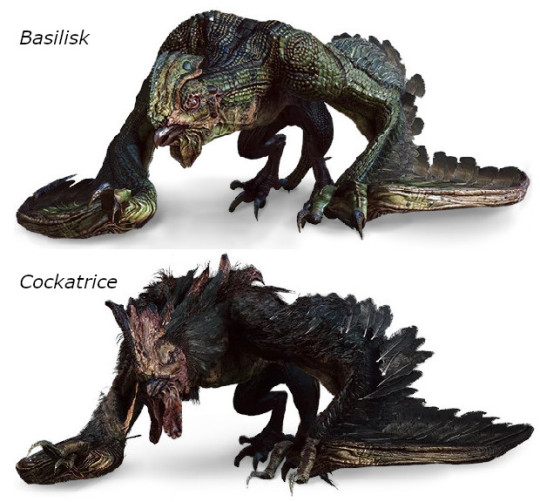
Some of the detail that's gone into translating the world of the Witcher books into the games is just insane – not just in the geography and history of the place, but right down to the names of the wine you can pick up. There's the fact the Cat potion makes Geralt see in black-and-white, or the fact the basilisk and cockatrice monsters are clearly based on the same model, but the basilisk is reptilian where as the cockatrice is more avian – which is exactly how Geralt describes the difference between them in The Lady of the Lake. There's a point where Book!Regis recounts a detailed list of all the lesser vampiric species, ending with the only two violent enough to tear apart their victims: almost all can be encountered in the games, and the last two (Fleders and Ekimma) are indeed the most animalistic. This kind of thing is everywhere.
My favourite examples tend to be those that blend into the background if you haven't read the books, but will get a grin from those who have, such as a peasant in Velen who will call out to Geralt (paraphrased from memory, alas) "Sir, sir! We be up to our ears in mamunes, imps, kobolds, hags, flying drakes... oh, and bats!" – which is a lovely little reference to a couple of conversations from Edge of the World wherein Geralt explains that most of the monsters the locals want him to take care of don't actually exist. Or all those soldiers chanting "Long live King Radovid!" – natural enough, but it takes on a whole new life if you've read the passage in Lady of the Lake where the young prince Radovid grumbles internally about having to sit and listen to the city chanting 'long live...' to every other notable figure present except him.
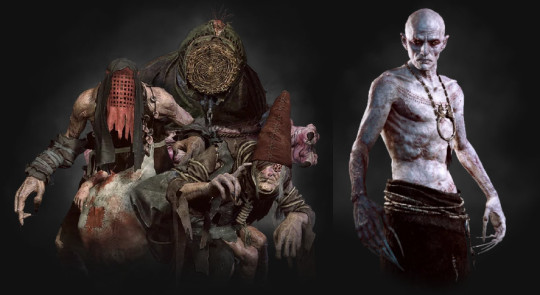
Really, it would be faster to list the things the games introduced that don't come from the original source material in any obvious form, because it's a struggle to come up with very many. The villainous Crones of Crookback Bog and Master Mirror of the Hearts of Stone expansion are the biggest ones that come to mind, along with a great deal of the vampire mythology from Blood and Wine. To the witchers themselves, they’ve added mostly game mechanics: the use of bombs and blade oils, the names of most of the potions, and three new witcher schools (all with their own specialised gear). There are a number of new creatures and monsters – Godlings, noon-and-night-wraiths, botchlings, shaelmaars and so on – and though trolls are mentioned in the books, the games take credit for giving them so much character. Obviously, there are new characters, like Thaller and Roche – but not technically Iorveth, because a Scoia'tael commander of that name is mentioned in the books, if only in passing. And already, short of just listing off every new character the games introduced, I’m running out of ideas. Credit where credit’s due on that front: most of the new characters and locations they’ve created feel authentic enough that Kalkstein or Thaller would be right at home in the novels’ world.
But for all their dedication to the detail, it's hard to feel like the games have really managed to capture the spirit of the books in their storytelling: the mundanely corrupt bureaucracy that does so much to bring the world to life, or their cheerfully cynical sense of humour, or the flamboyant wonder that is book!Dandelion, or their enthusiasm for putting women in positions of power, or the bigger themes about the differences between the story that gets sung by the bards and what really happened – or so much else from the novels that came as such a surprise to me when I started getting really sucked in.
And if we’re going to talk about all the little things they got right, it’s only fair to point out there are just as many little things they got wrong, and sometimes pretty glaringly at that. "I thought you bowed to no-one" says Emhyr to Geralt – almost as if book!Geralt doesn’t happily bow in most every situation where it would be polite or diplomatic to do so. "This would never have happened if the council was still around!" says Geralt upon finding a sorcerer's lab full of human experiments – as if none of his experiences with Vilgefortz or the wizards of Rissberg ever happened, back when the council was very much still around. In TW2, he mocks the idea of a woman like Saskia leading a rebellion – almost as if women like Falka and Aelirenn haven't led some of the most storied rebellions in history (and we can't even blame the amnesia, because Geralt himself mentions Aelirenn later – oh yeah, this one annoyed me particularly).
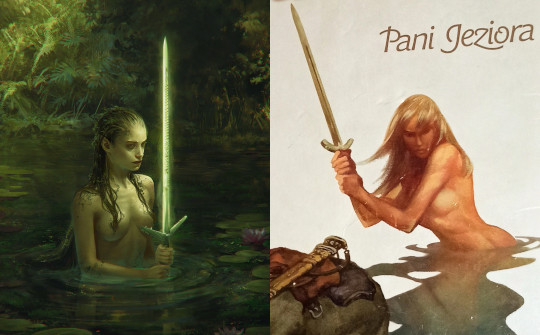
Book!verse 'Lady of the Lake' is basically just Ciri being surprised while bathing
Yennefer's studious aethiesm and willingness to desecrate Freya's temple is entirely in character – but only if we forget that she had her own personal religious experience with the goddess Freya herself in Tower of the Swallow. And then there’s the fact the Lady of the Lake is now a literal lake nymph who distributes swords to the worthy, as if no-one writing for the games ever got past the title of that particular Witcher novel (let alone got the joke). And the list goes on. It's easy to get overly caught up in contradictions like this – it's hardly as if Sapkowski's novels don't contradict themselves in places, as almost any long-running series eventually will – but it's going to stick out to those who’ve read the novels nonetheless.
While we're talking about how the games pick up where the books left off though, the big contradiction that has to be touched on comes in bringing Geralt back at all, at least in any public capacity. There's plenty to suggest that Geralt survives the novels' end and even goes on to have further adventures, but it's also pretty explicit that the history books record his death in the Pogrom of Rivia as final. The last two novels by order of publication (Season of Storms and Lady of the Lake) go so far as to feature characters far in the future with an interest in Geralt's legacy, and they discuss the matter in some depth. As far as the world knows, Geralt is dead.
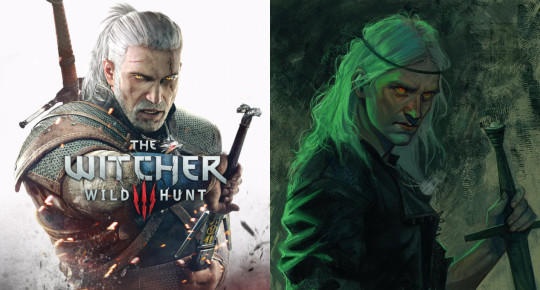
Book!Geralt fanart by Diana Novich
But it's hard to blame the games for ignoring this – true, thanks to Geralt's longevity, they could have set their conflict many more years after those future scenes – maybe even used Ciri's established time-travel powers to let you pop quietly in and out of the past (and, okay, now I've thought through all that, I'm kind of sad they didn't). But there comes a point where that kind of slavish devotion to preserving the source material really doesn't do a story any favours, and I'm not sure I could name any other successful adaptation that's bothered.
Besides bringing Geralt back at all, most of the bigger changes pertain to Ciri. In fact, as much as I'm about to get deep into the nitpicks below, you can make a surprisingly good case that the games have made only one really big change, and that's in simplifying the prophesies surrounding her. See, in the novels, all those world-saving prophesies aren't technically about Ciri, they're about her as-yet-unborn child. Who gets to impregnate her is the big driving force behind most of the villains of the books – one that all the main contenders seem to see as more of an awkward necessity rather than the inspiration for violent lust, but even so. To Emhyr, having to marry his own daughter is a bug, not a feature – but he's willing to do it to become the father of the savior of the world. But if Ciri is capable of fulfilling those prophesies herself, then Emhyr is already the father of the savoir of the world, and the revisions to his relationship with Ciri start to make a lot more sense.
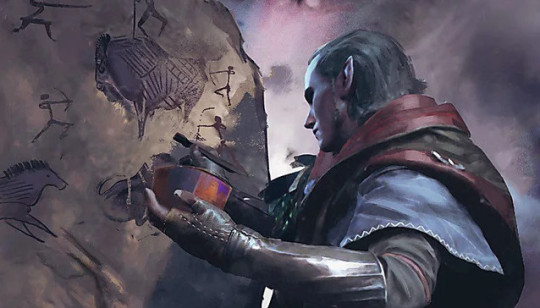
Ciri's history with the Aen Elle elves seems to have been similarly revised – if not quite so cleanly. Avallac’h and Eredin are, naturally, both book characters – in fact, a lot of personality has been left behind in the books, since Avallac’h originally had a rather camp flair, and Eredin is less the power-hungry kingslayer you might imagine. When Geralt meets Avallac’h in the books – which happens briefly in Toussaint, for one of those "everything you're doing is going to make everything worse because prophesy" conversations – he's busy decorating a cave with fake prehistoric paintings in the hope of confusing future explorers. (Surprisingly, there does seem to be official art of this moment on one of the gwent cards – see above – though the Avallac’h who jokes about adding erect phalluses to the picture and admits his vanity won’t allow him to resist signing it hasn’t entirely survived the transition to the new medium).
We also meet the former Alder King, Auberon, whose death we see in flashback in the game. (Fun fact: Auberon is actually blowing bubbles through a straw in a bowl of soapy water when we first meet him in the books, hence the straw in the illustration below. The books just have more whimsy than any of the games would know what to do with.)
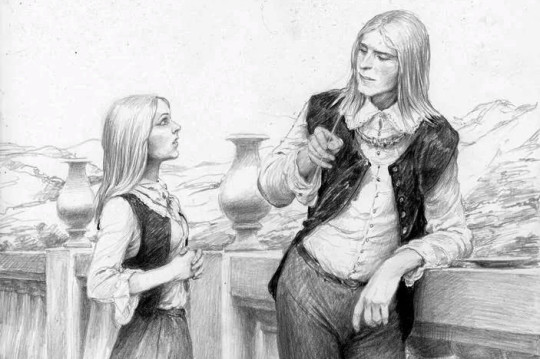
Ciri spends some time in the final book as a prisoner on the world of the elves, who are as keen as everyone else for their king to father her unborn child. Avallac’h eventually convinces her that this is all for the greater good: her child will be able to open gates to allow the people of her world to escape when the apocalyptic White Frost arrives. But their king, like most older elves, is impotent, leading to multiple nights where Ciri allows him to take her to bed (in some of the frankly more disturbing scenes of the series) to no result. Eredin, moreover, doesn't appear to have intended to poison the king: the vial that kills him was supposed to contain some sort of fantasy viagra, and even Eredin seems genuinely shocked to learn its actual effects.
Regardless, Ciri eventually discovers that Avallac’h and the Aen Elle have deceived her, and intend to user her child's powers to invade her world, not save it. Neither world is threatened by the White Frost for at least several millennia, it's just a pretext to make her cooperate. And so she flees, and Eredin (already leading his Red Riders aka The Wild Hunt long before he was crowned king) pursues her.
With the books as context, why Ciri would ever trust Avallac’h is very hard to understand. It's a little easier if that whole awful episode with her and the former king is subtracted out – Ciri's child is no longer necessary for Eredin's goals. So it's odd that the game still references the deadly vial Eredin gave to the king. Are we to suppose the vial genuinely contained poison in this version of continuity? I'd rather it didn't – Avallach's ruse is far more interesting if he underwhelms Eredin's support by revealing a half-truth – but the games aren't telling us.
And then we have to factor in that one last detail I'd forgotten when I originally started playing with this theory: TW3 does contain one last, dangling reference to the time the old king spent trying to impregnate Ciri, when Ge'els very reasonably asks why on earth Ciri would ever trust Avallac’h now. It's a damn good question, and the game offers no real answers. So in Avallac’h, we're left with a character who is vital to the final chapters of the games, who comes out of nowhere without the books as context, but whose role makes no sense with that backstory in mind. Frankly, the writers would have been much better off avoiding the whole mess altogether and inventing some new character to take Avallac’h's place.
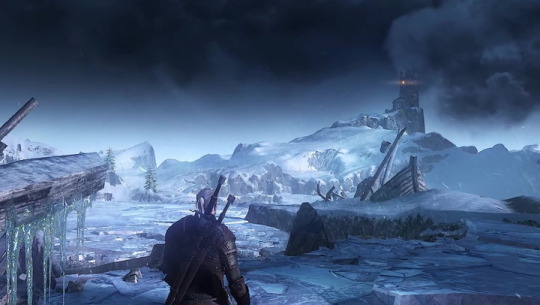
The treatment of the White Frost is even more confusing. The books are ultimately fairly explicit about just what the White Frost is: a ice age, most likely caused by the same mundane climactic factors that produced the real ice ages of our history. The only escape is intergalactic emigration, as Ciri (or her children) might some day enable.
In the games, the White Frost has instead become some sort of nebulous, free-floating apocalypse which will eventually reach all worlds, which is basically fine – up to a point. We briefly visit a dead world that the Frost has decimated, and even the Aen Elle are now supposedly planning to invade Ciri's world because it threatens theirs as well (I mean, apparently – their motivations are so underdeveloped you could miss them by accidently skipping just one or two lines of dialogue). When the Wild Hunt appears, it's always in a haze of cold. Their mages can invoke its power still more dramatically through portals which can freeze you in your tracks. So obviously, the Frost has already reached their world, and time is running out, right?
Well, no – you visit their world too (again, briefly – to meet a character who has never been mentioned before and won't be again, for reasons which have also never been mentioned before if you haven't read the books) – and there's no Frost in sight, apocalyptic or otherwise.
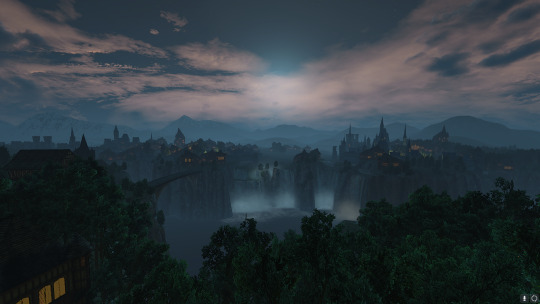
So why does the White Frost follow the Hunt around? No idea. It's never explained.
At the very end of the game, a second "Conjunction of the Spheres" occurs (possibly because of the Wild Hunt's appearance?), and the Frost begins to invade (or possibly Avallac’h summons it, so Ciri can go into it and destroy it?) It's all painfully unclear. The game is too busy pulling a bait-and-switch over whether Avallac’h's betrayed you to tell you what's actually going on instead.
But if Ciri could destroy the Frost completely (at great personal risk, but still) why is this not more clearly set up? Why did the Aen Elle think that escaping to another world (which will ALSO eventually be destroyed by the Frost) was a better solution than sending Ciri to face the Frost directly? For which matter, why do the Aen Elle need Ciri at all if sending enough ships to carry an army is no problem? Why does Ciri spend so much of the game questioning Avallac’h's true intentions, if they were ultimately so noble? When did he tell her the truth? If Avallac’h did summon the Frost, why did he pick that particular moment? And if he didn't, and it all just happened spontaneously, we're back to questioning why invading that world ever seemed like a good solution to Eredin – it all collapses in on itself.
None of these questions couldn't have been answered with a little creativity, but then the game would've had to dedicate some real time to explaining its backstory and developing its core conflict – something it's bizarrely reluctant to do. And if you think I may be drifting from the point a bit in the name of getting all my gripes about the ending down in one place, you're not wrong, but I feel Avallac’h and everything surrounding him is pretty much the ur-example of what doesn't work about the way The Witcher 3 depends on the novels: the backstory the writers are building on doesn't actually exist in any format available to the rest of us.
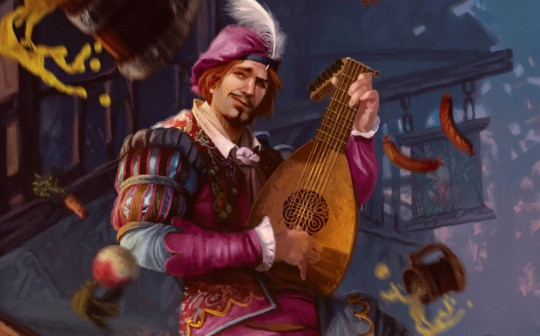
There are plenty of ways TW3 could have incorporated its backstory into its own narrative (yes, even excluding the method "by expecting people to read many many more pages of text from in-game documents", because that's bullshit and always will be). There are times it does this brilliantly, such as in the quest ‘The Last Wish’: everything you really need to know is covered in Yennefer and Geralt's conversation in the boat, and without ever making the dialogue sound unnatural. In fact, TW3 has even more options here than many works with the same problem, because Geralt is famous and people already think they know his story. You could have bards singing Dandelion's ballads, you could have characters confronting him with misunderstandings about his past to force him to correct them. You could also have Geralt visiting people and places he knows Ciri remembers fondly because of the time they spent there together, or include playable flashbacks similar to the time you spend playing as Ciri. You could stick chunks of backstory in optional sidequests or scenes old-school fans can skip through quickly. So many of my questions (how did Ciri get so close to Yennefer if they were never at Kaer Morhen together? Why has no-one tried training Ciri in her powers before? What does the Wild Hunt even do while it's not hunting Ciri? Why is Ciri princess of Cintra if her father is Emperor of another country altogether?) could have been answered so easily.
Seriously, summarising the Witcher books is not that hard. Lots of things happen, but only a fraction of it is really relevant in retrospect, and you could hit all the major plot beats in a handful of paragraphs. (Heck, I’d do it here if this post wasn’t already ridiculously over long.)
But then, TW3 has a bizarre problem with leaving so much of its best material off screen, even from its own story. It's criminal that we never get to see any of Geralt's time (or Yennefer's) with the Wild Hunt, even in flashback or dream sequence. This is material that directly sets up the relationship between the main hero and the main villain, and the most we ever hear about it is a few vague allusions to it being like a strange nightmare. Really? That's it? What was it like? Was Geralt in a trance, unable to control his own actions – was he brainwashed into believing he belonged there, or was he merely unable to escape? What atrocities might Eredin have forced him to commit? Did he visit other worlds? Was he paraded among the Aen Elle as a captive? There is no way this isn’t a part of the story worth talking about!
We never see the moment Ciri rescues Geralt from the Wild Hunt. We never see how Avallac’h convinces her to trust him, we never see the moment he was cursed, or any of her efforts to save him – all these big, story-defining moments are left off-screen, to be vaguely recounted to you later in dialogue. Then there's the entire political situation in Nilfgaard – you hear about it second-hand, and it's all resolved off screen. And the list goes on. Yet you and Ciri still have time to run around Novigrad so she can thank a bunch of throwaway characters you've never even heard of before, nor will again. The priorities on display here are baffling.
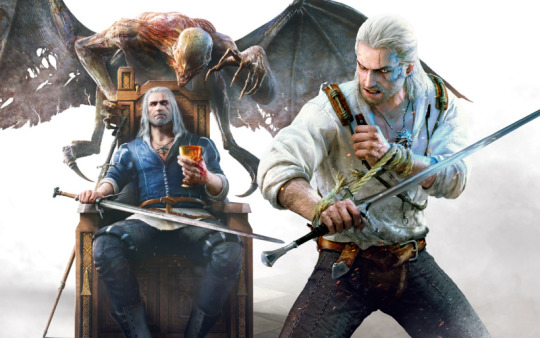
The Witcher 3 was such a wildly successful game that it’s obvious these sorts of issues didn’t seriously hold it back, and it’s such a big game that I could have sat down and written just as many words focusing only on the parts that do work without much difficulty. It boasts stunning visuals, addictive gameplay and some truly wonderful characters, and so many parts of the story work brilliantly in isolation that it’s strange to come out of it feeling that it ultimately adds up to so much less than the sum of its parts.
I’m glad TW3 exists – if it hadn’t been such a runaway success I doubt I’d ever have discovered Sapkowski’s universe at all, but for myself, TW3 will probably always be remembered as a somewhat-overlong introduction to the really good stuff, in the expansions and the original novels it came from. I looked up the novels after finishing TW3 in large part because I’d been left with so many unanswered questions – and I’m glad I did, but I’m honestly surprised more people weren’t turned off by TW3′s scattershot approach to its own narrative. You’re allowed to change and rework in moving to a new medium, but I can’t imagine it would’ve hurt games’ success to tell a complete story in the process.
93 notes
·
View notes
Text
Tale of The Nine Tailed: Analysis and Theories
First and foremost, I would like to give my sincerest praise to the cast and crew of Tale of The Nine Tailed ! It is simply a wonderful and very thought provoking show! I strongly recommend it to everyone!

Now, I’m going to forewarn you all that this post will be very LONG, but hey you might learn a thing or two and be able to draw your own theories and/or conclusions after reading this post! I had previously posted some of these connections/theories on my Twitter, but I figure hey why not post them on Tumblr too !

What Is An Imugi/Imoogi? What Is It’s Goal?
In Korean folklore, Imoogis are lesser dragons that look like big snakes or kind of like a basilisk from Harry Potter.
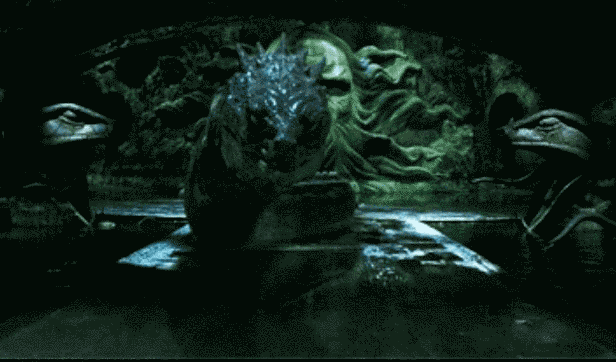
One of an Imugi/Imoogi’s main goal is obtain a “Yeouiju” or a celestial orb which allows it to become full fledged celestial dragons which can rule the skies. In the context of TOTNT, there is such a type of “Yeouiju” in the form of Lee Yeon’s fox bead. Therefore, I believe that the ultimate goal of the Imugi/Imoogi is get Lee Yeon’s fox bead.
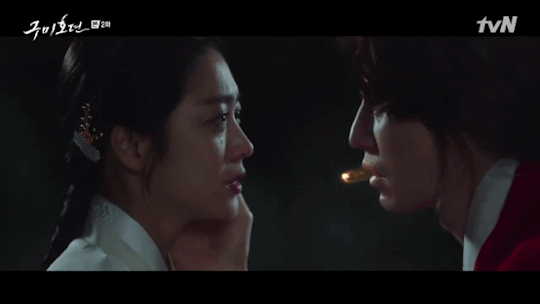
Side note, I kind of think that the Imoogi not only wants to rule the skies, but the ground too. I wouldn't be surprised if he sought to do so by raising an army of zombies (maybe thats who Lee Yeon was seen fighting in the intro credits) !
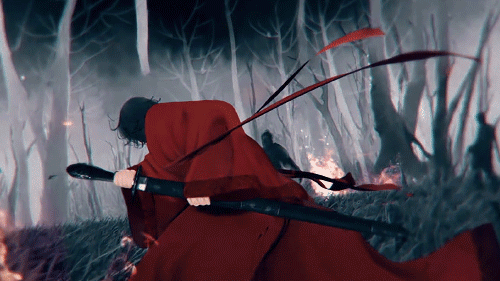
Why be content with just ruling the skies when you can rule the entire world? Additionally, he could have further ambitions to not only rule the world, but to also rule all realms like the heavens and the Underworld.

The Imoogi is very strategic into getting what he wants. By strategic I mean that he likes to use people as leverage or use their own weaknesses against them.
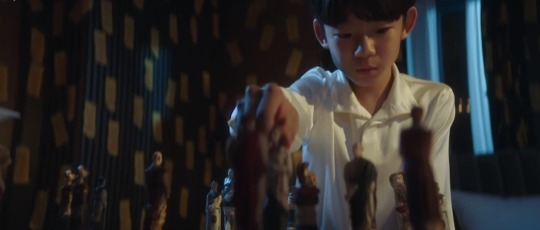
Therefore, I believe what happened originally during Ah Eum’s time is that the Imoogi had possessed her body in order to get Lee Yoon to hand over his fox bead. The Imoogi knew how much Lee Yoon had loved Ah Eum and would be willing to do anything for her.
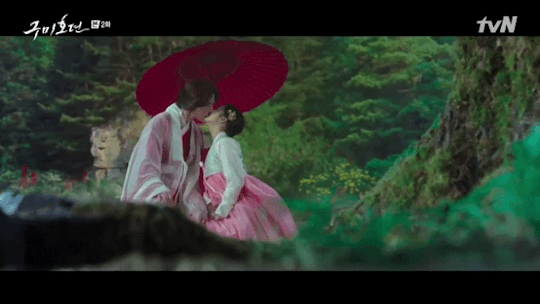
However like Voldemort, the Imoogi did not anticipate the power of love and sacrifice. Ah Eum had temporarily gained control of her body long enough to do either two things: ask Lee Yeon to kill her or run into Lee Yeon’s sword thereby killing herself. In either cases, she fulfilled her promise to Lee Yoon which was that she would always protect him.

Now jumping back to the present time, we know that original target of the Imoogi’s plan was Ji Ah. Why? Because his lame self wanted to do what he did in the past and use her again to get Lee Yeon to hand over the fox bead. However, this time around, Ji Ah had Lee Yeon’s fox bead inside of her which offered protection from full possession by the Imoogi. So then the Imoogi’s minion (tv station president) took the next best thing which was Ji Ah’s parents to be used as leverage at a later time so that Ji Ah would hand over the fox bead.

However, things have now changed because Ji A gave away the fox bead to the fortune teller to save Lee Yeon. Now I have mixed feelings about this situation. On one side, I find it romantic that she’s willing to give up anything to save Lee Yeon. On the other side of it, I’m like girl why are you so stupid?! Lee Yeon literally gave up his mountain title in order to give Ah Eum/Ji Ah that fox bead. It’s almost like Lee Yeon’s actions were met in vain. Plus, when Ji Ah said she doesn’t believe in destiny or that sort of stuff, it also got me riled up because it was a contradiction to the whole premise of her character in the first place. From the get go, the writer wrote that Ji Ah believes in the supernatural and mystical. So then why wouldn't she believe in fate and destiny?

Anyways back to more analysis. Without the protective effects of the fox bead, Ji Ah can once again be possessed by the Imoogi.
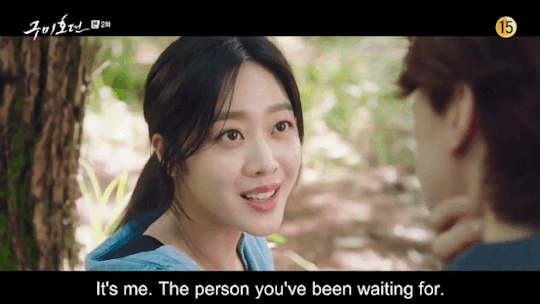
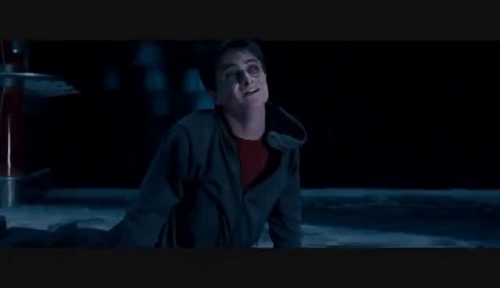
What the fox bead had done for Ji Ah was that it protected Ji Ah from the effects of the Imoogi piece aka horcrux that was inside of her. The notion that the bead had offered protective effects can be seen when Lee Yeon first gave it to her where a protective shield was erected and this was again seen in ep4 when Ji Ah cried. Also, it was confirmed when Sato said how Lee Yeon’s fox bead was meant to protect all beings, but instead Lee Yeon chose to use it to protect only one person.
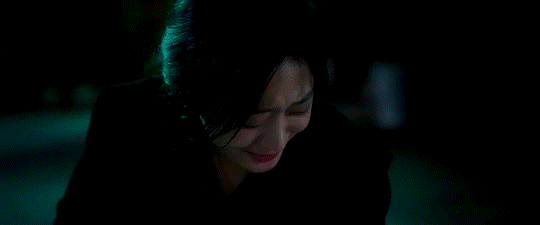
The Fortune Teller’s Message
Something of particular interest is what the fortune teller told Ji Ah about the bead. He told her that even without the fox bead or moon, her life is still “blessed”. I think what the fortune teller meant by this is that even without the protective effects of the bead, her life is still “blessed” because she will always have Lee Yeon by her side to protect her.

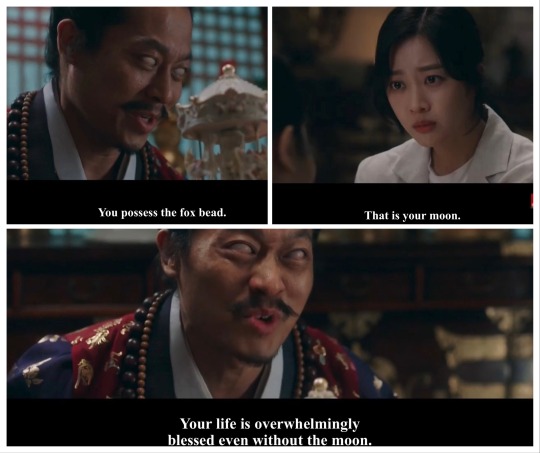
What I think will happen next is that Lee Yeon will go back to the fortune teller to try and get his bead back. Meaning Ji Ah will probably confess to Lee Yeon later on just what exactly she gave up in order to get him back. And again the fortune teller will ask for something precious to Lee Yeon. There are a few things that are precious to Lee Yeon such as Ji Ah, Lee Rang, and Lee Yeon’s immortality. Now we know that Lee Yeon would never give up Ji Ah, so then this would bring about other two things into play: Lee Rang and Lee Yeon’s immortality. I think its more of a poetic justice if Lee Yeon trades Lee Rang in. However, I could also see Lee Yeon trading in his immortality since his dream has always been to become human. Who knows though!
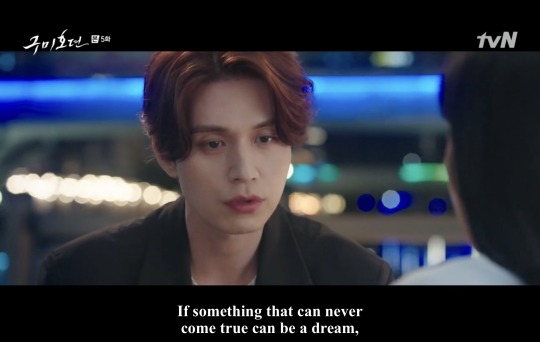


Only One Will Live: Imoogi Vs Ji Ah and Lee Yeon vs Ji Ah
In Harry Potter, there was a prophecy that “for neither can live, while the other survives”. This same message is conveyed when it comes to the Imoogi & Ji Ah and Lee Yeon & Ji Ah.
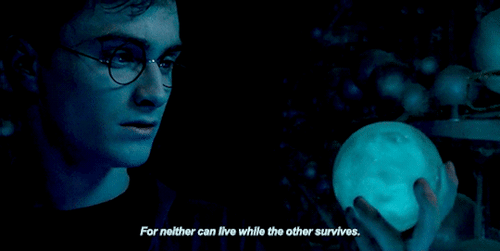
We saw what had happened the first go around when the Imoogi had possessed Ah Eum. In the end, Ah Eum chose to sacrificed herself so that both the Imoogi and the piece of him inside of her would die. Thereby, she prevented the Imoogi from using her to get Lee Yeon’s fox bead. Now presently, the same situation is basically happening again. However, if Harry Potter managed to kill the piece of Voldemort in him and still survive then Ji Ah can essentially do the same. So, how you might ask? I think the solution greatly lies in getting the fox bead back in her. If Ji Ah can temporarily die in order to get rid of the Imoogi piece inside of her, then she can be revived by the protective qualities of the fox bead.
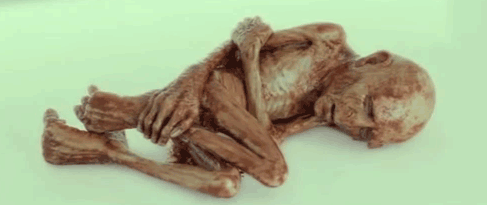
Even if Ji Ah survives against the Imoogi, it might be at the cost of losing Lee Yeon. The fortune teller even told our couple this, “If you two keep hanging out, one of you will die”. This same message is again heard in ep 7 preview when Taluipa’s husband tells Lee Yeon, “You or the girl. One must die in the end.” So can there be a situation where the Imoogi is dead and both Ji Ah and Lee Yeon are alive? Yes and it comes in the form of the Lee Rang factor.
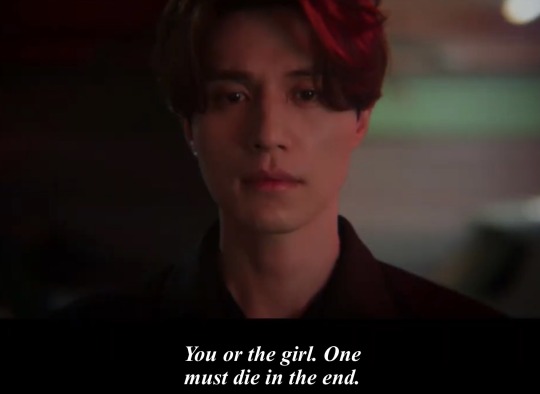
The Lee Rang Factor
We all know that our little puppy, Lee Rang, may put up the facade that he hates his brother, but in reality, Lee Rang loves his brother a lot.
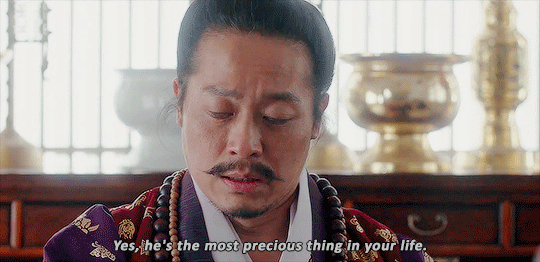
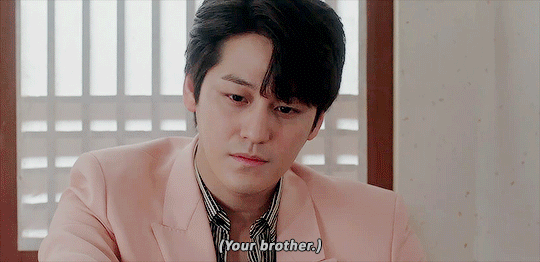
There was a clue dropped in ep.4 that hints in the end Lee Rang will be the one that saves both Lee Yeon and Ji Ah.

The hint was in Taluipa’s hand, the movie “A Better Tomorrow”. Briefly, the movie is about two brothers, Ho and Kit, who love each other a lot. However over the years, they began to develop great animosity and resentment towards each other mainly due to their differences in beliefs and professions. Ho was a criminal while Kit was an upstanding police officer. Eventually, Ho does see the error of his ways and seeks to atone for them. In the end, the two brother reconcile and Ho decides to join his brother Kit on a path of righteousness. Similar to Ho, I think Lee Rang will do the same. Lee Rang will atone for his mistakes and thus sacrifice himself to save Lee Yeon and Ji Ah.
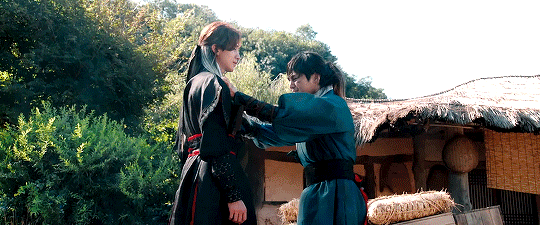
What is Ji Ah?
Seems like everyone these days has been wondering what exactly Ji Ah is. Most people seem to think that she is part Imoogi. However, there has been a bunch of clues in the episodes that answers this question.
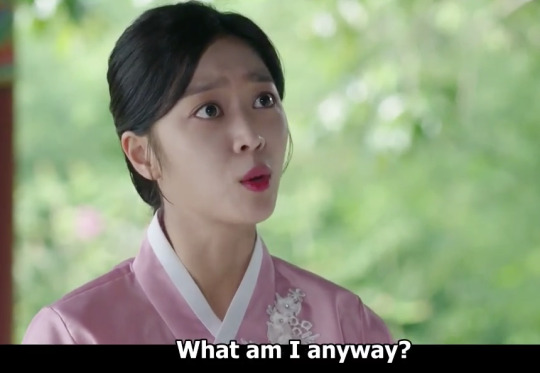
I believe Ah Eum/Ji Ah is Princess Bari, the first shaman goddess from Korean mythology.

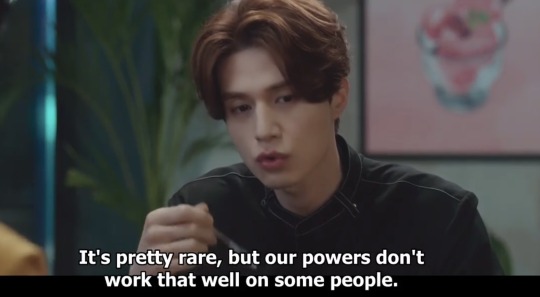
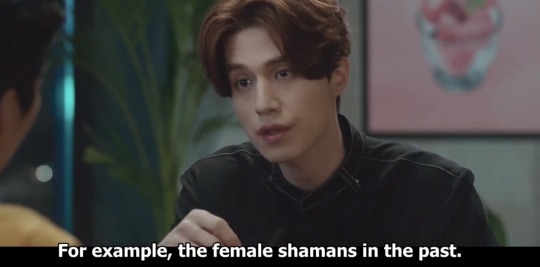
Princess Bari was nicknamed the “Abandoned Princess” because she was the last and 7th daughter of a King who had no sons. Due to her gender, she did not receive any attention from her parents and was thus abandoned.

Eventually, her parents’ lives became endangered and in order to save them she had to travel to the Underworld to get the elixir of life. Such a tedious journey showed her deep commitment to the virtue of “filial piety” or one’s love and respect for one’s parents. She became a role model for many women during this time because she was willing to sacrifice herself for the very parents who had abandoned her.

As a reward for her strong adherence to filial piety, the Gods made her the first shaman goddess who’s job was to help and guide spirits.
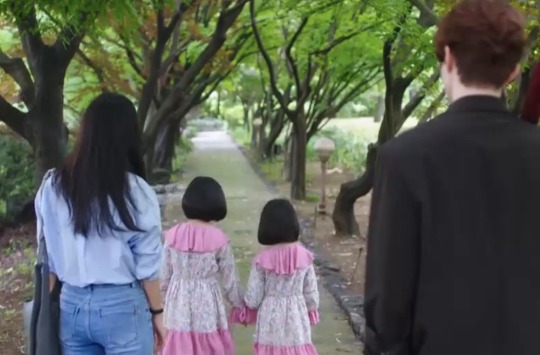
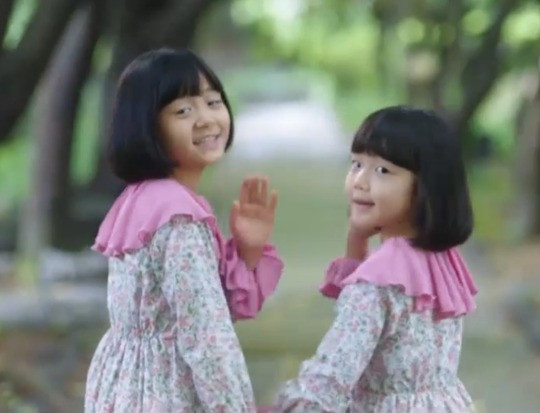
#tale of the nine tailed#lee dong wook#leedongwook#jo bo ah#joboah#taleoftheninetailed#totnt#lee yeon#leeyeon#ji a#jia#jiah#ji ah#ah eum#aheum#aeum#a eum#lee rang#leerang#gumiho#princess bari
91 notes
·
View notes
Link
Origins
The origins of the present crisis can be traced back to the disintegration of the USSR and independence in 1991. Uniquely among the states of the former USSR and Eastern Bloc, Belarus has so far avoided the shock market therapy which destroyed the bureaucratically planned economies and plunged tens of millions into dire poverty.
Instead, the caste of ex-Soviet bureaucrats — Lukashenko himself is a former manager of a collective farm — transformed themselves into national administrators of state capitalist enterprises and successfully consolidated power at the head of a still largely state-owned economy. The ruling elite’s strategy for maintaining power and social stability has been to conduct a careful balancing act between the expansionist ambitions of Western and Russian imperialism, leveraging the benefits of foreign loans and subsidies while denying its people basic democratic freedoms to suppress internal opposition.
Existing as it does within the confines of an international capitalist market, Belarus’s state-owned and bureaucratically managed economy was unable to attract sufficient foreign investment or develop the productivity of its heavy industry, and became heavily dependent on Russian oil subsidies and export markets. Even today, state industry is responsible for more than 50 percent of GDP. Belarus is very different from the oligarchic capitalism of Ukraine or Russia, but far away from a planned economy: its state industries are organised in holdings operating on the global markets at the centre of which are the three big state banks. With credit growth far outpacing real growth and lacking domestic sources of capital, foreign debt has inevitably risen and was at 80 percent of GDP even before the coronavirus crisis. For more than a decade, Belarus has been in the vicious cycle of debt refinancing, stagnation, currency crisis and price stability problems, increasing its dependence on Russia as a result.
To keep the oil flowing, Lukashenko has indulged successive Russian attempts at greater integration between the two states, but delayed or resisted any decisive moves towards privatisation, which would threaten the dispossession of domestic elites in favour of Russian oligarchs. Likewise, if he followed through on his flirtations with the EU, loans and private investment would no doubt be conditional on “reform”, that is, wholesale opening to market forces.
Despite creeping economic stagnation, for decades Lukashenko was able to redistribute the profits from sales of Russian oil to provide an at least reasonable standard of living for the country’s population, including universal healthcare, free education, subsidised rents, high state pensions, and other state welfare programmes. As a result, his government has been able to maintain a certain degree of legitimacy amongst the rural and urban workers, notwithstanding its iron grip on Belarusian civil society. Periodic expressions of pro-democracy sentiment have failed to win wider support and been easily repressed.
Stagnation
Yet Lukashenko’s stubborn refusal to accept his designated role as Putin’s stooge has led to growing tensions between the two countries, resulting in cuts to Russian oil subsidies and contract disputes frequently interrupting oil supply flows. The increasingly pressing need for economic diversification, alongside a desire to avoid aligning itself with Russia in the Ukraine crisis, have led Lukashenko to make overtures to the European Union, engaging in “dialogue” about economic liberalisation in exchange for increased European aid. But the process has been slow — a fully-fledged partnership and cooperation agreement has been blocked by opposition from Lithuania — and is ultimately limited by the regime’s need to hedge its bets between East and West to maintain its own position.
In recent years, that balancing act has reached its limits. During the deep recession of 2015 to 2017, the highly indebted state was unable to act countercyclically and real income fell by 13 percent as a result of currency devaluation and price increases. Faced with falling growth and increasingly unable, or unwilling, to draw on Moscow’s patronage, Lukashenko has turned to an assault on his own working class to claw back losses and stave off economic disaster.
In 2015, the so-called “parasite law” was brought in, forcing anyone not in state-recognised employment to pay a special tax or be sentenced to community service. The decree was withdrawn in 2018, but the unemployed are instead being forced to pay for all state services. A series of amendments to the labour code in 2017 unilaterally shifted 90 percent of workers from permanent to temporary contracts.
Widespread cuts have been implemented across health and education and the retirement age has been raised. All this combined with the steadily falling value of the Belarusian Rouble, has meant a serious decline in the standard of living for Belarusian workers. With the coronavirus crisis, the economic problems of its main trading partner (Russia) and the amount of accumulated debt, Belarus is now on the brink of economic collapse. Given the “crisis management” of Lukashenko during the coronavirus crisis so far, the working class and parts of the ruling class have lost confidence in the ability of the existing regime to prevent the approaching disaster. At the same time, the prolonged shutdown of the global economy is causing both Russia and the EU to re-evaluate their budget priorities.
Protest
Thus, growing discontent with the regime has, for the first time since independence, exploded into a mass popular movement drawing in huge swathes of the working class and backed by industrial action across all sectors and across every part of the country. The scale and breadth of the actions reveals the depths of the country’s political and economic crisis and the authentic character of the uprising; a US-orchestrated “colour revolution” this is not.
In the first few days of protests, the movement’s official demands were limited to calls for new elections monitored by international observers and the release of detained activists but, by Sunday, mass protests were demanding Lukashenko’s immediate resignation. The movement has developed a momentum of its own which is quickly eroding the regime’s legitimacy.
If the protests continue and, crucially, if the strike movement grows to paralyse greater parts of the economy, Lukashenko will face a choice between a bloody crackdown and surrendering power. For now, the regime still controls the police and the military, though there have been reports of some police and army personnel joining demonstrations, and protesters have been filmed appealing to soldiers to join the uprising.
The democracy movement is determined and enjoys mass support; its suppression would be likely to involve prolonged violence, risking defections in the military. Putin has promised Lukashenko military assistance in accordance with the two countries’ military pact, but stopped short of endorsing Lukashenko, who he regards as an altogether unreliable ally. In any case, Russian support would come at a high price; Lukashenko would surely be forced to abandon his policy of constructive ambiguity towards Russia and accept a future as a custodian of a Russian protectorate.
A “managed transition” of some sort may become a preferable alternative for parts of the bureaucracy which will hope to placate the democracy movement but preserve parts of the governing apparatus and reap the profits from any forthcoming privatisations of state-owned enterprises. The democracy movement thus far has little organised political leadership, taking the form of a spontaneous upsurge of popular discontent. Many leaders of the liberal opposition, who support economic liberalisation and full integration into world markets, are in prison or abroad. The movement stands on a critical threshold, what comes next will be determined by what kind of political leadership emerges to channel the discontent.
Svetlana Tikhanovskaya, the opposition candidate in last week’s elections, has declared that she is ready to take up the presidency and announced the creation of a national ‘coordination council’ from her self-imposed exile in Lithuania. She stated:
“I ask you to unite in the coordination council. We desperately need your help and experience. We need your connections, contacts, expert advice and support. This coordination council should be joined by everyone interested in dialogue and peaceful transfer of power – working groups, parties, trade unions and other organizations of the civic society.”
Many are now calling for international recognition of Tikhanovskaya’s claim to the presidency and for the EU to mediate negotiations between civil society leaders in exile and the incumbent government. But it would be a catastrophic mistake for the movement to place its faith in the thoroughly capitalist self-appointed leaders of the opposition or their ‘friends’ in the EU. Nor should it recognise a ‘coordination council’ even with bureaucratic union representatives. It is the mass forces of the working class that has brought the movement this far and they should not allow the representatives of the liberal middle classes to reap the fruits of their actions.
Nor will “free elections” on their own alleviate the suffering caused by the contradictions of Belarus’ economy. In fact, unless the mass movement can organise itself around an alternative political programme and prepare to administer the transition itself, Lukashenko’s departure is highly likely to herald a neoliberal programme of privatisations which will further destabilise the economy and turn Belarus into a semi-colony dependent on the EU and Germany.
The experience of Poland and the Baltic states in the 90s shows that this will lead to even greater attacks on workers, unemployment, austerity and inflation which will rapidly erode the remaining protections of workers’ living conditions. Every worker should know: a new “shock therapy” under conditions of accumulated debt and in the circumstances of the global coronavirus crisis would be a social disaster in Belarus. To avoid this kind of “experiment” by the liberal opposition and its “economic experts”, the working class has to have its own organisation and programme to survive this crisis.
22 notes
·
View notes
Text
Tom Hiddleston on The Evolution of Loki: From Villain to Hero and Back
https://ift.tt/3wpnGBO
After playing the cosmic superbeing and anti-hero Loki for a decade in six Marvel Cinematic Universe movies, actor Tom Hiddleston says he was “surprised, delightedm and in some ways completely thrilled” by the notion of continuing to personify the God of Mischief in the new Marvel/Disney+ series Loki.
“When I first started playing the character, I did a lot of research,” Hiddleston tells Den of Geek. “And the thing I realized at that time was the character has so much range and contains all these different characteristics sometimes which contradict each other. I loved what Marvel Studios had invented as a context for exploring and externalizing some of these things that he’s always contained.”
In Loki, an earlier version of the character than the one we have seen in recent years manages to escape the custody of the Avengers in 2012 with the help of an errant Infinity Stone. But he inadvertently creates an alternate timeline by doing so, bringing him to the attention of the extra-dimensional bureaucracy known as the Time Variance Authority, who are charged with keeping the timeline secure.
“I think the TVA, the institution that claims to govern the order of time, is a fascinating place to put Loki,” says Hiddleston. “Loki represents chaos and mischief and transgression and disruption, and he’s playful and charming and can be very dangerous. To have these two forces of order and chaos meet in the middle is really exciting.”
We first met the Marvel Cinematic Universe’s version of Loki, God of Mischief and member of the royal family of Asgard, in 2011’s Thor. He was a loyal brother to the title character and a dutiful son to Odin, ruler of the Nine Realms.
But doubt and ambition began to quickly chip away at Loki, especially once he found out he was not a true Odinson but the child of Laufey, leader of the Frost Giants, taken by Odin after the last major war between the Asgardians and the Giants.
Feeling hurt, betrayed and passed over in favor of the full-blooded Thor, Loki schemed to align himself with Laufey and his people, bring down Thor and Odin, and rule Asgard himself.
Defeated at the end of Thor, Loki survived a plunge into the void of space and aligned himself with the Mad Titan, Thanos, gaining possession of the Tesseract, vessel for the Space Stone, and leading an army of Chitauri to invade Earth in 2012’s The Avengers.
Although he was beaten back by Earth’s Mightiest Heroes in that epic battle, Loki would appear in four more MCU films — Thor: The Dark World (2013), Thor: Ragnarok (2017), Avengers: Infinity War (2018) and Avengers: Endgame (2019). Over the course of the first three, he would gradually evolve from a complex villain into an anti-hero of sorts — fighting once again alongside his adopted brother — and finally into a hero who sacrificed himself in a doomed, fatal bid to stop Thanos.
Read more
TV
Marvel’s Loki: Making Sense of the MCU’s Time Travel Rules
By Alec Bojalad
TV
Marvel’s Loki Episode 1: MCU Easter Eggs and Reference Guide
By Mike Cecchini and 4 others
But it’s in Endgame that a trip back to 2012 by several Avengers goes astray and allows that version of Loki — the still unrepentant trickster who just tried to conquer Earth — to snatch the Tesseract and vanish into space and time. So the Loki we meet in the new series is not the regretful and ultimately noble warrior who gave his own life in Avengers: Infinity War.
“I had to un-stitch some of the evolution that Loki had gone through in The Dark World and Ragnarok,” says Hiddleston when asked about resetting the character back to an earlier stage in his development.
“It was kind of like time travel in its own way, because I was going back to a time when I performed the character again in a particular context, in the first Avengers movie,” Hiddleston elaborates. “It was really interesting, because obviously Loki hasn’t lived through the successive evolution, but I have. I actually have real memories of doing those things. It was a really curious day at work.”
For director Kate Herron, who is guiding Loki’s progression as a character through all six episodes of the series, picking up with the God of Mischief as he was nine years ago was a “unique opportunity.” She explains, “I’ve loved Loki’s arc over the last 10 years of Marvel. I just was so pleased that I got to be the one that goes back in with him.”
Herron continues, “But he’s from Avengers, so he’s in a very different emotional head space. A really cool question I wanted to explore in the show was, is anyone truly bad or truly good or in that gray area in between? I feel Loki lives in that gray area so often for so many of the films. That to me was really exciting — can he move past decisions that he’s made in his past or will he always be defined by them?”
Although Hiddleston has had other successes on the stage, TV and in the movies — including hits like The Night Manager and Kong Skull Island — Loki remains his breakout role and, for millions of fans, the one that defines the actor in pop culture. But even after inhabiting Loki for more than a decade (and perhaps more to come), Hiddleston is careful to separate himself from the character.
“I can tell you, I am not an iconic character from ancient Norse myth,” he says with a laugh. “That’s not one of the strings in my bow, as it were. (But) I found him such a fascinating character and I understand that he means a lot. He means a great deal to a great number of people and that something he represents is something that’s part of the experience of being alive. He is unpredictable and spontaneous and playful, but he’s also emotionally complex and there’s some fragmentation there.”
cnx.cmd.push(function() { cnx({ playerId: "106e33c0-3911-473c-b599-b1426db57530", }).render("0270c398a82f44f49c23c16122516796"); });
As for the appeal of Loki, Hiddleston adds, “I think his kind of chaotic energy is something that people are drawn to, as well as his vulnerability at the same time. Tricksters in all mythologies occupy this position, that you can’t ever pin them down. You can’t put them in a box or categorize them. It has been a real honor to step into those shoes for the time that I’ve been able to do it. Loki will live on in the minds of human beings for some time, I think, and I’m just a temporary passenger.”
Loki is now streaming on Disney+, with new episodes premiering every Wednesday.
The post Tom Hiddleston on The Evolution of Loki: From Villain to Hero and Back appeared first on Den of Geek.
from Den of Geek https://ift.tt/3wotHPf
1 note
·
View note
Photo

Happy 280th Birthday Tom!
After having such a great fun with doing this for Lord John, I decided to do a reading for our wee Byrd as well.
A Natal Chart Reading for Tom Byrd
Disclaimers:
I am still not an astrologer
This is made in the spirit of appreciation of this character and his story. The purpose of this is pure fun on my part and hopefully to entertain some of you as well. Plus, to maybe provide some character-study-style insight or inspiration.
Tom Byrd’s character belong to Diana Gabaldon - duh -
Tom has no official canon birth date as far as we know it. A few of us decided on a whim to celebrate him on this day, and oh boy is it perfect from an astrological standpoint. Of course, it is. But that’s it, it’s just adoring fan-silliness from our part.
Again, I take full responsibility for the time of day chosen. I have cycled through the day by the hour, compared charts and decided on the one that I’ve found most fitting and just went with that.
Tom Byrd’s character has appeared only in the Lord John books so far, so every example I’m giving here will be from there. Nothing too spoilery.
This is astrology applied to a fictional character, you have been warned. Continue at your own discretion.
Let’s transport ourselves into the world of Outlander, and imagine the day that world was gifted with the presence of this cute and complicated character. What do the stars tell us about him?
Double Cancer
No one ever said that Cancerians would be easy to understand. People born under the Crab are capable of holding many contradictions in their personality, and this is twice as true in the case of Tom Byrd who has both the Sun and the Moon in Cancer. When the two most powerful planets of a chart are in the same sign it tends to make the characteristics of that sign very prominent.
He is extremely cautious, but won’t hesitate taking the initiative when he needs to. Others tend to underestimate him at first, because he will stick to the rules. That is until he breaks them. He does not welcome change, but still adapts quickly to changing circumstances.
Tom appreciates safety, like the security that comes from stable employment, but still has a secret love for adventure. Luckily he can satisfy both of those cravings as the valet of Lord John Grey, because we all know that his lordship has the talent of getting into the most bizarre situations and is more than happy to keep Tom around to accompany him. (#zombies #succubus)
Just like a little crab crawling sideways he might have an indirect approach to things, but eventually he will always get where he wants to go.
He is sensitive and kind, but since his feelings are so dominant his mood can change fast. This is usually concealed by a carefully constructed exterior built from propriety and good manners. He uses this to hide deep feelings and extreme sensitivity underneath. He might be calm and collected on the surface most of the time, but there is a constantly shifting tide of emotions in his heart. He has the tendency to worry too much, to brood silently when he’s hurting or sulk when he disapproves, but no one listens to him.
Those who know him a little better will know that this grumpy little valet has a heart of gold. He is extremely caring and has a natural talent for making others comfortable and cared for.
At the same time Tom is cautious about revealing too much, which makes him naturally discrete. Besides his skill at giving a close shave this was one of the characteristics that made Lord John keep him as a valet just after just a short while of knowing him. Tom is also exceptionally perceptive and hard to deceive. He will notice the tiniest of details. This, and his high sensitivity to people’s emotions makes him good at figuring out others’ motivations. His intuition also makes him great at sensing public trends, and this combined with his creativity contributes to him becoming a good valet. He has a good memory and likes to collect information and store away small details later to be used.
His most admirable trait is probably his loyalty. When he is caring for someone, nothing can deter him. Crabs are known to retreat to safety at the first sign of danger. Don’t be fooled by Tom’s occasional outburst heroism, bravery is not his default setting. (#roaches) And because of that it means so much more when he does choose to stay and fight.
Cancerians tend to be quite the people-collectors. They don’t easily let people they know out of their sight. So fyi: there is no way Tom Byrd would willingly abandon Lord John Grey or let him out of his life completely. I think he would have loved if Jack decided to stay with them, but you know… his brother had his own loyalties.
Underneath all these layers Tom hides a fragile heart. He secretly needs and craves support and encouragement. He tries to hide it, but he has a lot of insecurities and can be a bit shy.
He is passionate about fixing other people’s problems. It comes from a strong urge to care for others even if it can be a bit overbearing sometimes.
Having the Moon in Cancer as well makes him even more protective and persistent. He perceives the world through his emotions, rather than rational arguments. This can cause a conflict with people who try to argue their feelings away - khm John khm - because that is very hard to understand for Tom. Other aspects of his chart play into this as well (Mars in Taurus) Sometimes he won’t be willing to see someone else’s point, especially if he knows that person feels differently than the argument they intellectually make.
No matter how in tune with his feelings he is, he doesn’t usually show them openly and as hypersensitive he is to other people’s emotions, he can sometimes be blinded by his own.
He is best in a deep, committed and loving relationship with someone who will appreciate his delicate heart and will dispel his feelings of unworthiness.
Capricorn Rising
Tom Byrd has a serious outward demeanor. No matter how young, inexperienced or out of his depth he may be in a certain situation, he is more than capable of employing the ‘fake it ‘till you make it’ tactic.
With strangers he is often quiet and reserved. He also possesses great willpower and determination. It is important to him that he achieves things through his own hard work and that he feels like his life is meaningful. (Mars in Taurus) He has all the necessary discipline, ambition and patience to do just so. Becoming a lord’s valet is something he takes pride in, no matter the initial circumstances.
He has an active mind, quick intelligence, and the ability to concentrate. He likes to map things out ahead of time, because he doesn’t like to be caught unprepared. Fussing over details is his way of staying in control. He’s also a bit of a perfectionist.
He is a worrier. He loves deeply, and goes out of his way to be kind to others, but on the other hand he will hold onto hurt, and will hold a grudge.
His chart is ruled by Saturn which is in Cancer in the 7th house of partnership. This might suggest that he is emotionally too dependent on others. However, he is great at seeing a task through completion. Can be sly if he wants to. (see how he inserted himself into John’s life? see??) The obstacles he needs to overcome are his insecurity and lack of confidence.
Other interesting tidbits
The evils of propriety
Tom is mindful of decency and societal norms. (Capricorn Rising) That doesn’t mean he is not ready to throw them out the window, this is just another one of his contradictions. With him belonging to one of the Uranus in Capricorn generations he has the confidence to break through old established ideas. This aspect of his chart does oppose the likewise generational Neptune in Cancer, which suggests that this conflict is something he has a lot to do with in his life. Old-fashioned values vs. change for the better. Being compassionate towards others and maintaining harmony vs. fighting for your values and/or goals.
Sweet little cupcake
Tom is irresistibly likeable and naturally attracts warm feelings from others. (Venus in Leo) Do I need to say more? He is adorable and I have fallen under his spell. Points to Venus - there is my excuse lol
Twin influences
Tom has Mercury in Gemini, which gives an interesting quicksilver quality to his personality. He is surprisingly hard to pin down (get your mind out of the gutter ;P ). He is curious, versatile and quick witted. A great example of this is when in Private Matter John is trying to be very discreet about inquiring about his brother, and is surprised to find that against this effort, Tom immediately sees through him that he considers the possibility of his brother being guilty.
He also has Jupiter in Gemini, which again points to his adventurous nature and the knack for getting into advantageous situations. Do I need to say more?
Detective
My favourite small tidbit in his chart is a complex trine which suggests that he is good at looking beneath the surface for answers, good at investigating and unearthing things, and that he finds great allies in this. He is quite a little detective, our Tom. Seems like a small thing, but the placement of it suggests that this aids him in a great way. Which we know is true ;)
I hope you enjoyed this little ramble. It was fun to write, and it just made me fall twice as madly in love with our wee Byrd. Not that I need the encouragement on any day lol
17 notes
·
View notes
Text
Acknowledgment of Contradiction And The Use of Character Foils - The Eighth Genius
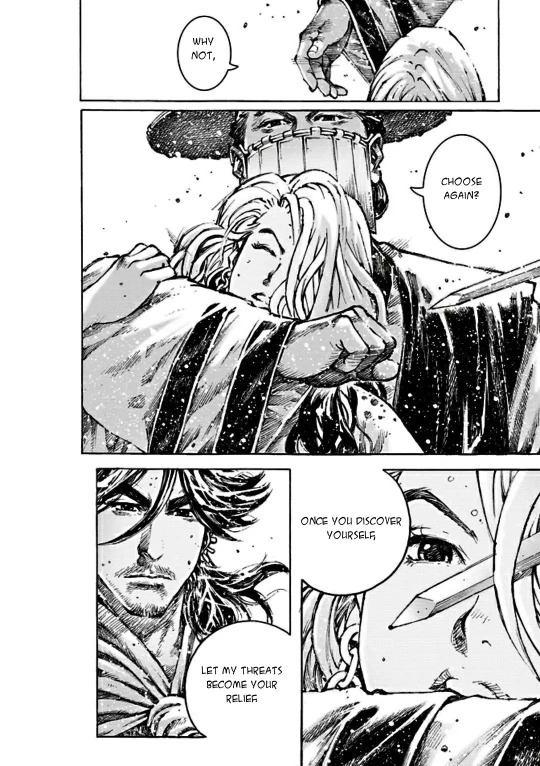
Note: that this analysis will also involve speculations to nail the point that it is centered on the character introduction and that this analysis also includes the opinions of not only me but other members of the community as well.
The first things first, let’s start with the definition of the terms that will be a subject matter in this text.
By nature, contradictions are the details that by themselves prove the wrong of a system that they inhabit, thus efforts are made to avoid them like a plague, as it is strongly believed that any combination of statements, ideas or features will crumble if it consists the inconsistent details – it is considered as an antonym of “confirmation” for a reason. They also tend to make perfect counter-arguments.
Ravages of Time argues that not only everything is consistent, but also from the point of view of the ones that are trying to assert the ideas, said ideas can be built on contradictions, can consist of contradictions, and said contradictions could be used to secure the system. It is still better to hide that fact from the masses to avoid the confusion
(Strangely enough, inconsistencies within the writing of RoT actually enhance its consistency)
A foil of a character, on the other hand, is a tool of the story-telling. It is certainly similar to the “contrast” in artworks, as it is supposed to highlight character trait by placing it near the opposite character train – common usage is the calm and pragmatic sidekick next to the hotheaded protagonist.
In idea, every character can foil any character in the story, so the key part of foiling is the interactions of the concrete personalities. In this analysis, I will explain as to how Ravages’ manages to connect the threads indirectly, through the organic mirroring of the circumstances and affiliations.
Let’s get started.
From the perspective of the governorship or leadership in general, “contradiction” and it’s acknowledgment was always one of the fundamental parts of The Ravages of Time – be it either Cao Cao’s campaign with the image of corruption, which was motivated by greed, for the greater good or selfless selfishness of Sun clan that was aimed at the fundament of the corruption that is the Han dynasty (ironically, against their contradictions) or Liu Bei’s fake image of a saint or even assassin Liu Da who seeks the comforting life through the court by going against himself to the point of forgetting it – everything is chained to the rulership, because that’s exactly what affects everything else.
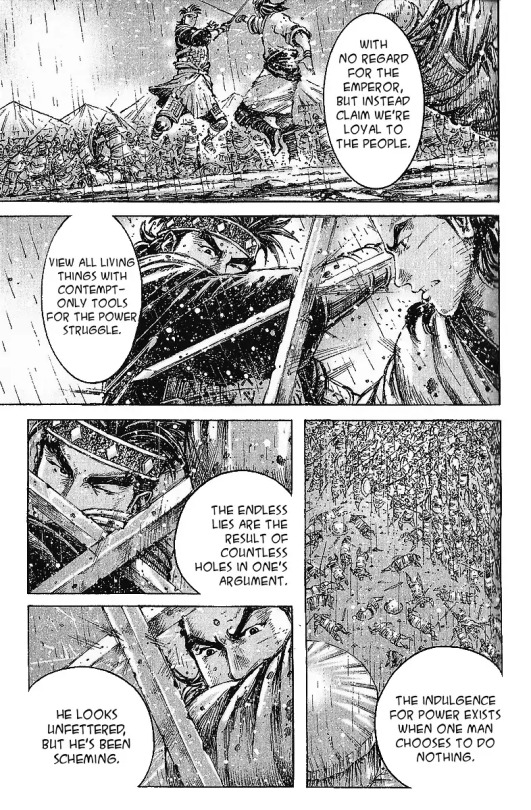
Full embracement of this exact idea – considering how coherent and varied it is with many sides, even when it comes to religion and politicians *cough* LOGH *cough* – is what allowed RoT to stand out among any other war and political drama. And despite the dense story-telling that spans more than 500 chapters, its brilliance is still being polished by not only showcasing the usefulness of this theme, but also the criticism through its shortcoming, which results in the cycle of never-endlessness (and, arguably, the placement of RoT above any competitor, but that’s but a mere meta-talk):
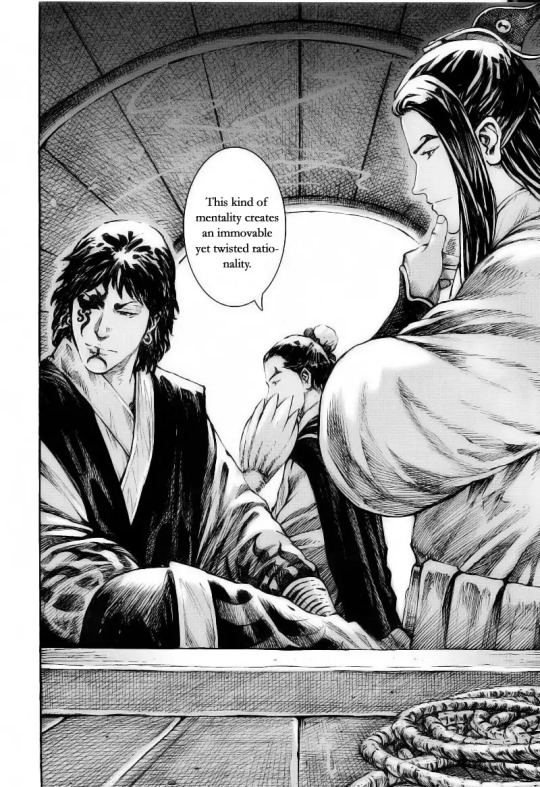
there's the floating text in 372 that appears to praise the down-to-earth approach (associated with Guo Jia) of seeing humans as being more crow-like (with its positive and negative connotations, both nurturing toward their own and vicious toward targets) rather than dragon-like (with associated images of nobility and grandeur), offering the suggestion that perhaps the thing about humans is that they aspire so much (and as it's insinuated, cause so much trouble in the process) without realizing their station and limits and how such ambition and greed are nonetheless part of how they are in the world
now it's not made completely clear how this monologue is connected to Guo Jia's stances, but perhaps one way to establish the link would be to assume that if Guo Jia doesn't have a lofty view of humans, he could embrace the path of ruthlessly carrying out the reforms one insists on (never mind if others accept them or see them as virtuous), hoping for the best that perhaps at the end of the day things could work out (and someone could pick up the pieces the morning after once he's gone and this is where Xun Yu is supposed to come in, the comfort after the chaos)
what Zhuge Liang takes exception to is the notion that the comparison of humans to crows (even if it's a useful corrective to the boastful comparison of humans to dragons) somehow justifies the brutality of the process of pacification... thus the counter retort that people are people, crows are crows (of course this too assumes that Zhuge Liang knows better about what it means to be human)
and this brings us to the 'immovable and twisted rationality' that Zhuge Liang decries (even if he concedes that some sort of peace that is to say the peace of a pacified population desperate for anyone to impose clear order and guarantee safety can be founded on ruthless subjugation as historically attested in the rise of empires and regimes)
Guo Jia (and by extension, Jia Xu and Sima Yi and others like them) wouldn't mind exploiting and perpetuating that rationality so long as there is a convenient path to quelling the unrest (which they see partly as a result of greed and ambition that form part of the human condition) and putting in place some sort of reform to help manage the chaos
on the other hand, Zhuge Liang still believes that humans can be guided and governed by virtue, that loyalty discourse can be used not simply as a cynical method to prop up the ruling order, but as a moral principle that prevents needless bloodshed (yet he finds himself in the compromised position of having to wage bloody crusades but under a righteous banner)
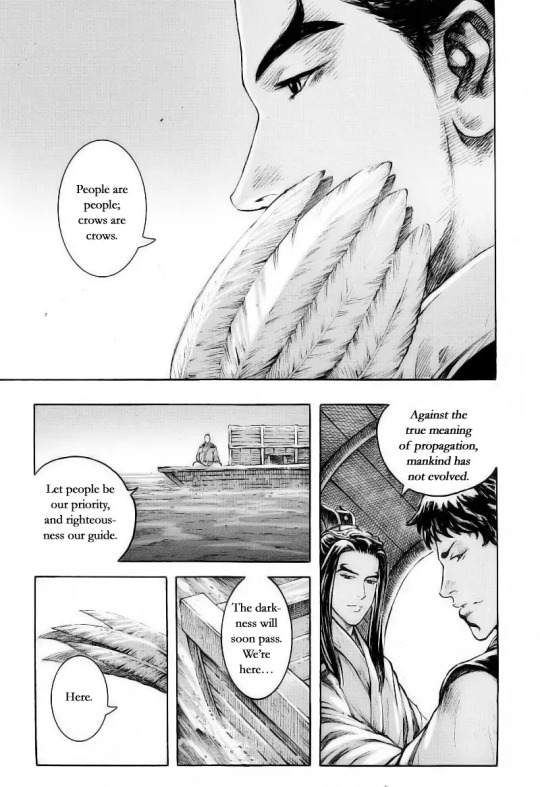
This basically serves as a set-up to what will RoT shift into and who will be the main actor of the following arc. So, in the same way as Zhuge serving as a foil to Guo Jia, the Eighth Genius is being introduced in his arc and the Eighth will even get focused in the following arc. In the Red Cliff arc Eighth did exactly what Zhuge was doing prior to active participation – judging the conflict and “reporting the weather” – and yet he fails to predict the seventh (well, at least, he waited longer). This dynamic will be further established at the end of the Four Commanderies arc and as of now, we need to completely dissect 8th’s introduction, to have a deeper understanding of what will their discord stand for. All in all, each and every sentence uttered by his mouth is quite worth the attention.
at this point, Zhuge Liang outweighs the 8th in terms of reputation and narrative placement (not to mention that throughout the series, Zhuge Liang has been the one guy most in touch with the rest of his classmates on the sidelines and the one guy the other classmates either admire or dread or want to compete against), though the 8th's status as a shadow counterpart to Liaoyuan Huo (because of the Zhao Yun angle) makes him parallel Zhuge Liang (who in turn serves as the mirror collaborator/nemesis to Sima Yi) in one respect in that both have strange ties to the eponymous duo of Ravages
in addition, the 8th parallels Sima Min (in being the last and shadiest on the list of 8 illustrious names) and possibly the 8th eccentric (assuming this member shows up and fits the pattern), and in terms of outlook he can be compared to Yuan Fang
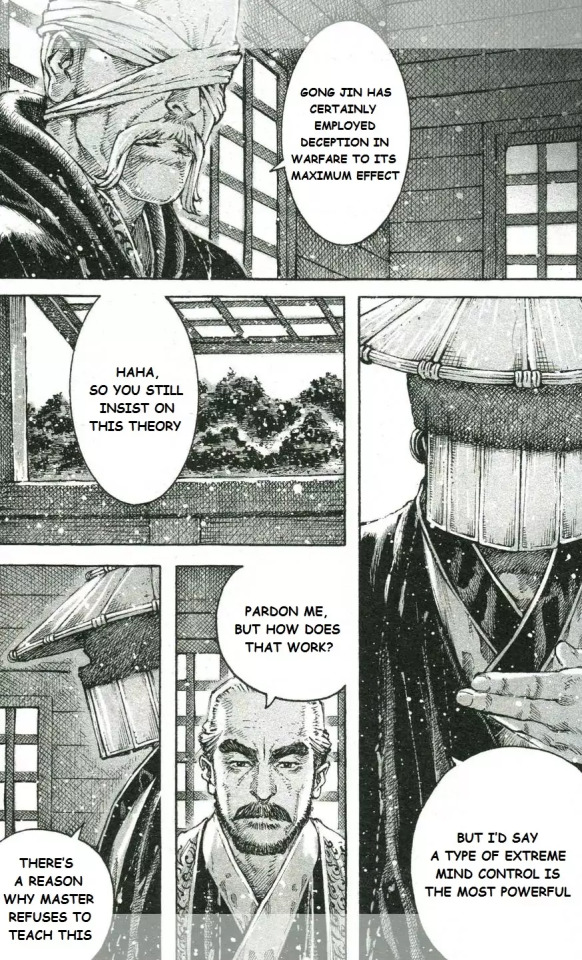
Another thing that we need to pay attention to in the Red Cliff arc, though, is Eighth’s interest in mind control (as we know, character introductions In RoT reveal a lot about the characters) – as Water Mirror says, to subdue the enemy without a fight is the strongest method of war, but the eighth insists that the method, that the evil cultists are so infamous for, is actually the most productive one (probably because avoiding the war merely keeps the people safe, but is not satisfying – it is not doing anything to enhance the condition of them, as it won’t save people from themselves), but even if one won’t give in to the temptation and derail from the bright path, these techniques are leaving everlasting negative effects on person’s mind.
So, if we were to speculate, the most likely theory is that the Eighth learned said methods, which ties to another theory of him being the renowned scholar named Zhang Song (that being said, I'd rather see Zhang Song as another character altogether (whether the 8th takes that alias later on or just cooperates with him/them since I'd rather see duplicated names than merged characters)), but let’s talk about later on.
But… why and when did he betray the expectations of his teacher? The first one is rather easy to guess. It is about his ideology of individualism – instead of waging meaningless wars with tons of unrecorded blood being spilled, which would also limit everyone else’s desires and freedom (represented by Fang-er), that comes from the natural craving to the anarchy of human nature, whenever it is caged in order, why not exploit and weaponized and control vices and viciousness of a person? Instead of forming a collective mindset, why not try to understand the mind of every single individual? Instead of relying on brainwashing through moral propaganda, why not have faith in inherent human selfishness?
Him being an assassin resonates to this idea very well, because he is doing everything on his own and is not commanding a mere group, collection of people. He is doing things alongside them, understands them, and is, in fact, closer to reality than other classmates. Sure, Zhuge, too, understands the nature of his surroundings, but he is still a man of principles and his viewpoint is stuck on that – growing colder to actually personal human interactions and yet he is the one who values a human life the most (this mirror’s to 8th’s apathy, despite him acknowledging the personal desires in an individual)
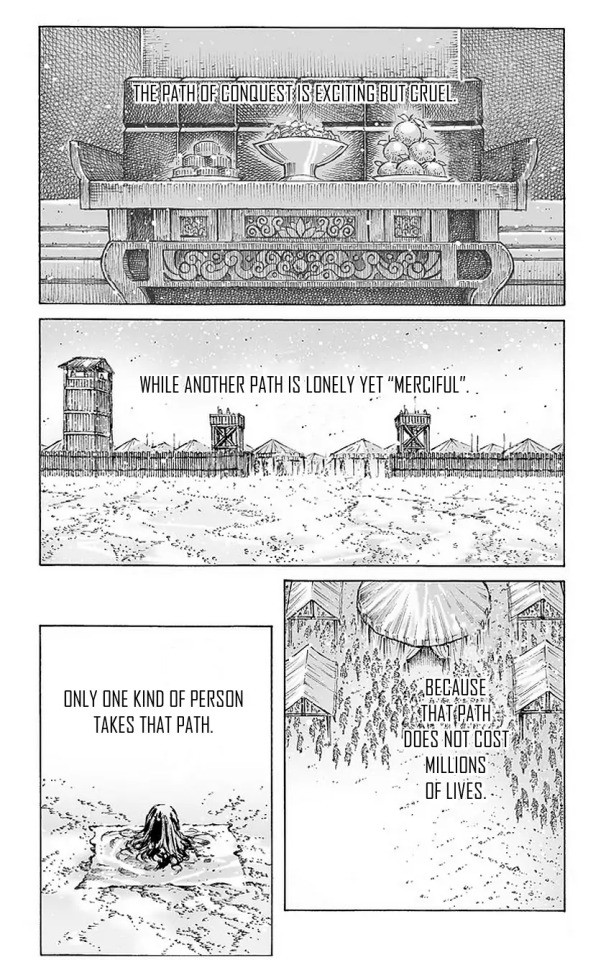
To be fair, he is more of an assassin than any other character with the same profession in this story, because he actually lacks identity as nobody knows who he is if he won’t reveal everything by himself and, funnily enough, he is free to hide his identity even if he were to choose a warlord (also, he does not really HAVE TO be devoted to any of them and choose as many he wants to choose for the sake of his plans, which would mirror 7th’s “devotion until death”) and he could attach to himself whichever identity he wishes. Lack of identity was fatal in the hands of Sun clan and lethal in the hands of Sima Yi, whereas they still had some kind of connections, so now imagine how peculiarly promising is 8th’s potential, who does not seem to have any attachments.

I may as well rightfully declare that his lack of identity has a gargantuan perk to counter the cynicism of history – Whatever he does will be judged by future generation’s own assessments, yes, but if 8th’s real identity remains unknown, no one will know to whom they are supposed to connect all of his actions that he committed with the identity of others, hence the perpetual inaccuracy of historical records. Akin to Yuan Fang, who is an original character of Ravages of Time (the difference being, that if Yuan Fang has an original identity, 8th can “grab” identities of actual historical figures and get away with it)
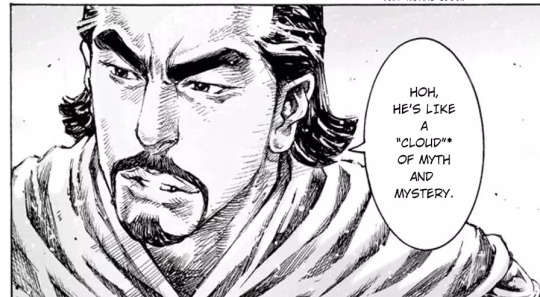
As the last student, of course, the similarity with the first student Yuan Fang (well, his “lord” was chosen instead of him, by being a son of Yuan Shao – that selfish romantic really had no chance to CHOOSE to live for himself with his loved one, huh?) is apparent. Aside of the fact that Fang was connected to the cultist, he was also trying to practice the art of survival, (which he did not manage to perfect, thanks to his daddy) and even being able to kill people by his own hands (as much of a prodigy as he is). But ironically, (which can also be considered as a contradiction) the simplest desires are the root for the grandest ambitions and at the end of the day, Fang proves this point of 8th that self-serving desires may even seduce someone to achieve grand visions, he is delving into the corruption, rather than taking care of “his” people individually. And, after all, 8th does not really resemble to romantics.
Well, it won’t be fair if I do not mention that Zhuge (by torturing people) and Zhou Yu (by being a sparring partner of Sun Ce)… and even Xun Yu (by slapping a wolfneck)… are more than capable of doing some things by their own hands.
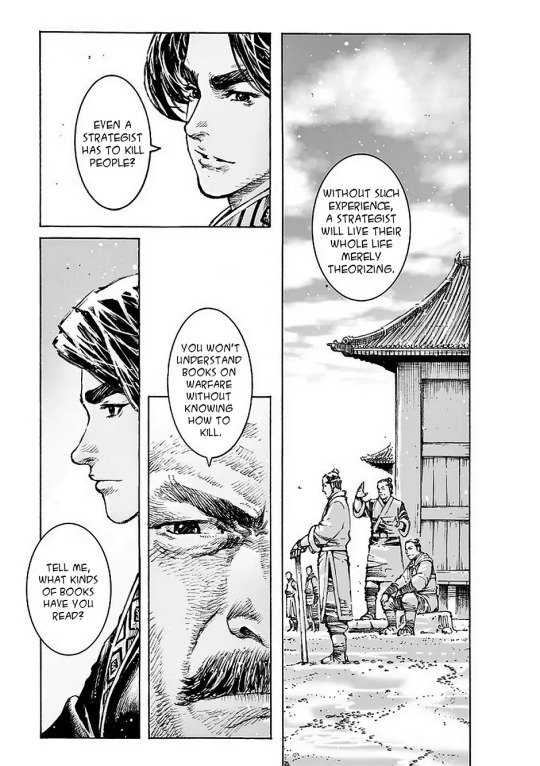
So far we can feel free to say, that 8th is not being seduced by desires (take a shot every time the eighth contradicts himself and yet never stops making sense) and he is a quite unemotional human being, considering that after the death of his oath brother he did not really look affected, remained perfectly calm and rational – basically took a duel out of respect and Yun’s lack of stamina. You could argue that he had his mask on, so it would have been hard to notice his emotions, but he instantly gave orders of retreat after the death of “the lord” and it was also implied that he does not really connect well with others.
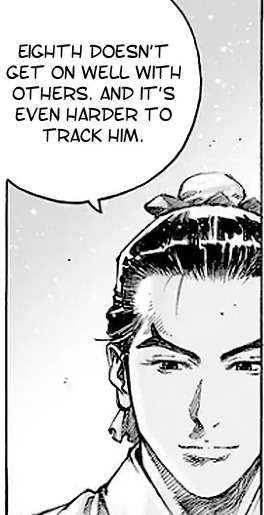
He wears the mask of a caring person, while Yun wears a mask of an uncaring person.
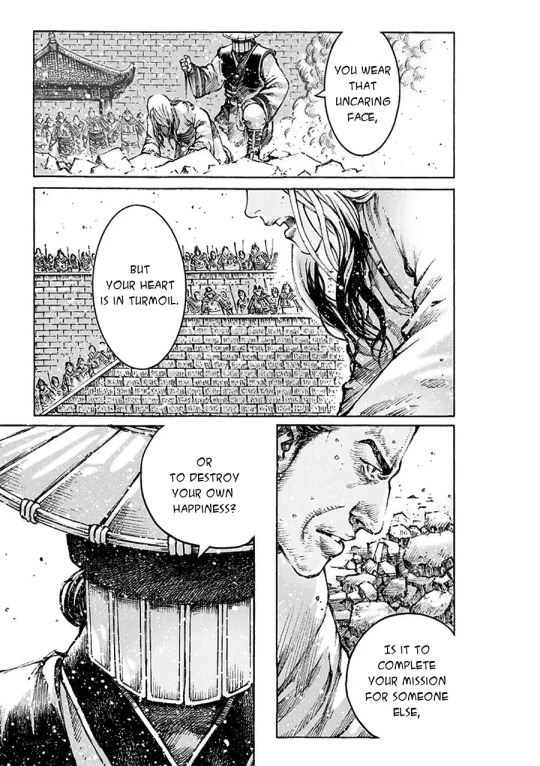
(Honorable mention of his ability to rapidly adapt to the situation – which should be coming naturally to a person who is a good judge of double meanings (pointed out by his hand signal first and then by “he discovered the secret of various books in the world”)
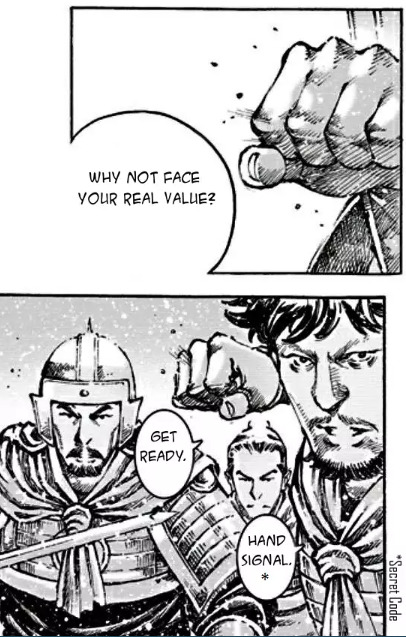
It is quite fascinating to see such a person to be aware of everything and be appealing. In some mediocre stories, he would have been extremely childish and overdramatized at it, lacking any kind of human decency. On the contrary, 8th respects his enemies, is quite affable, acknowledges the contradictions within the human nature and acts according to it, and does good deeds for others (“repair your shed”), even if not unconditionally – as he is a morally grey character, and not ham-fisted at that.
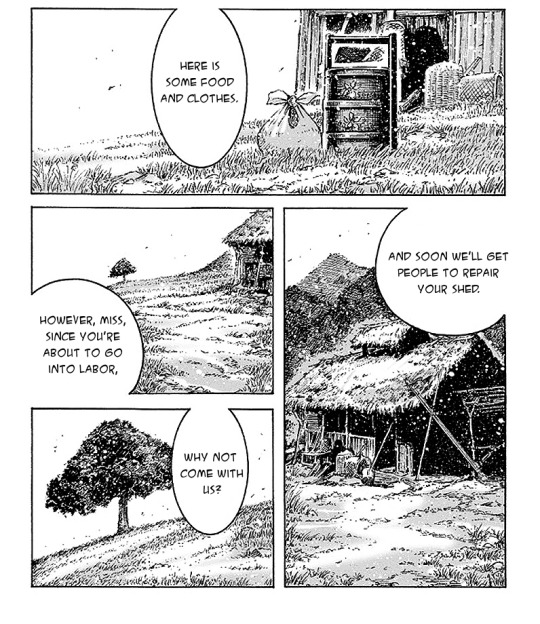
This brings us to another philosophical part of his views – the value. “Feel helpless all you want, it won’t do anything for you”, every individual has their own, but to attain said value they first need to realize what their defining uniqueness is by themselves, instead of relying on either someone else or heavens and then act on it, make use of it. They must make a choice whether they will be “childbearing” tools or… weapons. To me his reaction (or lack of thereof) to this line of his oath brother “undertake its duties when called to the office; retire otherwise” felt like he (oath brother) completely lost the value in his (8th) eyes, by not only being enslaved to the whore for naught all these years, but also clinging to the brother (when he could have just let the woman infiltrate Shu). This page here can also be easily interpreted as if someone should trade their own valuable people, but it can also mean that people should see the value in whatever they have, whether they be items or loved ones, and cherish them.
So, in short, you do not need to imagine yourself (self-delusion) as a god-emperor to give yourself the value and be content to live.
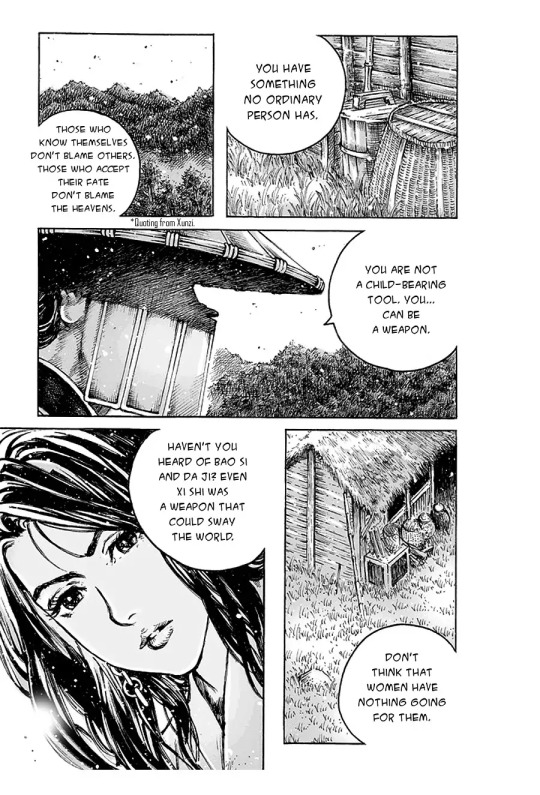
Above we discussed how 8th is encouraging and guiding others towards seeking the value in themselves, but that is not quite all, is it now. Sure, you find value in yourself and the people around you, but the said value needs to be defined by something. To apply 8th’s standards, the more benefit is from someone, the more is his or her value. And even if she was merely being traded for a lovesick man, she still had some value in her.
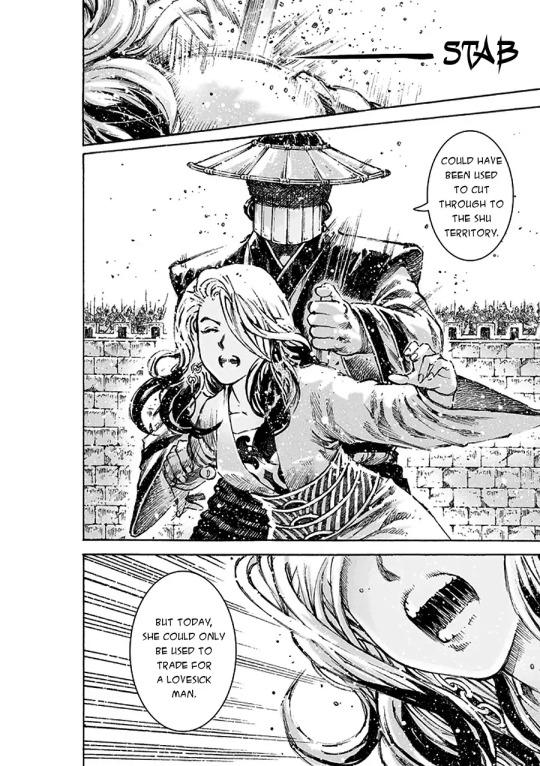
He is acting as if he does not view people as objects, Yun is acting as if he does not view her as a loved one (material value against the emotional value)
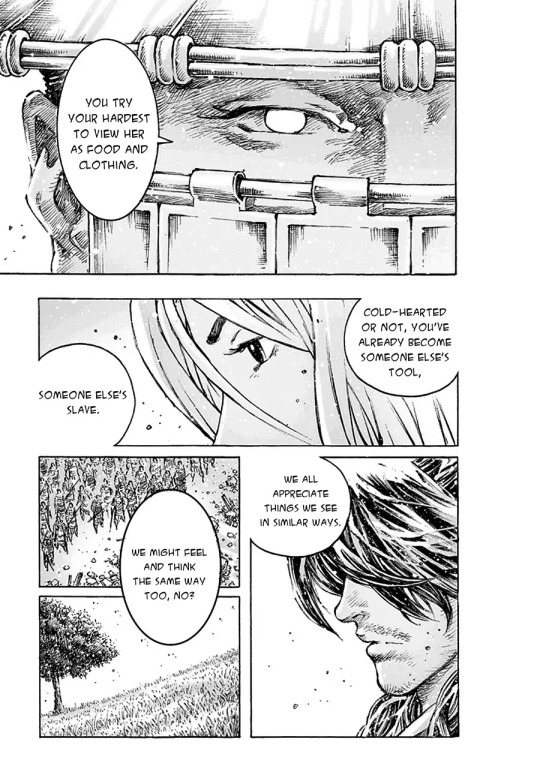
Infiltration of Shu is quite obvious with all of these details and that freely be interpreted as if 8th is focused on Shu, but we could also take it as a hint that he has tried and may still be trying to plant some moles in other factions as well.
In addition, he usually talks whatever is necessary without much care to his actual intent, which not only results in an interest rabbit hole but is also a very intriguing character trait and a means of manipulation. Reason for that being the fact, that most of what he is saying is actually… true. Yes, his words are self-serving. Yes, his words do not reveal what his actual motives are. Yes, he is purposely aiming at your most vulnerable topic. But he is the only one telling you the truth about yourself and he is the only one giving you the freedom of choice towards what you crave.
The beauty of the 8th Genius' dialogue with Zhao Yun to me is that, despite all of his words being self-serving, they were probably the most honest words Zhao Yun had ever heard. Even Liu Bei or Sima Yi never mention the fact that Zhao Yun has essentially been a slave all these years, who has given up on his happiness to fulfill the wishes of others. And yet here comes this unknown man who manages to get to the very depth of Zhao Yun's character in a mere couple words. And to make it even more beautiful, Zhao Yun faces these words that cut him to the core head-on, and not only acknowledges them but in the face of these truths and in the face of a final chance at his own happiness, he chooses again to remain a slave for the sake of someone else's desires. And that's what makes the 8th Genius so enticing to me. If he can get to the bottom of such an enigmatic character like Zhao Yun in his very first appearance, I can only imagine what he'll do later on.
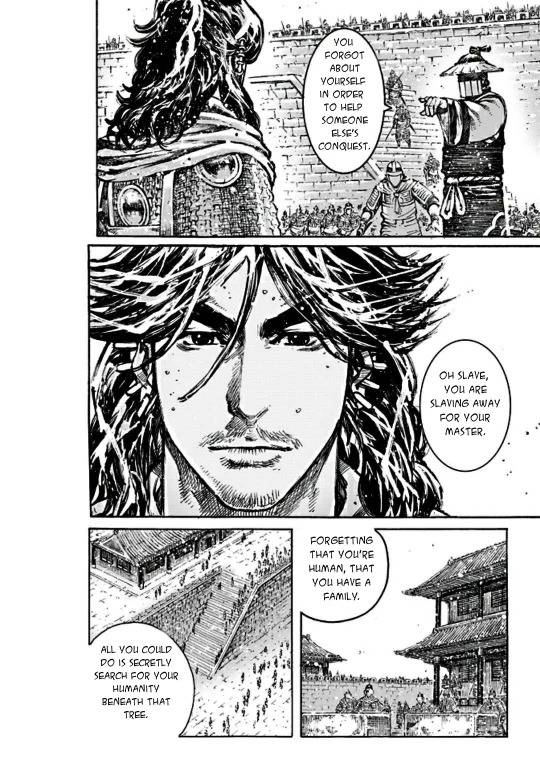
Though I have to note that the 8th isn't the only one to have confronted Liaoyuan Huo with a dilemma... Zhang Lei sort of did that in 293, Liu Da offered something similar in 384 (the difference I suppose is that whereas they challenged Huo to choose between 2 masters, the offer of the 8th, even though less genuine, is for Huo to choose between serving a master or walking away)
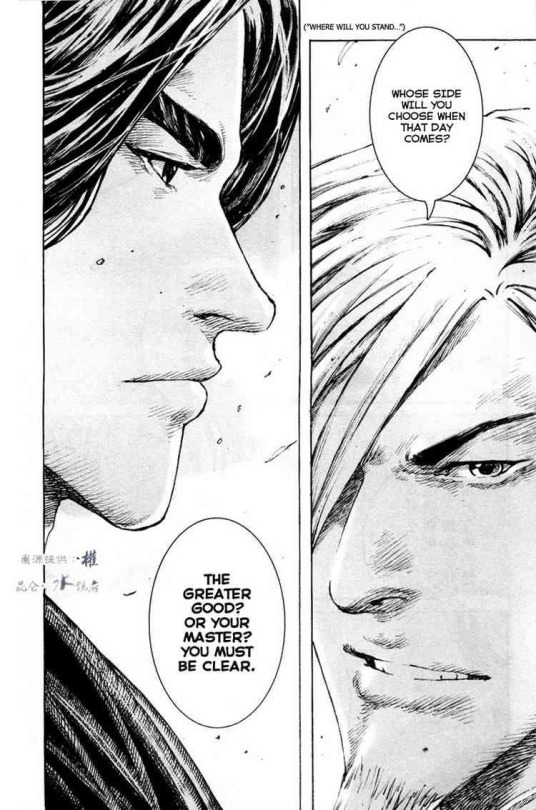
in another note, it's important to stress that if warmongering is the problem (especially if we consider that what usually happens when regimes wage war as a distinct form of mass conflict unlike popular uprisings and insurgencies is that pacified populations are coerced or cajoled into expending their labor and lives to feed machines of organized violence that mainly benefit a select few) it's not a matter of who wins or loses since the game itself is rotten regardless of goals and intentions
Alas, one other issue is that many cut ambitious conquerors (especially if they exhibit charisma and are on the winning side) some slack, while those motivated by ideology or principle (especially if they're losing) are selectively denounced as zealots for trying to push a program
And yet who doesn't like heroic tales…

That’s how the 8th stands out among his classmates mainly in terms of how his rhetoric focuses not so much on principles and ambitions (even Zhou Yu's attachment to the Sun clan involves sticking by some notion of continuity), but simple and personal desires and choices – which fits the narrative of the Four Commanderies and analogically makes it stand out among the other arcs. It is an arc, which highlights the how empty is the shell of people, who are getting defiled by their own egos or thorny roses, beneath the surface of their facade and how some of them stop, start listening to the voice of reason and thus develop into respectable men while maintaining their individuality. The unconventional part that elevates this arc into being a masterpiece is the fact that even protagonists may have a facade and in overall, not every facade is shallow or/and they do not serve solely the corruption.
Sure, I talk a lot about the comparison with Zhuge, but these details were brought from this exact arc that is not even focused Zhuge, but aside of masterfully crafted indirect hints, Four Commanderies put on a table way more than just that. The obvious one being the personal conflict with Zhao Yun, which I already mentioned:
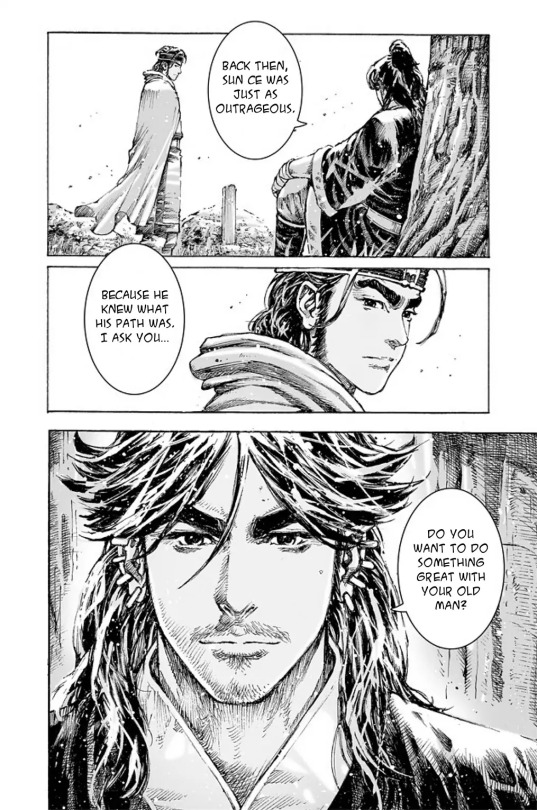
There 8th “asked” Yun to choose what’s his actual happiness, his own life or someone else’s path (that is burdened with failure) – little did 8th know that from Yun’s perspective it did not really matter what he would have chosen, because of how both of these choices are important for Yun as a person, how both of them are what he is craving for and how both of them are going to enslave. And he can’t even choose to not choose, because he would be going against himself in ANY case. As cold-blooded as he is, Zhao Yun got numb by making the best possible choice – “Three days. More than enough”. Truly, 8th failed at psychological warfare (and even if had an upper-hand in a duel, it did not really matter), but admitted that Yun made a right choice, without explaining himself – I think the existence of Zhao Tong made the choice correct. When a father and a son met, both of them found their “pieces of jade ornament that can be traded for cities” (note how Yun compared his son to Sun Ce – that was rather delightful for Tong, considering that no one was taking him seriously whenever he was comparing himself to Sun Ce). That was quite well symbolized by the lively tree near Yun. Usually, whenever a life-changing event happens in his life, he is near a dead tree.

After all, Zhao Yun is already used to selling.

So many lives that he cared about are no more, what’s one more.
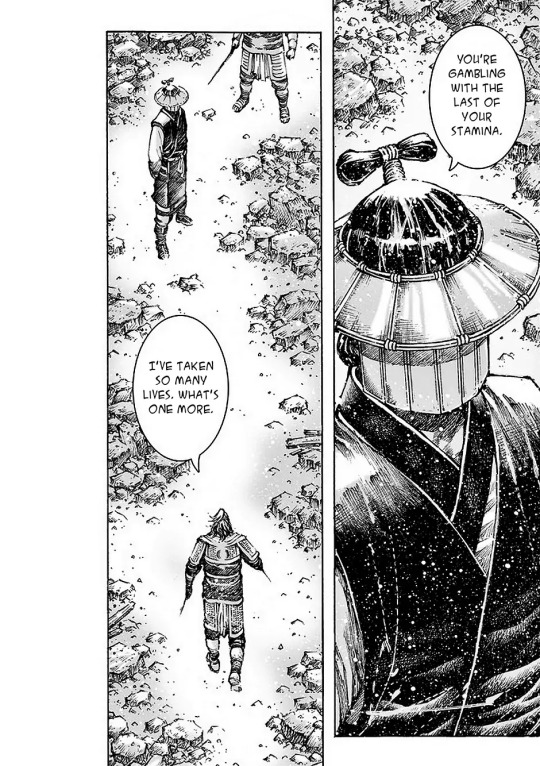
(And if I were to fanboy over him more – “Huo” did not really return after the warrior’s duel (named as “a path of no return”))
Briefly to come back to Zhuge, the one who basically pulls some strings behind Yun – when 8th mentioned the facade of the “greater good”, I was suddenly reminded of a saying by melancholy 7th about “benevolent realists” when he was talking about how people like to shield themselves with “FOR THE GREATER GOOD”, while in actuality they are masked egomaniacs. But if Zhuge says that people use “greater good” as a mere excuse (as he always dislikes the certain type of people), 8th remarks that these self-proclaimed paragons of virtue (such as 7th) are merely deluding themselves and the concept of “greater good” does not even exist.
In short, lying to others that you are a savior vs. lying to yourself that you are a savior

If you think that the introduction of this character is already great enough, you need to get prepared, because the revelation, that completely recontextualizes these events into something even more meaningful and profound, is yet to come.
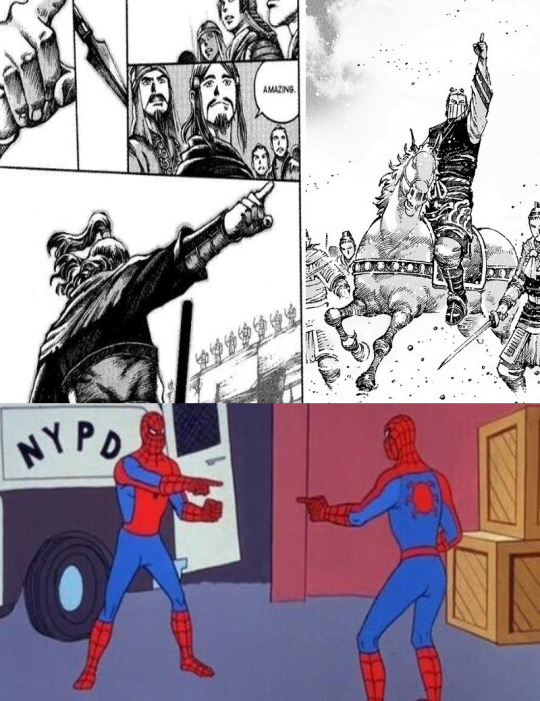
When Yun remembered the bits of 8th’s backstory from his memory, 8th pointed his finger to the sky, a call-back to that scene when Huo was named as Zhao Yun and that, as far as we know, cemented him as the perfect foil to Zhao Yun and now demands from us to re-analyze this precious arc of his as the mirrored life of Liaoyuan Huo from two respective points of view. Considering the fact that Ravages of Time is exploring the history and human condition as a theme, then it won’t really be a surprise if I would define “mirrored life” as if they were the alternative versions of how would Huo’s life continue if he were to choose different paths of life.
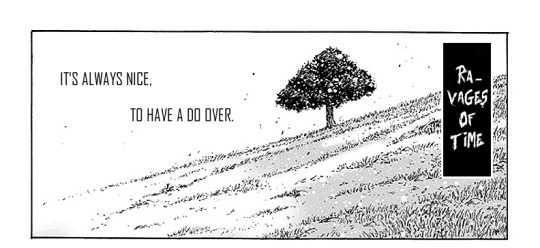
1) Zhao Fan’s case is rather easy to elaborate on. He represents the “pretentiousness” (by compensating his lack of masculinity and love from his loved one, through the pretense of just babbling hollow words (merely citing others), as he is not capable of doing anything else) against the “reality” of Zhao Yun (less talk, more action attitude of his and plus the playfulness that is hiding the coldblooded nature beneath the surface).
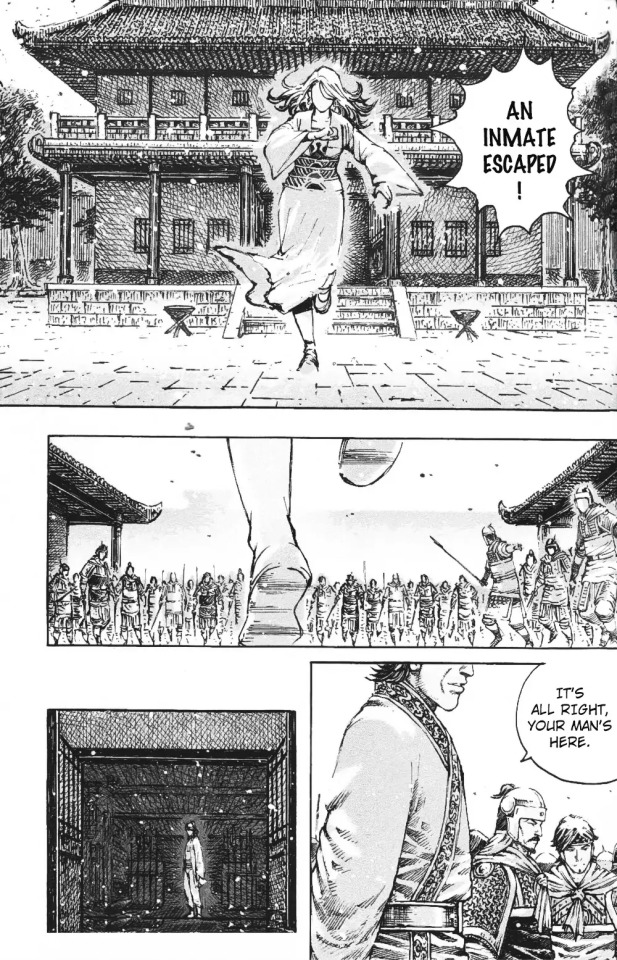
That pretentiousness would define Zhao Yun as well if he was not so hardened by the high amount of struggle he lived through and later be polished by Liu Bei. Huo would have been in his place if he were to come to his loved one instead of Xiao Meng. But that would come with its own negative consequence, as he would not have been loved.
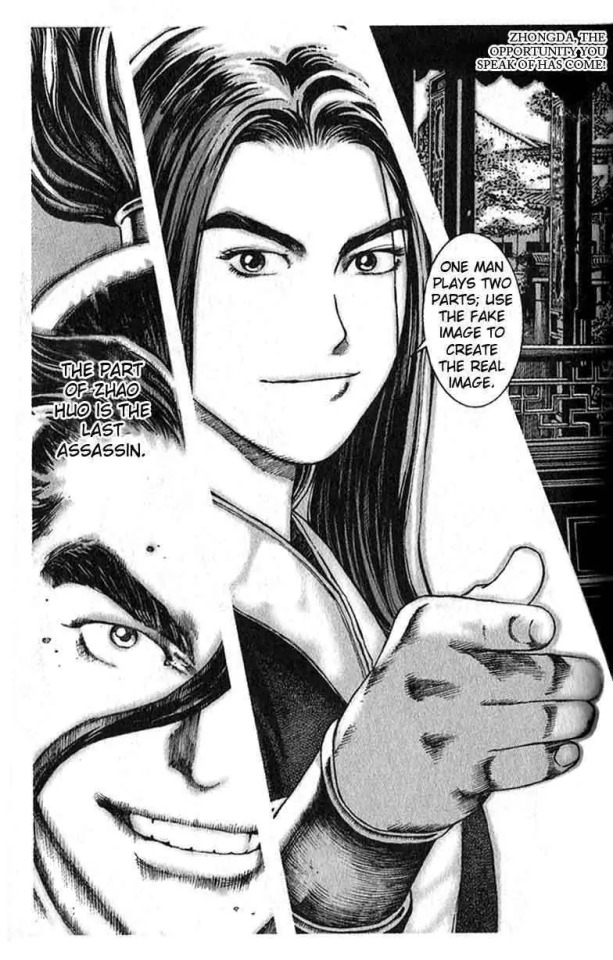
2) 8th’s case is a bit complicated. They do share the path, but with the polar opposite approach. “Sharing the path” is amusing on its own right, though. Huo took the name “Zhao Yun” and will get recorded in history with someone else’s name, but the guy who was born with the name “Zhao Yun” won’t be recorded in history with his own name as well. Still, his name will exist in history, but it is going to be a guy, who’s completely different from the original Zhao Yun. Talk about an identity crisis.
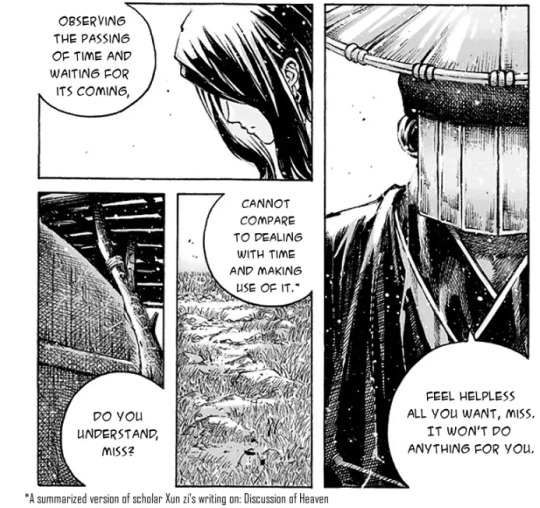
“observing the passing of time and waiting for its coming, cannot compare to dealing with time and making use of it” – This throws us back in time, as far as the early chapters go, when Yun had an internal monologue about waiting for someone who would change and save the world. Around that time, 8th was persuading Huo’s loved one about how meaningless it is to just wait for something. Perhaps Huo would have undergone 8th’s path if he were to study as a genius to save the world instead of waiting for someone else to do it, but at the end of the day, he managed to understand where he belongs to.
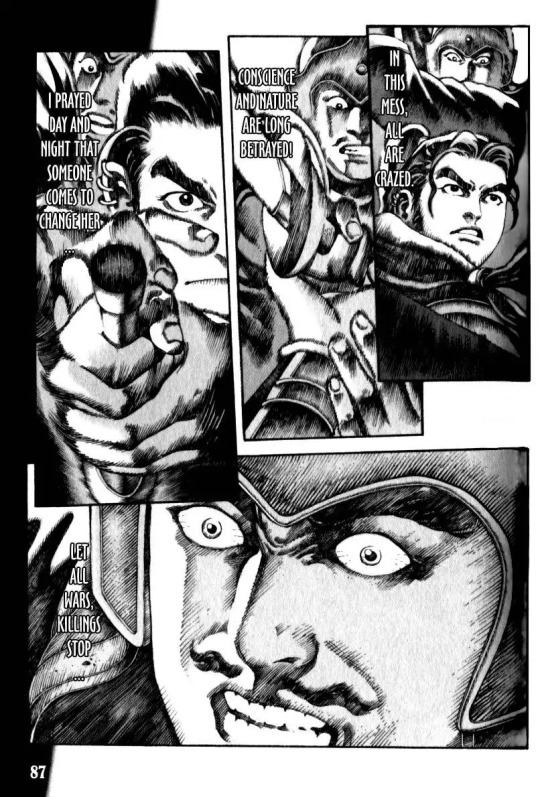
Huo was waiting because he did not see himself as someone who could really make a difference in the world (“if martial arts would have made a difference, then the key positions in the world would already be dominated by various schools”). Meaning, that only “grander” things affect the world (such as Jesus and Dragon). but 8th begs to differ, with an argument that the delusions of grandeur should be broken for people and that even “books”, as tiny as they are, can affect the masses (for example, how Sun clan was hiding the true Art of War for themselves)
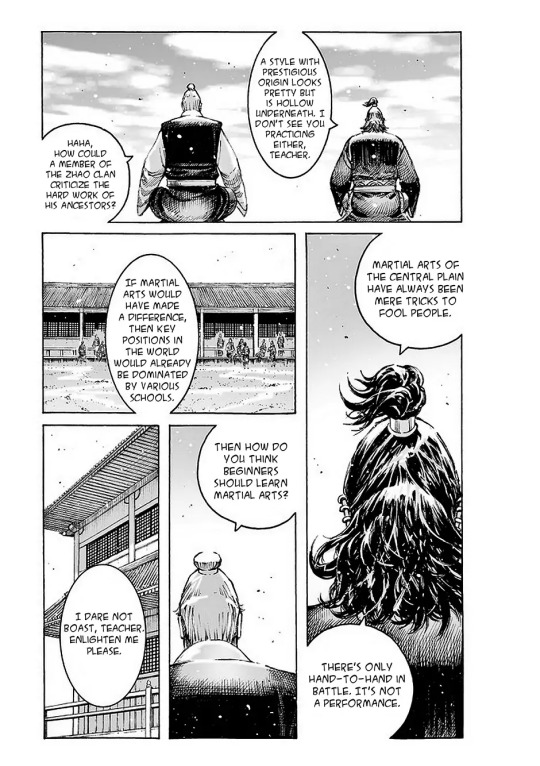
“what we need to learn now is observation and patience” – still paid off in Huo’s case and so it did for another Yun as well, as he was busy all these years, observing not only the human nature but the hidden meanings and uses of certain things, such as the literature as a tool of lying (“you won’t understand history without knowing how to lie”). This also foils how Zhuge was “waiting” and cultivating the illusions about Liu Bei for all these eleven years.
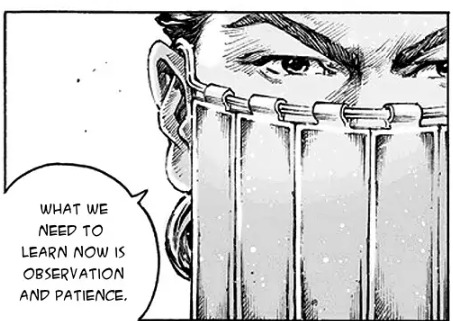
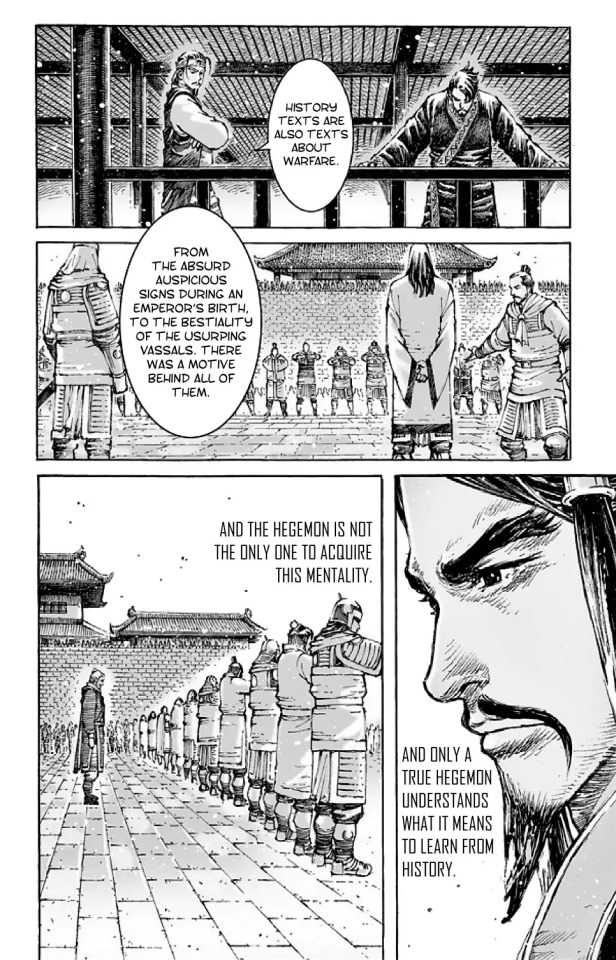
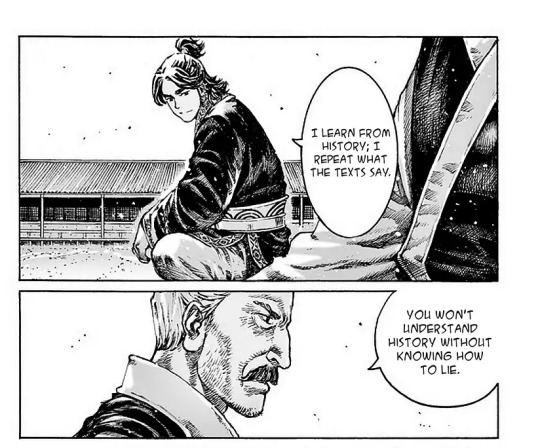
It is quite ironic and contradictory when 8th is talking about how important it is to know “where one stands” and yet he lacks identity and that helps him to stand (“infiltrate”) in any faction, at the same time. But us not knowing the identity of 8th further empowers my approach. Matches well with Huo trying to suppress his emotions and forget himself, thus becoming numb and losing his identity, as he won’t even get credit for his heroic deeds.
Basically Zhao brothers can be seen as the Yun’s identity crisis, a conflict between his duality of nature (Fan – wanting a normal life with his loved one. 8th – wanting to go with Liu Bei). And Huo killed Fan by his own hand, so killing the “longing for a personal happiness” also took a life of his loved one at the same time, by 8th mirroring his hand.
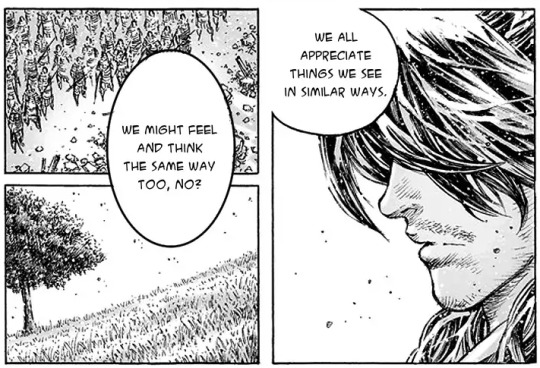
(8th casually hinting that both of them are named Zhao Yun)
The point of mirrored life is that he was always suffering, is currently suffering, will continue suffering, and would have suffered even if he were to make different life-changing choices in the past. But he will continue to live and will carry all the weight, as he already accepted it. It is as realistic as it gets – no matter what you are going to choose, the history is going to fix itself.
As to how similar 8th is to Liu Bei, we can talk about that right now. Meanwhile, 8th was judging the character of an assassin, Liu Bei was also being busy by judging the character of another Zhao and that, you guessed it, allows US to judge 8th as the mirror of our Chinese Jesus as well. To begin with, it is implied that both of them have two oath brothers so that comparison is not really far-fetched.

On the surface, both of them are good at judging the characters and while they are at that, none of them are using their real identities, but the substantial difference between them is that – Liu Bei is using the identity of being the cult of a personality, while 8th is not using any identity at all; Liu Bei is giving away a sincere brotherly love, thus gaining help from them on their own accord and that is something 8th is alien to (Zhao Fan was enslaved to his desire, rather than the aspiration of his brotherhood).
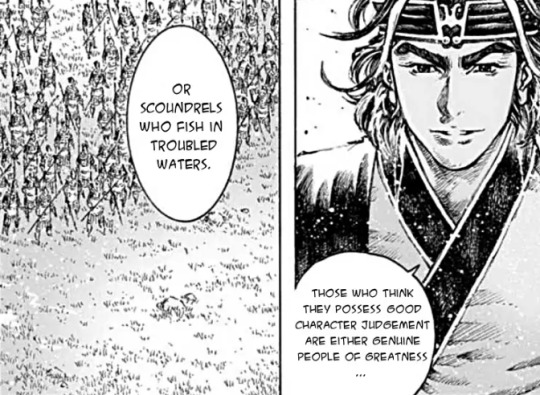
Now it should be noted that even if Liu Bei is getting a warm love and help from his oath brothers is a good thing, of course, Chen Mou has not forgotten that even such kind and heartfelt intent/actions can be harmful to the lofty aspirations. I also daresay that there is a great potential of showing the enormous flaws behind saving the world as a cult of a personality.
The first is directly connected to the relationship between the “savior” and the masses – there will be a part of people, who will have an urge to completely become reliant to the “shelter” that was provided to them and not only lose the sense of individuality in the process, but also get so soft in the process that they won’t be able to stand on their own again so easily.
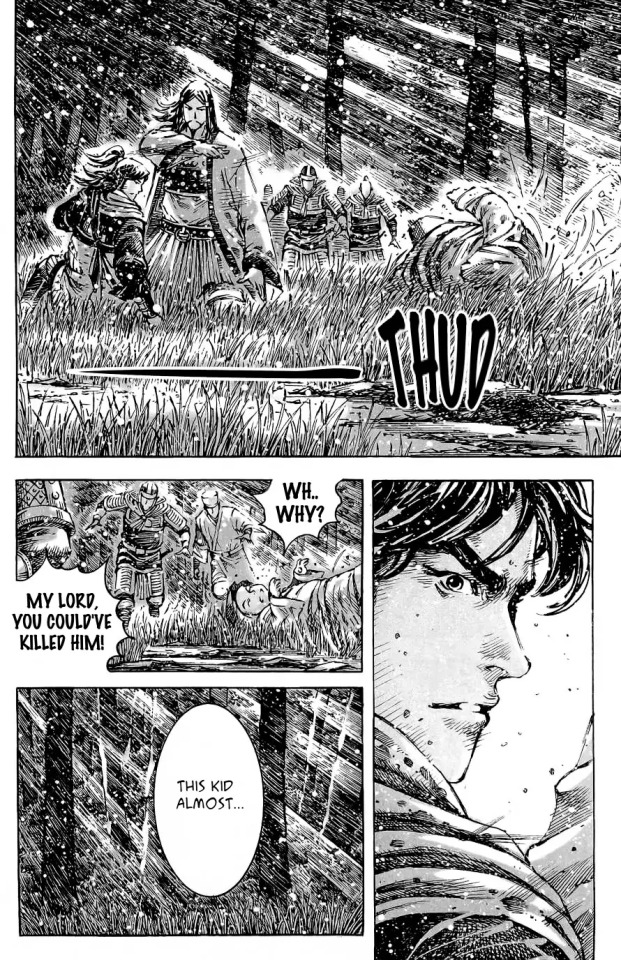
The second problem comes exactly from that and both of these could be depicted in RoT through Liu Shan’s character arc – for the world to be shaped as in the eyes’ of Liu Bei, he has to alienate himself from the garden of earthly delights and the human beings themselves, thus he himself will become a tool, who will only be able to care about his comrades-in-arm. After all, he values them more than his own son.
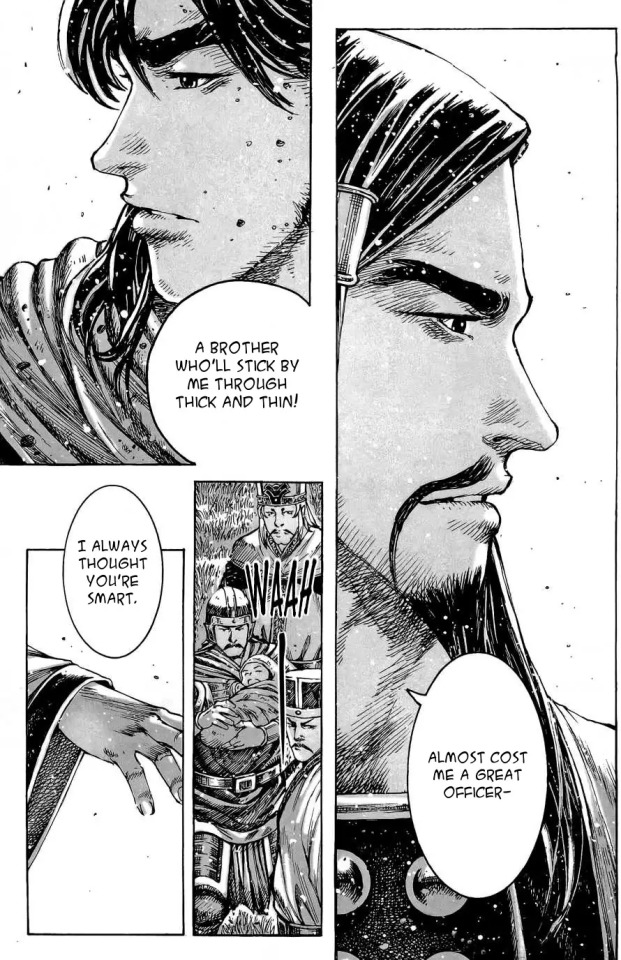
Right in the queue is standing a dragon (aka, not human) Zhuge Liang, who will also drag Liu Bei’s son to the moon. Moon of course represents the principles of Zhuge Liang and he is going to nail them in Liu Shan’s mind so much, that there will be no one to take the child on earthly adventures to gain necessary experience about the reality and human interactions. After all, Liu Shan is neglected to the point of being used in schemes even as a child. Although the role of Sun Shu in this ordeal is still a mystery.
One thing is clear – without Sun Shu, Liu Shan is going to become an anti-thesis of 8th’s ideology.
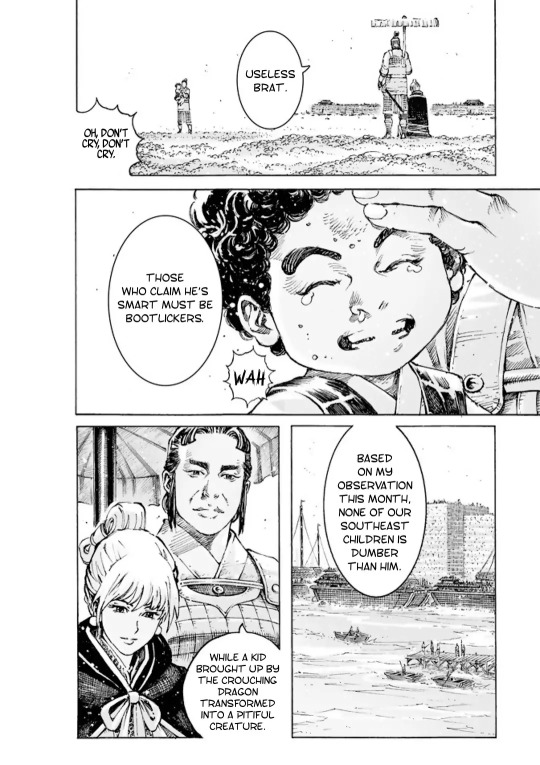
To have a clear idea and understanding of what I am talking about, you could always watch that Ghibli movie named “The Tale of the Princess Kaguya”. The Emperor there is so out of touch, he is not even aware that he should not touch women without their consent.
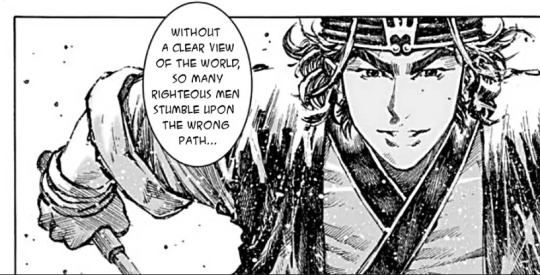
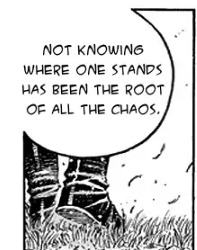
8th’s ideology won’t result in such degradation, but Liu Bei has his own arguments against that world-view. If 8th blames people for having the delusions of their own grandeur, Liu Bei says that people have delusions not about their own selves, but about the world itself, as to how it is “structured”. So, people are not defiled, they are just following the wrong path and guidance could fix that. Zhao Tong depicted as someone who is not being as educated and well-read as Liu Bei further nails the point.
(Thanks to the translator Merc, who told us that this idea was conveyed through the wordplay that was lost in translation)
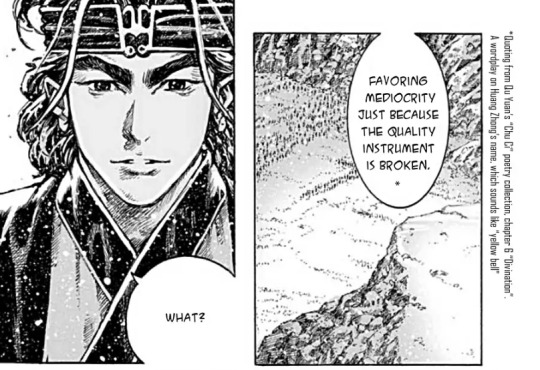
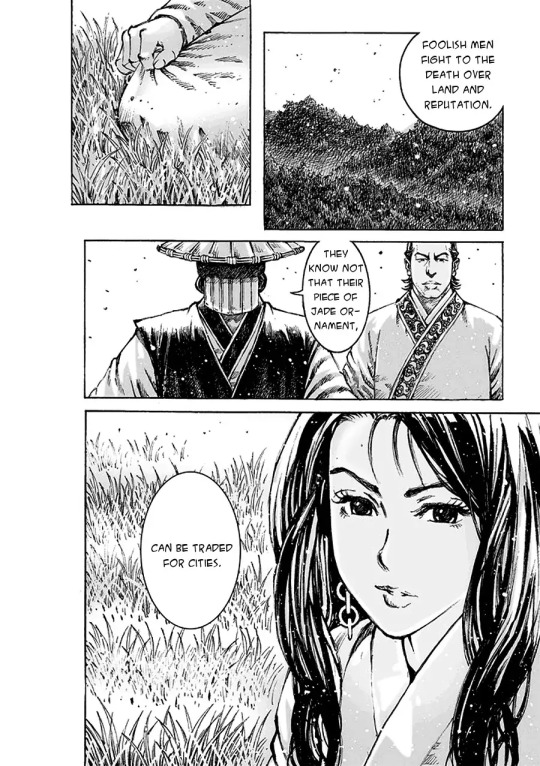
Surely, they won’t settle about the definition of the right path so easily. If 8th thinks that people should start valuing whatever they have and whatever they are able to do. Basically, the idea of saving the world won’t ever be fulfilled, because the world will only be saved after people save themselves – Liu Bei answers that one does not have to choose necessarily a mediocrity (in 8th’s case, broken people that he chose, such as Xiao Fan) and give it a value, just because the world in their eyes is ruined. Basically, gems still can be found in every corner, but they won’t polish themselves, so the world is still worth saving and could be saved if only we showcase what they can value.
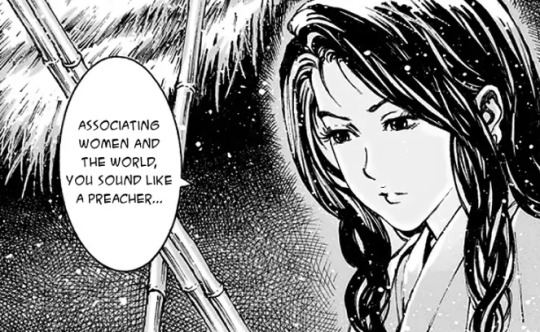
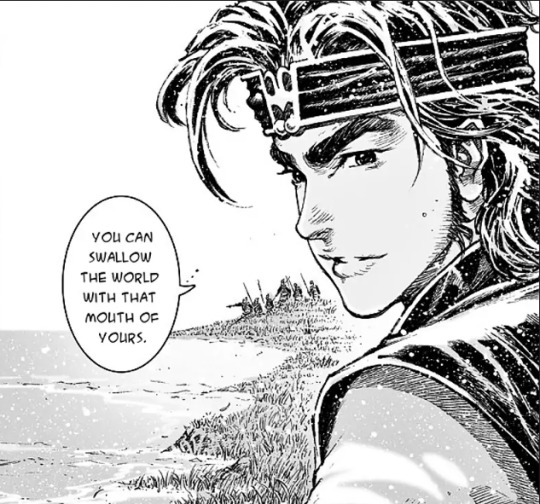
In short, 8th thinks that everyone could have their own things to find value in, but Liu Bei wants to create one general “shelter” that everyone will find value and solution in (and our boy Huo got both)
What makes the feud between 8th and the Shu compelling could be summarized in two features
1) When Cao camp is full of elite soldiers who were trained for what they are doing and Sun clan is fully family oriented and thus chains the family members, Liu camp is full of opportunistic individuals that choose their path on their own. On face value, 8th should be quite fond of them, but divergence comes when the said individuals view someone else’s path as something grand and enslave themselves, forgetting to why even they want a better world and are sacrificing themselves just for someone else. Despite that, they still remain as somewhat respectable in the 8th’s eyes.
2) The inherent duality of men, as both of these approaches find their justification within the human nature and, at the same time, it also serves as a counter-argument to each other – in times of order, people are going to seek disorder and in times of disorder, people are going to seek disorder, hence comes the pivotal point in the dynamic between 8th and 7th – If one wants to make use of human’s longing for peace through crafting the fake cult of personality, which will achieve stalemate and turn into status quo, another one wants to make use of human’s craving for desire through the dispersion of their delusions of grandeur first, by which people would lose interest in waging meaningless wars over meaningless lands and reputations.
After all, “winner takes all” is but a surface level aspect of how Ravages of Time deals with its roots - Poetic tragedies, with proper emotional baggage to convey the horrors of war and an exploration of the inevitability of history and the meaninglessness of our struggles when confronted with it.
Of course, we are not finished here, because aside from Shu, 8th has enough potential to foil Sima clan as well.
Let us start with Sima Yi himself. I'd argue both are exceptional men from powerful clans destroyed by forces beyond their control. Sima Yi being set up by Pang Tong and Sima's destruction changing him irreparably into a darker man. Like Hamlet the main driving force of the story is his revenge and just like Hamlet his actions unknowingly cause a similar tragedy to his own occurring. Sima Yis actions destroyed the Zhao Clam just like Pang Tong eventually destroyed the Sima as a scapegoat. Both attempt to gain revenge and return their clan to greatness. Yet while Sima Yi joins a future kingdom the eight opposes one and fails with his oath brother being forfeit. The irony being that Sima Yis entire life changed by one tragedy yet he doomed another man like him to the same fate unwittingly at the very start of the series.
One was Zhao Yuns best friend while the other is arguably his most dangerous enemy now.
I think there's a surprising amount of similarities and parallels between the two even this early.
Oh, and both killed a woman Zhao Yun loved. Sima Yi by inaction and the eight in a moment of direct revenge.
I'm perhaps not articulating this the best but the aptest dramatic comparison I can think of is he's the Leartes to Sima Yis Hamlet. Whether they will end up having the same conclusion as those two characters is up in the air though.
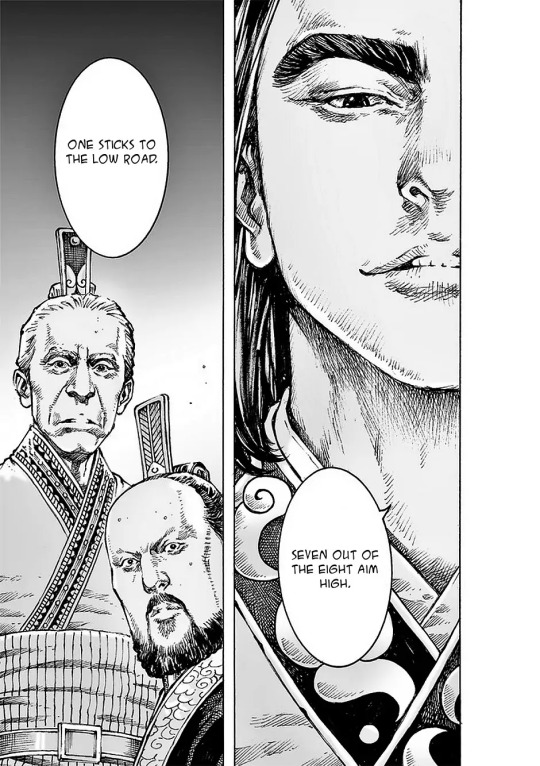
And meanwhile, 8th was concluding his not-so-grand spectacle, another member of Sima clan was introduced in the story – Sima Min, who is also an eighth member, rather polite and even was detached from other seven for quite a while and are considering as some kind of anomalies. After a line “seven out of the eighth aim high. One sticks to the low road”, even comes a hat of the 8th, whom we, in fact, described as someone who stands out by sticking to the low road. If I were to speculate, Min is going to be the one defending his own brothers, but 8th is going to be the one attacking his own brothers.
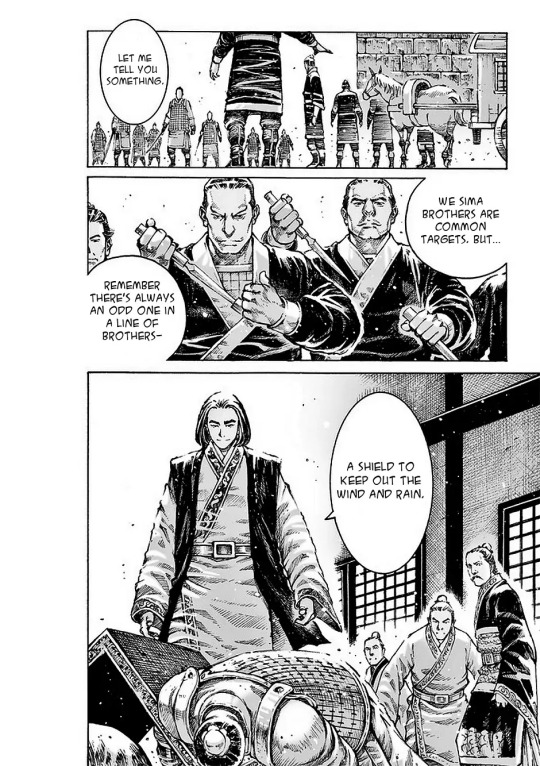
Both of them also serve as the premises for the next arc, even if they are not participated much in it, as of now: “Breaking the tradition” and the lies behind the books about warfare.
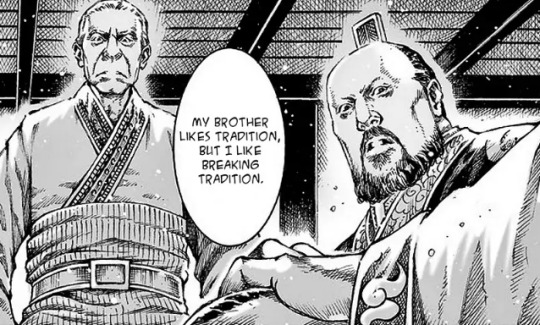
Now let’s come back to the long-postponed theory-crafting of mine.
-In the 468th chapter was revealed a dungeon that was used for torturing people. It belonged to the 8th who was gathering information about the routes of Shu. Then in 483 was revealed that Zhuge Liang had the exact same dungeon.
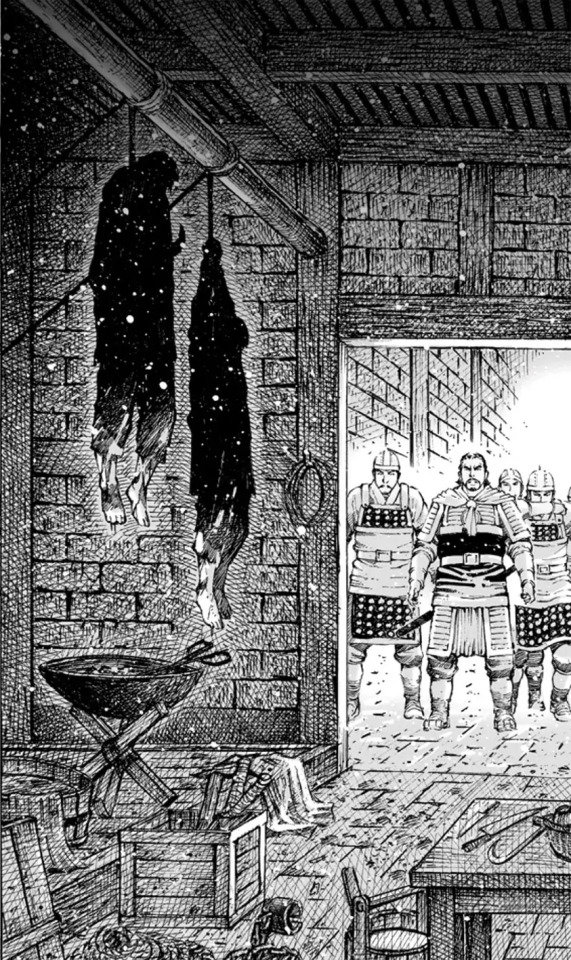
-In the 480th chapter on the other hand was revealed that Zhang Song was brought a fake map and thus Zhuge, who thought that Song was aiding Cao Cao, set a trap for him. There was someone special near Liu Zhang who was manipulating the information as if Liu Zhang was incompetent. That was a trap for Shu.
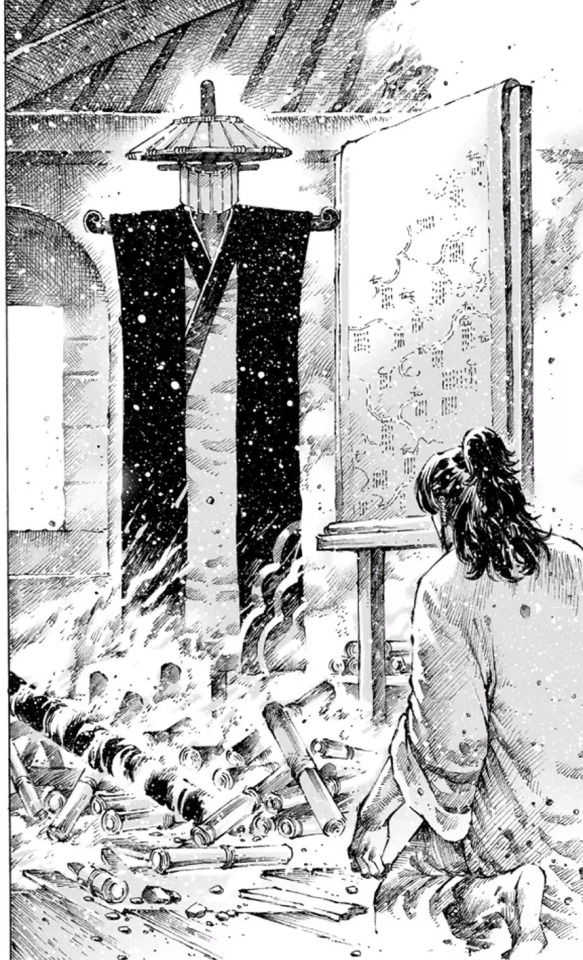
-Now in 483th Zhuge started a discussion about Zhang Song and 8th at the same time. After all, in the 468th chapter was also found a map, which was most likely made by the 8th. Key point was, that both of them were made in the same style, thus were made by the same person. The difference was, that the map made for Shu was fake, and the map made for 8th – was legitimate.
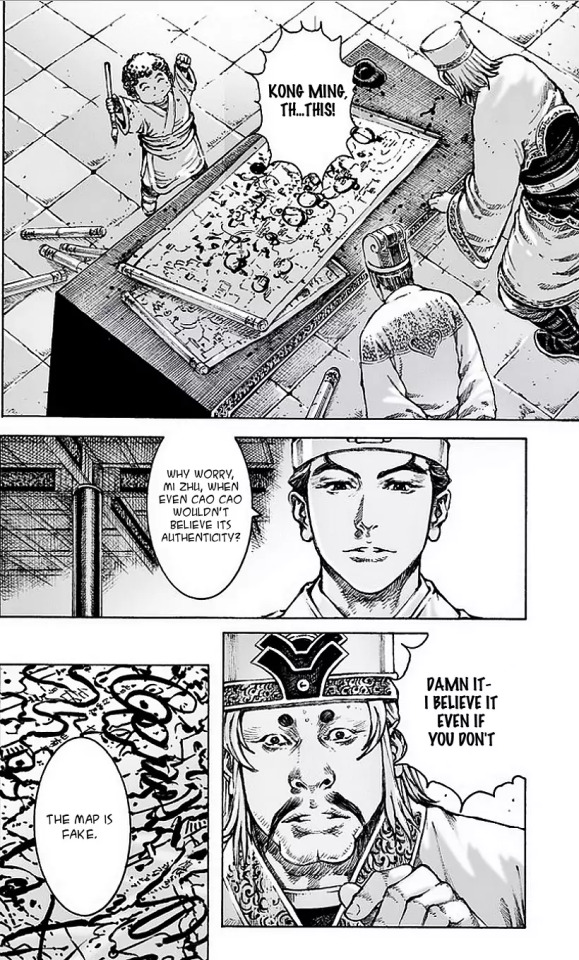
-At the start of the 483 chapter, Zhuge mentions how hard it is to track 8th and unless he announces his name, no one will know and yet, as a result of what was mentioned above, Zhuge deduced that 8th indeed graduated. Meaning, he has actively participated in the ravages of time already.
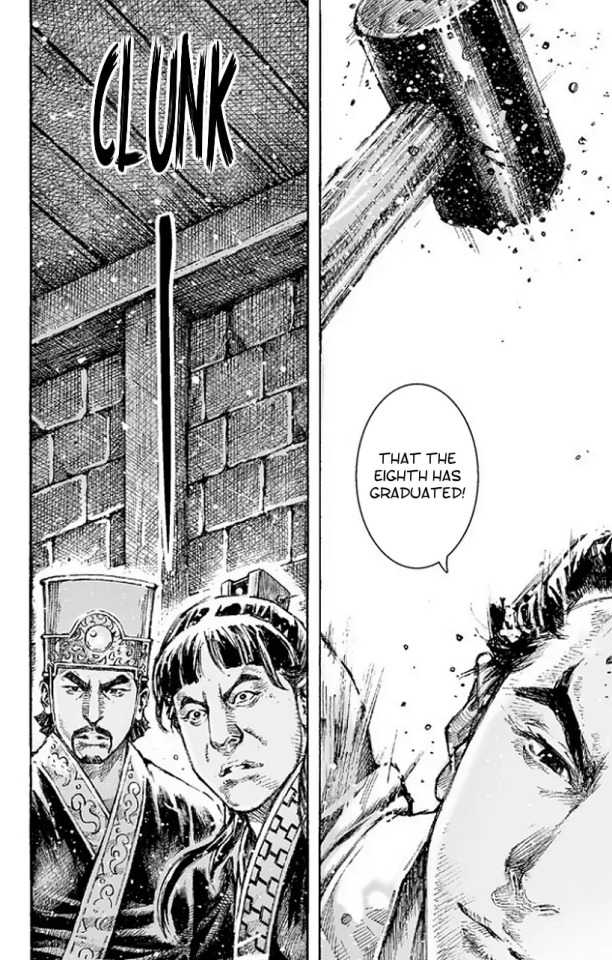
-In 483 Zhuge also did deduce that this man was merely “named” as Zhang Song. Meaning, his actual name is different. Now, how did 8th managed to convince him to not reveal that even after the torture session is a mystery. I can only think of “eccentric magic” (which I think is exactly what 8th needs for his plans, but it is also something that he wants the least) or heavy psychological pressure (considering that one guy with the damaged psyche in his chamber, chapter 468)
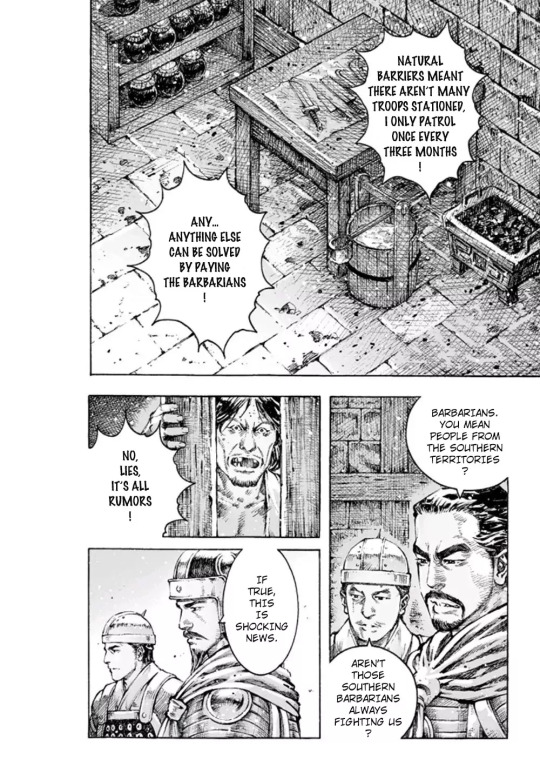
-Even more interesting came into the play after several chapters. It was revealed that there is another Zhang Song, who was aiding Ma Chao (who was also getting help from the Sun clan) and whose face was not revealed suspiciously. Why would there be several people with the same name? That’s rather CLOUDED (excuse the pun). One thing is certain, 8th is behind Song tricks, whether he is the one using that name, is actually named that or is cooperating with original Zhang Song – is another mystery. Zhuge did ruin his plans AGAIN (was it the third time?), but he still is cultivating his influence.
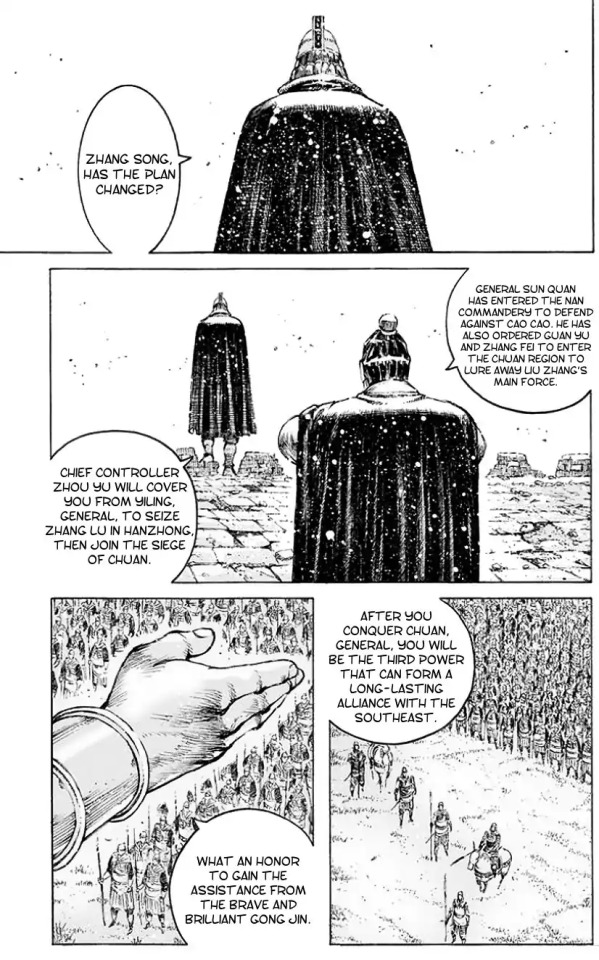
To conclude the analysis, let’s get back to the titular topic with a little hierarchy.
On the first level, there are stories with a black and white morality. Usually, black side is cartoony cynical, with no redeeming qualities and white side is cartoony idealistic, with irrelevant flaws (being hot-blooded and etc) – and the Ravages of Time even features such “stories” in deceptive schemes and labels them as “propaganda” (social commentary)
These “black” sides sometimes tend to be “justified” as if they were realistic (for example, for some reason, it is ok to have such characters if the setting is in the middle ages). Such explanations completely ignore the fact that no fiction is realistic and that every “realistic” being has redeeming qualities.
On the second level, there are stories with seemingly grey morality, through the presentation we do not actually see this moral ambiguity, so the presentation falls apart just because the characters’ words (what is talked) and actions (what is shown) contradict each other so much, that story does not seem self-aware anymore – a prime example would be a good guy, who wants to achieve a stalemate, but his actions tell otherwise and no one is actually calling him out on that hypocrisy. Also, everyone he faces is clearly inferior to him from a moral stand-point.
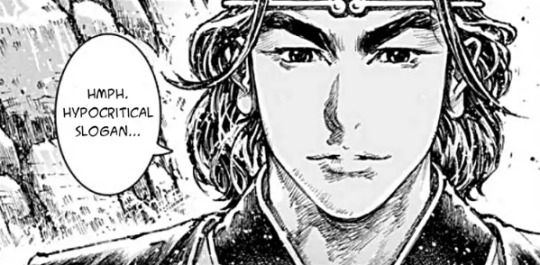
In such stories “black” sides may even have characters that were abused and victimized in childhood and now they are apparently pointing out the flaws in the system by blatantly indulging themselves in atrocities (for some reason). This is not only a cheap emotional manipulation but completely superficial and immature, as they are whining about the system by being worse than it and do not offer any solution to fix the system or a better alternative – they are merely amazed by the fact, that the world is imperfect and cannot accept it.
On the third level, there are stories with seemingly grey morality, but now they are doing the opposite. Characters constantly talk about the loss of humanity for the greater good, but they never commit to it and even if they were to do some questionable things (that most likely are glorified), they would still whine how bad the “greater good” is, despite not finding (or even trying to find) any better alternative. Here lies a huge contradiction in the presentation – It is preachy propaganda of “necessary evil” and, at the same time, does not want to acknowledge it, thus the story has a hypocritical point.
In such stories, “black” sides tend to be THE flaws of the system, with no redeeming qualities. They will be one-dimensionally incompetent and just abuse their power just for the main characters to have an excuse to commit “necessary evil”. In such cases, people tend to close their eyes on them being one-dimensional “as soon as they fir the narrative”. Such readers/watchers forget why it’s relevant for characters to not be one-dimensional – it is not realistic, considering you can be a flaw in a system and still have positive dynamics to something/someone else. It also lacks artistry, considering how crystal clear will the stance of the author is going to be by implementing such cartoony characters in his story. So… if the writing is so implausible… how are we supposed to trust the author on his beliefs and preferences, if he can’t implement said beliefs and preferences in an organic way even in his own world?
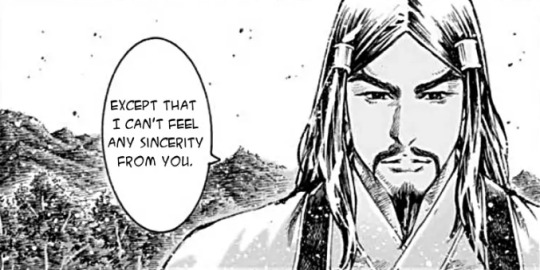
On the fourth level, there are stories with actual grey morality, where every character AND organization has its pros and cons properly presented. Without further complications, focuses on two sides of the conflicting ideas and naturally tells a realistic story, full of plausibility (Eureka Seven and Terra E, as examples)
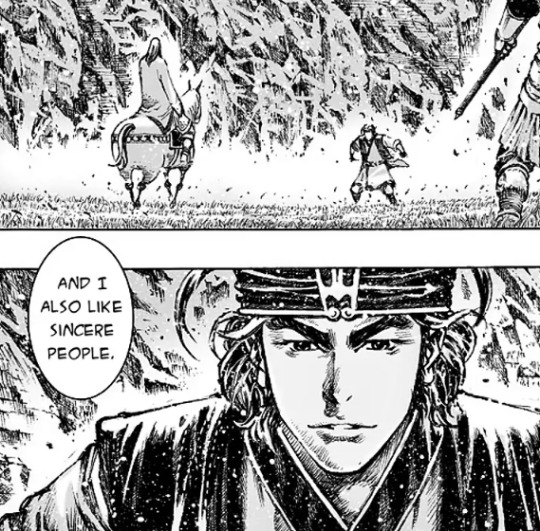
On the fifth level, there is the Ravages of Time, conceptually exploring said contradictions. It not only has more than two sides with full of characters with their own agendas, but they all are making use of various “contradictions” and that is something I wanted to highlight through the Eighth Genius, who is full of contradictions externally, but fully self-aware internally.
Now it is not outright said that contradictions are bad. Quite the opposite – even if they are full of shortcomings, they are also full of benefits and if everything can be used your and someone else’s good, why would contradictions prove the exception? After all, if any effort is futile and doomed, what it all meant to you and how content you were at your death’s bed is all that matters. Which is another contradiction, because on face value, there is no objective reason to do anything if everything’s meaningless, but at the end of the day, you at least accumulated the experience for the future generation, who will also have to postpone the passive decay of the world (but the said shared experience will lead to even more bloodfest, which is unfortunately inevitable in any case)
Failure of self-loathing stories is not seeing beyond the fixed framework. Ravages’ point, on the other hand, is that – contradiction, like anything else (for instance, loyalty), is simply a method and it was set as a framework to fit someone else’s agenda. Of course, merely trying to step out of a framework is not enough, as you are going to meet others who already did that. That’s exactly what’s so alluring about this piece of art – it not only examines a single contradiction with a hopeful solution (Self-loathing Zhuge not raising Liu Shan as a hypocrite), but offers plenty of other alternatives.
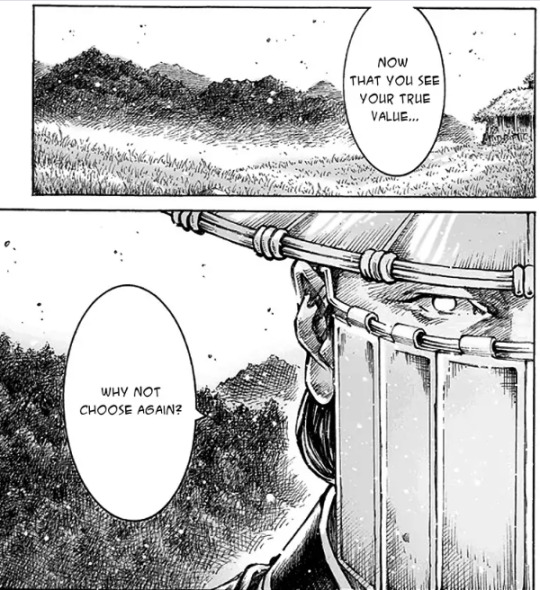
12 notes
·
View notes